$3m Legacy Debt: Fidelity Bank Refutes Bankruptcy Claims, Seeks Clarification on Court Judgment



Tijani says investment in digital economy grew ninefold in Q1 2024 Edun: Capital market strategic in drive for $1tn economy Bagudu to World Bank: Nigeria’s economic reforms on track
Deji Elumoye, Ndubuisi Francis and James Emejo in Abuja
The Minister of Communications, Innovation, and Digital Economy, Dr. Bosun Tijani, has disclosed that the rollout of the N3.3 trillion 90,000 kilometres of fibre lines, 7,000 Telecom Towers infrastructure nationwide will formally commence in Q4 2025. Besides, he stated that the sector witnessed massive growth under President Bola Tinubu, attracting $191 million in Foreign Direct Investment (FDI) in Q1 2024—a ninefold increase from $22 million in Q1 2023. This was as the Minister of Finance and Coordinating Minister of the Economy, Mr. Wale Edun, underscored the strategic role of the capital market in driving the federal government’s vision of a $1 trillion economy by 2030. Likewise, the Minister of Budget and Economic Planning, Senator Abubakar Bagudu, yesterday said the country’s economic reforms embarked upon by Tinubu’s administration
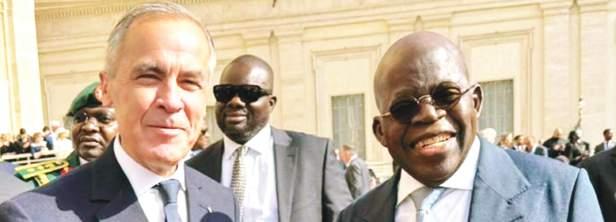



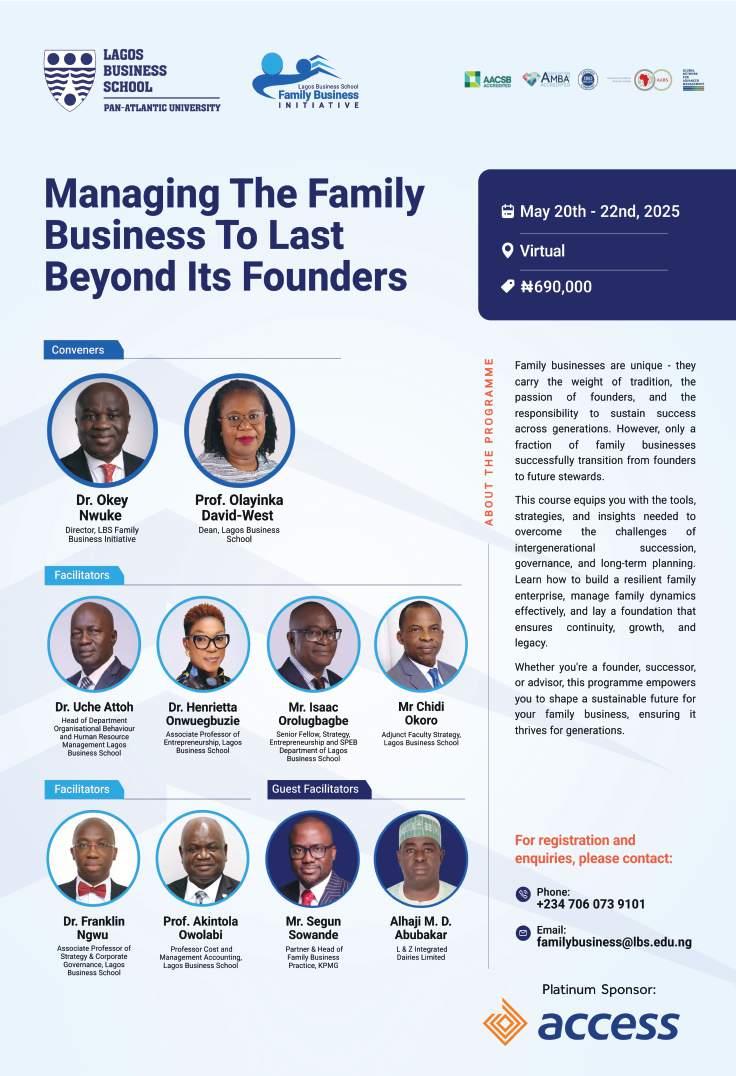
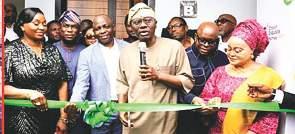
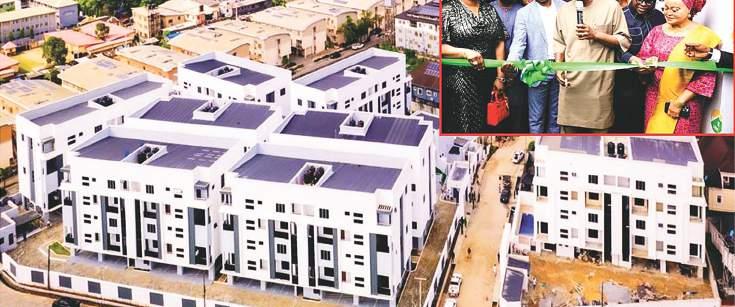
Aerial view of the LBIC/Crown Exquisite Homes at Iponri, Surulere, officially inaugurated by Lagos State Governor, Mr Babajide Sanwo-Olu. Inset (L-R): Chairman, Crown Exquisite Homes, Mrs. Adebukola Okusaga; Deputy Governor of Lagos State, Dr. Obafemi Hamzat; Managing Director/CEO, Lagos Building Investment Company (LBIC) Plc, Mr. Olusola Faleye; Governor Babajide Sanwo-Olu; Board Chairman, LBIC, Mr. Hakeem Ogunniran; and the Secretary to the State Government, Barr ‘Bimbola Salu-Hundeyin, during the inauguration, yesterday
Says national oil company needs new projects to ensure longevity Highlights NNPC’s high operating cost as key challenge Acknowledges Nigeria’s enormous deepwater oil potential
Emmanuel Addeh in Abuja
Wood McKenzie, a global provider of data and analytics solutions for the energy and natural resources sectors, has stated that with a lot of sub-commercial assets portfolio operated by the Nigerian National Petroleum Company Limited (NNPC), oil and gas production could be halved by the late 2030s.
This was extracted from Woodmac’s review of the status of the company after the exit of its erstwhile Group Chief Executive Officer, Mele Kyari, by a team of experts from the company, including its Research Director, Upstream, Ian Thom; Director, Corporate Research, Neivan Boroujerdi and Head of West Africa Upstream Content, Sub-Saharan Africa Oil & Gas, Mansur Mohammed.
In a podcast themed: “A New Era for NNPC and Nigeria’s Upstream Oil & Gas Sector”, Woodmac said its analysis was based on the deployment of its new upstream benchmarking tool, which provides ‘customisable views’ of key operational and financial metrics.
It stated that the review was against the backdrop of the recent ambitious targets set for the NNPC board by President Bola Tinubu to achieve by 2030, including attracting $60 billion investment to the sector, raising oil
output to 3 million barrels daily, gas to 10 BCF per day and 500,000 barrels per day of NNPC refining capacity.
“What’s unique to NNPC is (that) unlike a lot of the other National Oil Companies (NOCs) within our corporate universe and around the world, most of its production and its assets are non-operated.
“So it’s got big ambitions to grow its business, to grow the Nigerian upstream sector, but a lot of that will be reliant on a lot of other IOCs around the world, indigenous producers, where assets will have to compete for capital within a wider portfolio.
“And if we look at production in a little bit more detail, we can see that it is growing production in the short term. That’s set to peak in 2026. But clearly there are challenges in the longer term. As we move further out towards the late 2030s, production could be half of what it is today.
“So there is a lack of longevity in the portfolio. It needs more projects in the pipeline. And if we look at the reserve base, what you see is that NNPC has a huge amount of resources within its portfolio, but most of that resource is still sub-commercial,” the global research and consultancy firm stated.
On what the NNPC can do to recover some of its resources, Woodmac noted that whatever the company does will likely be hobbled by challenges
in terms of commercialising gas, infrastructure constraints and inability to monetise its resources.
In comparison with some African and Asian NOCs of similar size, in terms of absolute production, Woodmac said that a firm like Algeria’s Sonatrac is one NOC that has production growing in the short to medium term, with both companies domestically focused, and with advantaged resources.
As for Malaysia’s Petronas, it stated that the company has been growing and maintaining production at current levels, having done that through internationalisation and moving into areas like LNG and deep water in places like Suriname, Canada and Australia.
“NNPC is naturally going to be very domestically focused, at least in the short to medium term. So it has that kind of longevity challenge. Another challenge the business has is on the cost side.
“Here we’re bringing up operating costs, firstly on a sort of absolute basis, but then also on an OPEX per BOE, you see that NNPC does have a higher operating cost than a lot of its other companies that were shown in its peer group.
“And we know of some of the above-ground risks in Nigeria, loss of barrels, local content legislation, all of that adds to a higher cost base. It’s
similar to Sonangol (Angola). And if we’re thinking about these companies being IPO (Initial Public Offer) ready, that is something that it has to address
“That’s particularly pertinent at the moment with a lot of uncertainty around tariffs and oil prices. That sort of short-run marginal cost of production is going to become increasingly important for investors,” the Woodmac panelists said.
However, deploying its upstream lens platform, which showed Nigeria’s overall production by water depth, the organisation said the divestment of Nigeria’s oil majors away from onshore shallow water has redefined the landscape in Nigeria.
“The majors are now focused in the deep water, and that’s where we
would see their projects. Attention will now focus on indigenous companies who operate the joint ventures, mainly Oando, Renaissance, and Seplat. And financing will be the key hurdle they need to scale.
“For NNPC, it holds up to 60 per cent in these joint ventures, and they will need to find alternative financing options because the indigenous companies will unlikely continue the ‘carry arrangements’ NNPC enjoyed when the majors operated the Joint Ventures (JVs). So financing onshore will be key,” Woodmac explained.
Besides, it acknowledged the huge potential in the deep water, stressing that Final Investment Decisions (FIDs) and accelerating project development will play a major role in overall production growth.
“And this is because the deep water holds a significant scale in undeveloped resources. Bonga North took FID last year, and it is significant because it was the first deep water project to get approval since 2013,” it added. On the gas opportunities in Nigeria, the panel agreed that Nigeria has significant gas resources spread around the Niger Delta, but developing them has remained a challenge.
”But developing gas in Nigeria has always been a challenge. And we consider less than 20 per cent of the overall remaining volumes as commercial. This is largely due to limited infrastructure for processing and transporting gas from the fields to the markets.
The incident, it was gathered, occured in the early hours of yesterday, on a pipeline’s right of way operated by the company,
Wale Igbintade
PRO International Concept, a limited liability company, has filed an application at the Federal High Court in Lagos seeking to commit several bank managing directors to prison for contempt of court. The respondents named in the suit included Mr. Moruf Abiola Oseni, Managing Director of Wema Bank Plc; Mr. Babatunde Olofin, Managing Director of Moniepoint Microfinance Bank; Mr. Musty Mustapha, Managing Director of Kuda Microfinance Bank; and Mr. Henry Obiekea, Managing Director of Fairmoney
Microfinance Bank.
Others are Mr. Chika Nwosu, Managing Director of Palmpay Limited, and Mr. Daudu Gotring Wuritka, Managing Director of Opay Digital Services Limited.
The company alleged that the individuals willfully disobeyed court orders issued on November 21, 2024, in connection with a fraud case involving the unauthorised withdrawal of N95 million from its bank account.
PRO International Concept is urging the court to compel the respondents to appear and show cause why they should not be jailed
for defying the court’s orders.
In an affidavit deposed to by Omotayo Adebayo, litigation manager at the law firm representing the company, stated that the company’s operational bank account was hacked on September 5, 2024.
The breach allegedly led to the fraudulent transfer of N95 million, which was subsequently split and moved across multiple accounts in nine banks.
The company immediately alerted the relevant bank officers, who then sent “Block and Recall” requests to the fraud desks of 28 financial institutions.
While the funds were temporarily frozen, the institutions required a court order to maintain the freeze beyond 72 hours.
On September 9, 2024, PRO International Concept secured a court order from a district court in Nasarawa State to extend the freeze.
The current suit was subsequently filed at the Federal High Court.
On November 21, 2024, the Federal High Court ordered that the frozen funds be reversed to the company’s account and directed further investigations, including the placement of liens on the respondents’ accounts.
which now operates the assets formerly owned by Shell Petroleum Development Company (SPDC)
An environmental group, the Youths and Environmental Advocacy Centre (YEAC-Nigeria) set the alarm, stressing that its volunteers in the area noticed and reported the incident on Monday, May 19, 2025.
The Executive Director, YEACNigeria, Dumnamene Fyneface, told journalists in Port Harcourt that the volunteers observed that the incident was allegedly caused by third-party interference.
He said: “The volunteers reported the latest crude oil spill to the Advocacy Centre, alleging that the spillage is caused by third-party interference, pending confirmation by the National Oil Spill Detection and Response Agency (NOSDRA) through a comprehensive joint investigation team’s visit to the spill site in Oshika community”.
The Advocacy Centre however called on NOSDRA to carry out a timely joint investigation visit to the site and invoke relevant sections of the Petroleum Industry Act (PIA), 2021, to hold those responsible ac-
countable and ensure the operator clamps the spill point to mitigate the impact of the crude oil spill on the flora and fauna in the affected area.
Meanwhile, the spokesperson of Renaissance, Michael Adande, who confirmed the incident to THISDAY, said: “The Renaissance Africa Energy Company Limited confirms a report today (Monday, May 19, 2025) of an illegal connection which has resulted in a spill incident from the 14-inch Okordia-Rumuekpe Pipeline at Oshika in Rivers State, within the right of way of the pipeline”. Adande disclosed that immediate steps are being taken to isolate and discontinue production into the pipeline to minimise any potential environmental impact.
He also revealed that the company “has informed government regulators, and are coordinating the statutory joint investigation visit, which will be led by their representatives and include representatives from the local community for purposes of determining the cause and impact of the incident”.
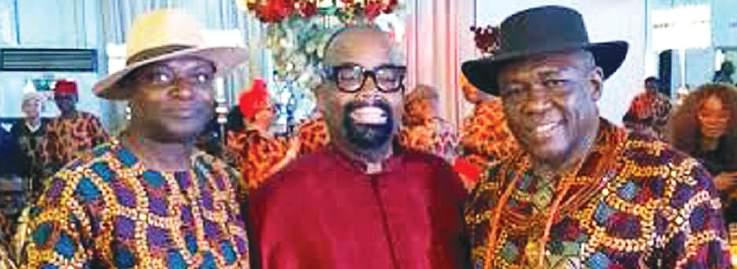
Sunday Okobi
The Islamic Development Bank (IsDB) has approved over US$1.32 billion in development financing to drive inclusive growth, climate resilience, and economic opportunity
among its Member Countries. The approvals took place during the 360th Meeting of the IsDB Board of Executive Directors held in Algiers during the 2025 IsDB Annual Meetings. At the meeting chaired by
His Excellency Dr. Muhammad Al Jasser, president of IsDB, the Board’s decisions covered a wide range of impactful projects spanning health, infrastructure, food security, vocational training, and access to water.
Massed noted that together, these initiatives reflect the IsDB’s commitment to accelerating the Sustainable Development Goals (SDGs) and supporting Member Countries as they address overlapping development challenges.
Wale Igbintade
The trial of former Managing Director of the Asset Management Corporation of Nigeria (AMCON), Mr. Ahmed Kuru, over alleged fraud involving Arik Air was stalled yesterday due to the absence of his counsel, Mr. Olasupo Shasore (SAN).
Kuru and four others are facing charges in connection with an alleged N76 billion and $31.5 million fraud.
Other defendants in the case include Kamilu Omokide, former Receiver Manager of Arik Air; Capt. Roy Ilegbodu, the airline’s Chief Executive Officer; Union Bank; and Super Bravo Ltd.
They are being prosecuted on a five-count charge bordering on theft, abuse of office, and dishonest conversion of property.
Union Bank faces an additional charge of making false statements to a public officer.
At Monday’s proceedings, Dr. Wahab Shittu appeared for the prosecution.
Prof. Taiwo Osipitan represented the first and third defendants, Tochukwu Amaefule represented the second defendant, Oluwaferanmi Rotimi appeared for the fourth defendant, and Chukudi Nwandike represented the fifth defendant.
Shittu, counsel to the Economic and Financial Crimes Commission (EFCC), informed the court that a witness was present and the matter was scheduled for further cross-examination.
However, Mr. Tochukwu Amaefule, who held brief for Shasore, requested an adjournment, citing a letter dated May 13.
He informed the court that Shasore was out of the country receiving medical treatment. Shittu confirmed that Shasore had personally called to explain his health
situation.
He said: “While I appreciate his courtesy and wish him a speedy recovery, I must point out that his call is more a matter of courtesy than one of justice.
“The court will recall that the second defendant previously delayed arraignment until a bench warrant was issued. I am concerned as to why a junior lawyer from the learned Silk’s chambers cannot proceed with the matter.
“This is a case of national and international importance concerning the aviation sector. While Mr. Shasore is entitled to seek medical care, this matter also deserves to proceed without delay.”
In response, Prof. Osipitan, counsel to the first and third defendants, stated that his clients were ready for trial and eager to defend themselves against the allegations.
He urged the court to fix multiple
Lagos State Governor, Mr Babajide Sanwo-Olu, has sworn in appointed chairmen and members of the Teaching Service Commission (TESCOM), Lagos State Electricity Regulatory Commission (LASERC) and the last member of the Lagos State Independent Electoral Commission (LASIEC). Sanwo-Olu urged the appointees to uphold the highest standards of transparency, integrity, and professionalism.
He also advised them to embrace technology and foster strong partnerships with communities, civil society, and the private sector to create enabling environments where teachers, voters, and consumers alike could thrive.
Members of TESCOM are Mrs. Mopelola Peregrino (Chairman); Mrs. Kafayat Ajenifuja (Commissioner I); Mr. Abiodun Bamgboye (Commissioner II); Hon. Segun
Agbaje (Commissioner III) and Mrs. Abimbola Idowu (Commissioner IV), while Prince Adewale Ojora was sworn in as Member of LASIEC.
The Chairman and Members of LASERC are Engr. Abimbola Odubiyi (Chairman/Non-Executive Member); Mr. Tunde Gbajumo (Non-Executive Member); Dr. Fouad Animasahun (Executive Member/CEO); Barr. Kofoworola Olokun-Olawoyin (Executive Member); and Engr. Oluwaseun Fadare (Executive Member).
Speaking during the swearing-in ceremony held at Lagos House, Ikeja, Sanwo-Olu said his administration remainedfully committed to supporting and providing the necessary resources and backing to help the appointees deliver on their mandates effectively.
The governor said each of the commissions played an indispensable role in advancing Lagos State’s
THEMES+ agenda, which focused on innovation, good governance, and inclusive growth.
Sanwo-Olu said the establishment of LASERC marked a historic milestone in Lagos State’s energy sector.
“Following the Lagos Electricity Bill 2024 and the formal transfer of regulatory oversight from the Nigerian Electricity Regulatory Commission (NERC) to LASERC, Lagos, has become one of the few states in Nigeria with full regulatory control over its intrastate electricity market.
“LASERC’s mandate is to ensure an affordable, reliable, and sustainable electricity supply tailored to Lagos’s unique needs. This includes regulating tariffs, enforcing technical standards, promoting renewable energy integration, combating electricity theft, and driving electrification of underserved communities.
dates to ensure a speedy hearing.
Justice Mojisola Dada subsequently adjourned the matter to May 28, June 4, June 30, July 1, and July 2, 2025, for continuation of trial.
According to the EFCC, Union Bank allegedly made false statements to AMCON in 2011 regarding Arik Air’s performing loans, which led to the unjustified sale of the loans and bank guarantees.
The bank is accused of subsequently transferring N71 billion to AMCON.
The EFCC further alleged that in 2022, Kuru, Omokide, and Ilegbodu were involved in the diversion of N4.9 billion to NG Eagle Ltd.
It also claimed that Ilegbodu converted N22.5 million for the benefit of one Magashi Ali Mohammed, funds purportedly belonging to Arik Air.
Additionally, the defendants are accused of unlawfully authorizing the teardown and destruction of aircraft 5N-JEA (Serial No. 15058), valued at $31.5 million, an act the EFCC claims was arbitrary and detrimental to both Nigeria’s economic stability and that of Arik Air Ltd.
The alleged offences violate Sections 73, 96, 278(1), and 278(6) of the Criminal Law of Lagos State, 2015.
According to him, “The approval of these strategic projects reaffirms IsDB’s unwavering commitment to financing transformative, highimpact initiatives that advance socio-economic development.
“From strengthening flood resilience and expanding healthcare access to enhancing food security and equipping youth with critical skills, this financing will drive tangible progress towards the Sustainable Development Goals (SDGs) and address the evolving priorities of our Member Countries.”
He stated further that among the most significant approvals was the US$632.16million Climate-Resilient Flood Protection Dams Project in Oman, designed to mitigate climate risks and safeguard over 670,000 people through the construction of large-scale flood infrastructure, adding that this transformative investment will also improve groundwater recharge, support agriculture, and reduce the economic losses caused by extreme weather events.
Other infrastructure approved included the EUR 212.35 million Douala–Bafoussam Road Rehabilitation Project in Cameroon, “which will reduce travel time and improve road safety on a key regional corridor, and the EUR 187.83 million PRISE project in Burkina Faso, which will revitalize 302.8 km of road and 61 km of railway to enhance regional connectivity with Mali, Niger, Ghana, and Côte d’Ivoire.
“Health remained a central pillar of the Board’s agenda. The US$75.08 million project in Suriname will strengthen the national health system and reduce mortality from noncommunicable diseases.
“Meanwhile, the US$26.10 million Establishment of a National Oncology Center in Djiboutiwill offer the country’s first dedicated cancer facility, ensuring early diagnosis and access to treatment. The project is co-financed by the Islamic Solidarity Fund for Development (ISFD) and also includes a US$400,000 Reverse Linkage Grant from IsDB to support technical cooperation with Morocco in oncology service design, training, and delivery.”
In Togo, the president said IsDB approved two impactful interventions: a US$2 million project to strengthen the national eyecare system and a EUR 23.12 million water supply project that will provide clean drinking water to over 6,000 households in Kara region.
Human capital development featured prominently, with the Board endorsing the EUR 36.39 million Enhancing Vocational Training and Youth Employability Project in Mauritania, which will upgrade training centres and equip young men and women with market-relevant skills.
“In Côte d’Ivoire, the EUR 104.20 million Rice Value Chain Development Project will reduce rice import dependency and increase farmer incomes—particularly for women and youths.
“Also, in The Gambia, the IsDB approved US$3 million in supplementary financing to further strengthen value addition in the groundnut sector and enhance rural livelihoods.
These approvals demonstrate IsDB’s role as a catalyst for sustainable progress bridging vision and action across the Global South,” he added.
The National President of the Nigerian Association of Chambers of Commerce, Industry, Mines and Agriculture (NACCIMA), Dele Oye Esq., is set to deliver the keynote address at the 3rd International B2B Conference organised by the German Chamber of Commerce and Industry (DIHK).
Themed, “The World Meets in Giessen,” the conference slated for May 20 to 22, 2025, will serve as a vital platform for Nigerian businesses to connect with their international counterparts, explore global business opportunities, and forge mutually beneficial partnerships.
Oye, who is also the Chairman
of the Organised Private Sector in Nigeria (OPSN), will join other experts and global business leaders to share insights on the panel discussion, ‘the key emerging branches in African States.”
With a deep understanding of Africa’s economic environment and the dynamics of global trade, the NACCIMA president is expected to share insightful perspectives on the continent’s evolving business landscape and Nigeria’s pivotal role in shaping its future.
Oye is a distinguished lawyer and business leader. A 1988 graduate of Obafemi Awolowo University, he was called to the Nigerian Bar in
1989. He is the founder and partner at Dele Oye & Associates Law Firm, and a partner at Consolidated Legal Practice. Beyond law, he is a successful entrepreneur with board memberships and ownership interests in various conglomerates spanning the real estate, oil and gas, and other sectors in Nigeria. Other panelists expected at the conference include Lai Mohammed, former Minister of Information and National Orientation, Ambassador Yakubu Audu Dadu of the Nigerian Consulate, Ambassador Azize Diabate of the Republic of Cote’d’Ivore, Ambassador Stella Mokaya of the Republic of Kenya, amongst others.













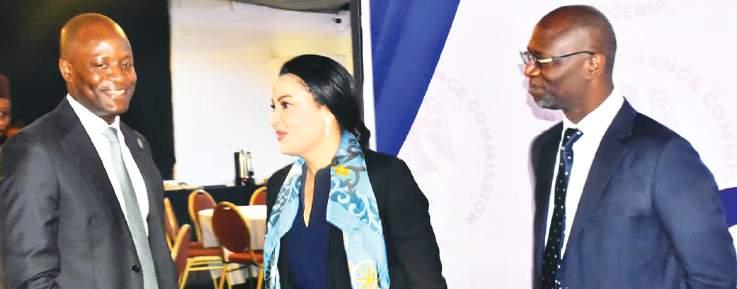
General, Securities and Exchange Commission (SEC),
Emomotimi
Dr. Doris Uzoka-Anite; and Executive Commissioner, Operations, SEC, Mr. Bola Ajomale, during the First Quarter Capital Market Committee Meeting in Lagos, yesterday
Peter Uzoho in Lagos and Blessing Ibunge in Port Harcourt
Worried by continuous delays and frequent timeline misses on the completion of the ongoing rehabilitation of the three national refineries, namely the new Port Harcourt refinery, and the Warri and Kaduna refineries, the Petroleum Products Retail Outlets Owners Association of Nigeria (PETROAN) has urged the federal government to establish timeliness on the project.
The association, which expressed concerns over the persistent delays in the completion of the projects by the Nigerian National Petroleum Company Limited (NNPC) and its contractors, called on President Bola Tinubu to intervene and set up a high-level facilitating panel.
PETROAN made the call yesterday in a statement signed by its National Public Relations Officer, Dr. Joseph Obele.
The group said that despite numerous assurances from the NNPC and its officials, the projects have suffered repeated setbacks, with completion deadlines being missed multiple times.
While the group acknowledged and applauded the commencement of the Old Port Harcourt refinery with the capacity of 60,000 barrels per day, it stressed the urgent need for commissioning, transparency, and accountability of the second Port Harcourt Refinery with the capacity of 210,000 barrels per day, the Warri refinery and the Kaduna Refinery.
PETROAN therefore demanded that the NNPC provide a specific and realistic timeline for the completion and commissioning of the refineries, especially the second Port Harcourt Refinery rehabilitation project.
The association argued that when completed, the second Port Harcourt refinery would serve the whole of system 2E, comprising about 13 states, adding that this will reduce the cost of logistics/transportation of petroleum products from Lagos to the system 2E areas.
It said the current cost of transportation was highly exorbitant and affects the affordability of petroleum products in System 2E areas, adding that Nigerians and stakeholders want to know the exact date of delivery of the revamp project.
The statement further read, “The Nigerian people deserve clarity on when they can expect the refineries to commence operations and contribute to alleviating the nation’s fuel scarcity challenges.
“We call on the relevant authorities to ensure that the NNPC adheres strictly to the contract timeline, once provided, and maintains regular communication with stakeholders on the project’s progress.
“Given the worrisome nature of these delays and their far-reaching implications for the nation’s economy and welfare, PETROAN calls on President Bola Tinubu to intervene by setting up a high-level facilitating panel.”
To identify bottlenecks, provide solutions, and ensure the project’s
timely completion, the Billy Grillis Harry-led body also suggested that the panel should comprise relevant stakeholders, including representatives from the Nigerian Midstream and Downstream Petroleum Regulatory Authority (NMDPRA), Nigerian Upstream Petroleum Regulatory Commission (NUPRC), NNPC, Nigeria Union of Petroleum and Natural Gas Workers (NUPENG) and Petroleum and Natural Gas Senior Staff Association of Nigeria (PENGASSAN).
Others suggested included the Major Energies Marketers Association of Nigeria (MEMAN), Depot and Petroleum Products Marketers Association of Nigeria (DAPPMAN),
PETROAN, and other industry experts.
According to the statement, the National President of PETROAN, Harry, stated in Abuja while addressing newsmen that the commencement of operations at the 210,000 barrels per day capacity refinery at Alesa Eleme, the 125,000 barrels Warri refinery, and the 110,000 barrels per day Kaduna Refinery will improve Nigeria’s petroleum sufficiency and positively impact price stability.
However, he lamented that the project was running behind schedule.
“The continuous delay in the completion of the Port Harcourt Refinery rehabilitation project and other refinery projects is unac-
ceptable, and Nigerians deserve to know when the projects will be completed. The huge amount borrowed for the projects should be a serious concern to all citizens, and we will demand accountability for every naira spent on this project,” the PETROAN president stated.
PETROAN commended Tinubu for appointing Bayo Ojulari as the Group Chief Executive Officer of NNPC, describing him as a round peg in a round hole.
The association called on the GCEO to see this glorious appointment as a call to national duty and put in his best to save the industry.
PETROAN noted that the current vacancy in the office of the Managing
Director of the Port Harcourt Refinery could be a significant barrier to the project’s progress.
It recommended that the Group Chief Executive Officer of NNPC should appoint a substantive managing director for the Port Harcourt Refinery in the shortest possible time.
“This appointment would provide the necessary leadership and direction to drive the project forward and ensure its timely completion.
“The prolonged delay in the refinery’s completion not only undermines the nation’s efforts to achieve self-sufficiency in petroleum products but also exacerbates the economic hardship millions of Nigerians face.
Alex Enumah in Abuja
The Senator representing Kogi Central at the National Assembly, Senator Natasha Akpoti-Uduaghan, has filed a fresh petition against the Senate President, Godswill Akpabio.
The petition dated May 15, was addressed separately to both the Attorney-General of the Federation (AGF) and the Inspector General (IG) of Police.
Also mentioned in the petition was one Sandra Duru, accused of
Chuks Okocha in Abuja
The Human Rights Writers Association of Nigeria (HURIWA) has condemned the refusal of the Minister of State for Petroleum Resources (Gas), Hon. Ekperikpe Ekpo, to respond to repeated Freedom of Information (FOI) requests regarding the status of a substantial sum of money earmarked for boosting electricity supply towards the end of former President Goodluck Jonathan’s administration.
In a press statement issued on Monday, HURIWA accused the current administration of silence and complicity over the unexplained disappearance of this vital fund, which was preserved on the express recommendation of former Minister of Petroleum Resources, Mrs. Diezani
Alison-Madueke. According to the national coordinator of the group, Emmanuel Onwubiko, the recommendation was made in the twilight of the Jonathan administration to prevent some cabinet members from allegedly sharing the funds meant for a critical national development project.
The rights group revealed that former Minister Diezani AlisonMadueke, in a now-public letter to the then President, date May 15, 2015, advised that the proceeds—believed to be in excess of $1 billion (NNPC/ NLNG dividend funds)—should not be tampered with, but instead preserved to revamp the power sector.
President Jonathan reportedly accepted this recommendation and instructed that the funds be kept intact for electricity infrastructure
development.
HURIWA expressed dismay that despite Diezani’s principled stand to preserve the funds for national interest—against pressure from fellow ministers—she was later maligned by the succeeding government of President Muhammadu Buhari.
Onwubiko lamented that the former minister became the subject of what it described as “unrelenting media persecution,” based largely on unsubstantiated claims and politically motivated propaganda.
“It is shameful and disturbing that the same woman who stood firm to prevent the looting of a major national fund meant for electricity supply was turned into a scapegoat and publicly humiliated with all manner of false, unsubstantiated, and malicious claims.
malicious campaign of criminal defamation, cyber-stalking, conspiracy, and attempted assassination against Akpoti-Uduaghan.
The petition which was filed on behalf of Akpoti-Uduaghan, by her lawyer, Dr Ehiogie West-Idahosa (SAN), specifically called on the police to “painstakingly investigate the contents of this Petition and ensure that justice is expeditiously dispensed to all who may be found wanting regardless of their status in the Nigerian society”.
Akpoti-Uduaghan is currently under suspension from the Senate for six months for allegedly violating the Senate Rules. The alleged violation was said to have occurred when she refused to vacate her seat following reallocation of her seat on the floor of the red chamber.
But, the Kogi senator has been claiming to be a victim of sexual harassment.
Her lawyer stated that the petition which is supported by incontrovertible evidence from public broadcasts, witness testimonies, media reports, and expert analyses, demonstrates “a deliberate retaliatory campaign by Akpabio, using proxies and resources at his disposal.
The senior lawyer claimed that a smear campaign against the female Kogi senator started shortly after her sexual harassment claim and suspension, stating.
“Our client observed a sudden surge of defamatory propaganda against her on social media and in certain press outlets,” the petition alleged.
West-Idahosa added that evidence
now shows that it was no organic backlash, but a coordinated smear campaign sponsored by Akpabio as a form of revenge.
“A key figure in this campaign is one Dr. Sandra Chidinma Duru, a Texas-based Nigerian who styles herself as “Professor (Prof.) Mgbeke” on Facebook. It is pertinent to highlight further evidence demonstrating the operational nexus between Senator Godswill Akpabio and Dr. Sandra Duru.
“As inadvertently revealed during her live broadcast of May 1, 2025, Dr. Duru’s call log displayed multiple contacts, including “My Daddy Directline,” “IGP Kayode,” “Senator Akpabio” (with at least two saved numbers), “Oby Ndukwe” (the media aide to the Senate President, who later appeared on Politics Today with Seun Okinbaloye to publicly condemn our client), and “CP Imo Aboki Danjuma” as well as “Senator Ned Nwoko”, the petition added.
He argued that the presence of these names, particularly those occupying high-level positions within Nigeria’s security architecture, strongly suggests that Akpabio and Duru were acting in concert, possibly with the support or knowledge of certain police officials.
“This revelation further strengthens our client’s position that the defamatory campaign and associated threats were not the isolated acts of a rogue individual, but the product of a coordinated effort involving Senator Akpabio and his political and security network, intended to discredit, harass, and endanger her”, he added.
Akpoti-Uduaghan accused Duru of malicious falsehoods in her May 1, broadcast, despite knowing them to be false and with the intent to harm her reputation and even put her in jeopardy of charges against the state.
“Duru falsely alleged that Senator Akpoti-Uduaghan confessed to plotting a coup against the government. She claimed our client’s real agenda was to ‘force the Senate President to step down so that they will have their way to remove what they call the Yoruba government.
“And that ‘the fight was not really about the Senate President, but about the President of the Federal Republic of Nigeria, they don’t want a Yoruba government to go beyond four years.
“In other words, Duru painted our client as part of an ethnic cabal conspiring to topple the current administration (headed by a Yoruba president). This is an utterly baseless and inflammatory accusation meant to stir public enmity and invite state persecution.
“Indeed, whistleblower Francess Olisa-Ogbonnaya, who later reviewed Duru’s source audio clips, confirmed that ‘nowhere in the clips’ did Senator Akpoti-Uduaghan say anything about ‘wanting to bring down the Yoruba government.’
“ The very notion was implausible, as Ms. Ogbonnaya noted: ‘How do you think Sen. Natasha will bring down the Yoruba government? A Kogi person is a minority… they don’t have alliances like that.
“This emphatic debunking demonstrates that Duru’s treason narrative was a complete fiction,” the petition added.
Peter Uzoho
The Dangote Petroleum Refinery & Petrochemicals has reaffirmed that despite the fluctuations in global crude oil prices, it had consistently reduced the price of Premium Motor Spirit (PMS), commonly known as petrol, and would continue to do so in the interest of Nigeria.
The company made this known in a statement issued yesterday, which was signed by its Group Chief Branding and Communications Officer, Anthony Chiejina.
The Aliko Dangote-owned refinery said the decision to maintain
price stability reflects its unwavering commitment to supporting the Nigerian economy and alleviating the burden on consumers from the increase in fuel prices by maintaining price stability.
The decision, Dangote said, underscored its dedication to providing affordable, reliable, and high-quality petroleum products without compromising operational efficiency and sustainability.
“Our approach aligns with the objectives of the Federal Government’s Nigeria First policy, which promotes the prioritisation of locally-produced goods and services.
F g : R OLLO u T OF N3.3 TN 90,000km
remained on schedule, recording significant progress.
Also, yesterday, analysts predicted a hold on monetary policy tools as the Monetary Policy Committee (MPC) of the Central Bank of Nigeria (CBN) unveils the outcome of its two-day meeting today.
Tijani made his remarks during an interview for an upcoming State House documentary to mark President Bola Tinubu’s second anniversary.
Tijani highlighted the sector’s robust workforce development, driven by the three Million Technical Talent (3MTT) programme, and revealed plans for a $2 billion initiative to deploy 90,000 kilometres of fibre optic infrastructure nationwide, starting in Q4 2025.
According to him, “These foundational reforms, coupled with advancements in artificial intelligence (AI) and the startup ecosystem, have positioned Nigeria as a global leader in the digital economy.”
Comparing FDI inflows, the statement from the Special Adviser to the President, (Information & Strategy), Bayo Onanuga said: “In Q1 2023, the sector had about $22 million; by Q1 2024, with this administration well underway, we reached $191 million. The trend continued in Q2, increasing from $25 million in 2023 to $114 million in 2024.”
The Minister stressed that the 3MTT programme, launched in October 2023, to create a tech-savvy workforce, has
growing rumours of a possible coalition among opposition leaders to unseat Tinubu in 2027.
The statement came as the Obidient Movement, an umbrella group for Obi’s loyalists, described as imaginary and fictitious speculations that Obi would be a running mate to former Vice President Atiku Abubakar in the 2027 presidential election.
Obi, who visited Bishop of the Anglican Diocese of Kubwa, in Abuja, on Monday, emphasised that he was not desperate for any position.
“The only coalition I am interested in is the one against hunger, poverty, and the bad state of healthcare and education in the country. I am not desperate for any position,” the former presidential candidate said.
Obi came third in the 2023 presidential election, with many believing that a coalition between him, Atiku, and other opposition leaders could defeat Tinubu in 2027.
The former governor of Anambra State dismissed a deal to run as a vice presidential candidate in 2027. He insisted that those saying he had an agreement to deputise anyone were playing politics of selfish ambitions detrimental to the growth of the country.
Obi, who made a financial donation to a school project in the diocese, said it was because the government failed to deliver free and qualitative basic education that the church had to bear the huge burden.
He was seen with former governor of Ekiti State, Kayode Fayemi, exchanging pleasantries with Tinubu at the inauguration Mass of Pope Leo XIV at the Vatican on Sunday.
Obi said he was not an enemy of Tinubu, stressing that he accorded necessary courtesy to him in Rome as protocol demands.
He emphasised that the only
“By refining petroleum products domestically at the world’s largest single-train refinery, we are proud to make a substantial contribution to Nigeria’s energy security, foreign exchange savings, and overall economic resilience—aligning with President Bola Tinubu’s Renewed Hope Agenda, which is focused on addressing the nation’s economic challenges and improving the wellbeing of Nigerians.
“We are immensely grateful to His Excellency, President Bola Tinubu for making this possible through the commendable Naira-for-Crude Initiative, which has enabled us to
already trained over 117,000 Nigerians in digital skills, surpassing its initial target of 30,000.
“By last year, we had already moved that to over 117,000. With an additional 35,000 in training, the programme is nearing 10 percent of its three million goal. And in the rest of the time in office, we hope to reach the three million,” he said.
Regarding connectivity, Tijani announced that Project Bridge—focused on deploying 90,000 kilometres of fibre optic cable—will commence in the fourth quarter of this year.
“We are preparing a $2 billion investment to ensure every Nigerian can access affordable, high-quality connectivity regardless of location. Increasing connectivity hubs by just 10 percent could yield a 2.5 percent GDP growth,” he said.
Tijani celebrated Nigeria’s ranking among the world’s top 60 countries for AI readiness and developing a homegrown large language model (LLM).
He also highlighted the launch of the AI Collective platform, supported by leading partners including Pierre Omidyar, Google, and Microsoft, to foster collaboration and innovation in artificial intelligence.
For the first time in the country, the ministry has funded 55 academic researchers to explore technology applications in agriculture, healthcare, and education. In addition, N300
enemy he had was corruption and corrupt leaders, who had made life difficult for the Nigerian people.
Aligning with Obi’s position, the Obidient Movement said they were aware of coalition talks with the former governor, but “Obidient Movement would like to state emphatically that there is no truth or basis to the reports whatsoever” of him deputising anyone.
In a statement by its Director, Strategic Communication and Media, Nana Kazaure, the Obidient Movement said, “Even as we know that the publication is imaginary to the author, we are tempted not to ignore it because of the possible
In a statement signed by its Divisional Head, Brand & Communications, Meksley Nwagboh, Fidelity Bank reaffirmed its strong financial position and condemned the reports as misleading, malicious, and in violation of a standing court order.
This comes at a time the bank is preparing to commence the second phase of its recapitalisation exercise. In the first phase, Fidelity Bank had surpassed the N127.1 billion target it had set in its combined offer programme.
However, in the statement yesterday, titled: “Fidelity Bank Clarifies Position on Court Judgement Inherited from Defunct FSB International Bank,” the bank explained: “By way of a background, we confirm that the issues leading up to the judgment arose from a legacy transaction between the defunct FSB International Bank and Sagecom Concepts Limited.
“FSB granted a credit facility to G. Cappa Plc in 2002 for the sum of $3 million. The facility was secured with mortgage on a property located in Ikoyi. G. Cappa defaulted on the repayment of the loan and in
consistently reduce the price of petroleum products for the benefit of all Nigerians”, the company said.
The company assured all stakeholders—consumers, partners, and the government—of its continuous dedication to operational excellence and national service.
“Dangote Petroleum Refinery remains committed to ensuring that the benefits of our local refining capacity are fully realised and enjoyed by the Nigerian populace.
“We will continue to prioritise affordability, quality, and national interest in every facet of our work”, it added
million was invested in 10 startups using AI and blockchain to enhance agricultural productivity.
On the Nigeria Startup House in San Francisco—an initiative targeting $5 billion in startup funding—Tijani said, “Our goal is to attract $5 billion in investments for Nigerian startups, supported by the Startup Pact and Trade Desk initiatives, which will connect local tech firms to global opportunities and government procurement.”
He revealed that over 500 government technologists have been trained in AI and Digital Public Infrastructure (DPI), and the groundbreaking Digital Economy Bill has passed its first reading in the National Assembly.
To bridge rural connectivity gaps, the Minister projected that 7,000 telecom towers would be deployed, targeting 98 percent nationwide coverage, adding that the Federal Executive Council had already approved the project.
He described the progress on Rightof-Way issues as a game-changer for the country, revealing that 12 states in the federation have adopted zero-rated Right-of-Way policies.
According to him, these efforts will support the National Broadband Plan’s goal of achieving 90 percent penetration by 2025, up from 48 percent in 2024.
He projected the sector’s GDP contribution to rise from 16 per
far-reaching misconception it will have in the public space.
“While frank and cordial engagements with our partners and stakeholders towards a coalition continue amicably, the Obidient Movement would like to state emphatically that there was no truth or basis to the reports whatsoever.
“Without any risk of contradiction, we would like to reiterate that Mr Obi has maintained that his objective and his involvement in a coalition, is to provide a united front against and to tackle issues of bad governance, corruption, hunger, poverty, poor healthcare, out of school children and the myriad other problems
a bid to prevent FSB from selling the mortgaged property to repay the loan, G. Cappa commenced an action against FSB at the Federal High Court, Lagos seeking inter-alia to restrain the Bank from selling the property.
“The Federal High Court in its judgment ruled that the Bank as legal mortgagor rightfully sold the leased interest in the property to Sagecom in 2011. The Court however declined to order vacant possession of the property and directed the issue of vacant possession to the Lagos State High Court. In the meantime, G. Cappa remained in possession of the property and kept collecting rents therefrom.
“Sagecom then instituted an action against the Bank and G. Cappa at the Lagos State High Court in 2011 seeking damages against the Bank for breach of contract and for possession of the property. Sagecom’s claim against the bank was essentially for liquidated damages calculated as rentals on the several component apartments in the property plus interest on same over different time frames. In 2018, the Lagos High Court awarded judgment in

cent to 22 per cent, stating: “If a sector can increase its contribution by three to four per cent to the GDP, we’re about to see the economic growth—we’ve not seen it before. Technology allows us to bridge the gap between governments and the people.”
Tijani said the government was not chasing quick wins, adding: “The results we want to provide for Nigeria are long-lasting reforms that will transform our economy for generations to come.”
Edun:
Minister of Finance and Coordinating Minister of the Economy, Mr. Wale Edun, underscored the strategic role of the capital market in driving the federal government’s vision of a $1 economy by 2030.
He, therefore, urged capital market operators in the country to deepen investor confidence, improve financial literacy, and prepare for the implementation of ISA 2025 and a new Capital Market Master Plan (CMMP 2030)
The minister spoke at the first 2025 Capital Market Committee (CMC) meeting hosted by the Securities and Exchange Commission (SEC) in Lagos, Monday.
Edun, who was represented by the Minister of State for Finance, Dr.
daily afflicting the people of Nigeria.
“We want politics that is progressive, standing firmly with the people and serving the great people of Nigeria and not politics just for the sake of grabbing power.”
Kazaure added, “At this point in time, Mr Peter Obi remains in the Labour Party, and if ever this changes, he will make that announcement himself.
“The Obidient Movement would like to advise against sensationalism and speculation on these matters. At this difficult time, all Nigerians and the media, inclusive, should emphasise and contribute to building a better country.”
favour of Sagecom against G. Cappa and the Bank which judgment was challenged at the Supreme Court.”
Furthermore, the financial institution stressed that it was convinced that by remaining in possession of the property and continuing to collect rents therefrom, G. Cappa orchestrated all the losses suffered by Sagecom.
It, however, pointed out that having exhausted the appeal process, it was willing to settle the obligation.
“Unfortunately, there are significant ambiguities in the judgment resulting in difficulties in calculating the actual financial liability to the G. Cappa and the bank, which is about N14 billion from our computation based on the exchange rate as of 2005, when the incident and cause of action arose.
“Meanwhile the Supreme Court in the case of Anibaba v Dana Airlines Limited delivered in January 2025 has clarified that foreign currency judgment debt must be converted to Naira at the exchange rate obtainable at the date of judgment of the trial Court which in this case was 30 January 2018.
“Even if the 2018 exchange rate supported by the Supreme Court is
Doris Uzoka-Anite, explained that the capital market must become the primary engine for mobilising long-term finance across critical sectors ranging from infrastructure, housing, manufacturing, technology, and energy.
He said, “This vision is overdue. Nigeria had the potential to reach this milestone 20 years ago. With the reforms we’ve undertaken, including fuel subsidy removal, FX harmonisation, and tightening of the fiscal framework, the foundation is now set for private capital to power growth.”
He commended the passage of the Investment and Securities Act (ISA 2025), describing it as a landmark reform that modernises Nigeria’s regulatory environment to reflect global best practices.
The passage of the new Act, he argued, modernises the legal and regulatory framework, streamlines enforcement mechanisms, and provides clarity on emerging areas such as digital assets and crowdfunding.
Appraising the challenges and opportunities inherent in the Act, the minister said it would help deepen market participation, as well as ensure that regulatory coordination remains tight.
He also noted that the implementation of the Capital Market Master Plan (2015-2025), has equally been instrumental in increasing the market’s contribution to the national economy, developing a sophisticated market structure, and improving competitiveness.
Edun said the revised plan prioritises digitalisation, innovation, sustainability, inclusion, and capital formation, aligning with the broader economic reform agenda.
He explained that with the Securities and Exchange Commission undertaking regulatory reforms, including joining the GBMC Network of IOSCO in promoting and implementing ISSB Standards among others, the domestic economy recorded the fastest GDP growth in about a decade in 2024, driven by a strong fourth quarter and improved fiscal position.
Highlighting the challenges of
applied, the judgment debt will just be under N30.7 billion payable by G.Cappa Plc (who delayed delivery of possession of the apartments from 2005 till June 2018, when possession was eventually delivered) with contribution from the bank.
“Consequently, the bank has applied to the Court for a clarification and inquiry into the proper interpretation of the judgment and the computation of the actual quantum properly and lawfully payable by G.Cappa and the bank.
“The Court has accordingly ordered Sagecom to maintain status quo pending the determination of pending motions and restrained Sagecom and all persons from publishing any material in the media as the matter is still pending in court,” it added.
It therefore stated that a publication by an online media contained and some other persons contained false information and was wrong, unlawful and constituted a contempt of court.
“It is unfortunate that the above clear position and injunctive order made by the Court since 7th May 2025 was not adhered to. Fidelity Bank remains very strong and
capital absorption and exit pathways, Edun stressed the need for robust frameworks to ensure that foreign and domestic capital can not only be attracted but also exited seamlessly.
“The real question we must ask is: If a billion-dollar investment enters this market, do we have the structure for it to exit smoothly? Until we can answer that, we can’t claim the market is truly ready,” he said. Beyond market raising, he called on market participants to position the market as a genuine tool for wealth creation and inclusive development, while advocating for the establishment of a market literacy fund committed to supporting the SEC’s open-door policy.
He also challenged stakeholders to catalyse a transparent and predictable investment environment while encouraging stakeholders to rise to the occasion:
“We’ve done the reforms. The time has come to implement. Let us build a rule-based, resilient market that unlocks growth for all Nigerians,” he appealed.
Speaking earlier, the Director General of the Securities and Exchange Commission (SEC), Dr. Emomotimi Agama, lauded the enactment of the ISA 2025 and outlined the Commission’s commitment to investor protection, digital innovation, and capital mobilisation.
He highlighted a strong 2024 performance across asset classes, with the NGX All-Share Index gaining 37.65 per cent, market capitalisation surpassing N62 trillion, and debt markets recording N460.55 trillion in turnover
Notably, he confirmed the SEC’s ongoing collaboration with other agencies to streamline recapitalisation, deepen SME access to markets, and enhance transparency through technology upgrades. Agama reiterated SEC’s readiness to implement the ISA 2025, unveil the 2030 CMMP, and support Nigeria’s exit from the Financial Action Task Force (FATF) grey list through strengthened AML/CFT compliance and market integrity
profitable financial institution and amongst the most capitalised bank in Nigeria today with international operations.
“The bank is under no bankruptcy and has always been in a position to discharge its proper and lawful obligations and wishes to assure its depositors, customers, investors and the general public that the bank is in a strong financial position as shown in its Q1 2025 financial results which is available to the public.
“Meanwhile, the bank is taking all necessary steps to apprehend and prosecute any persons or platform directly or indirectly responsible for this wicked, malicious and sponsored publication aimed at embarrassing the bank and causing panic to its stakeholders,” it added.
Meanwhile, in a statement by the Acting Director, Corporate Communications, CBN, Mrs. Hakama Sidi Ali, the CBN stated that its attention was drawn to certain publications and social media reports “containing misleading information regarding the operations of a regulated financial institution.”
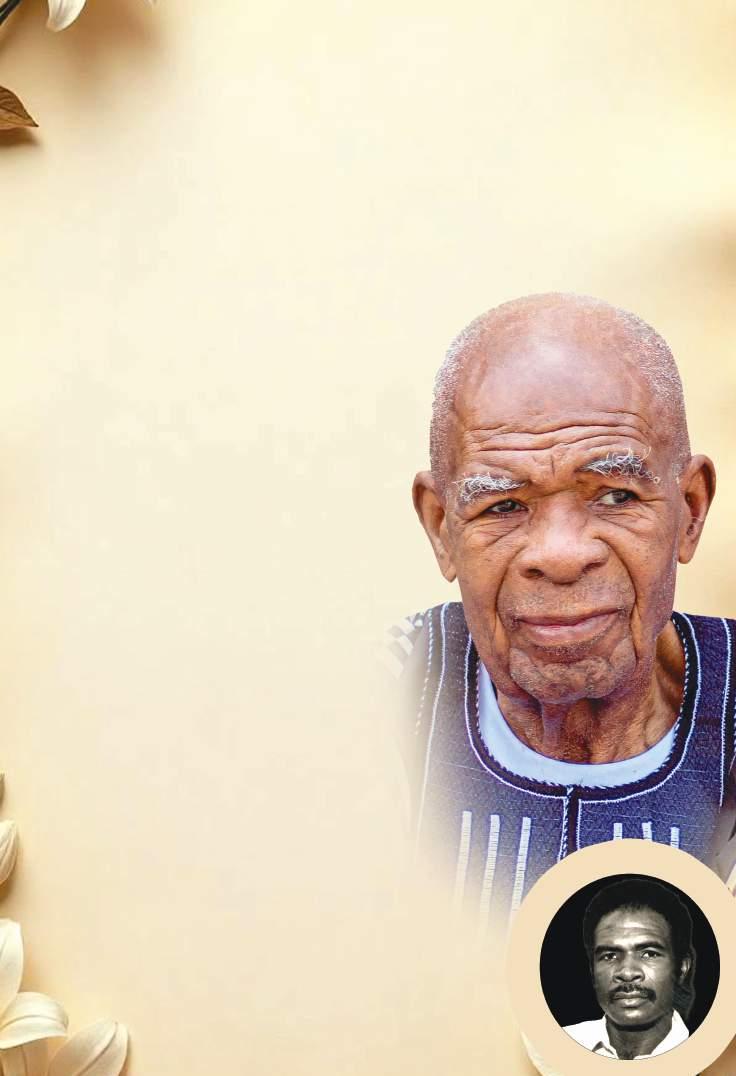




www.thisdaylive.com

Tuesday May 20, 2025 Vol

opinion@thisdaylive.com
The federal government and the states are gradually bringing down their debt burden, contends BAMIDELE ATOYEBI

See page 15
CHIDI ANSELM ODINKALU argues that the courts are increasingly suppressing the popular will as the foundation for democratic legitimacy

See page 15
EDITORIAL
DEARTH OF REMAND HOMES

TUNDE OLUSUNLE pays tribute to his friend and politician ’bro Ehigie’ at 70

He turns 70 on Sunday June 1, 2025. A thanksgiving service and celebration of the landmark, have been scheduled for the same day in Benin City, capital of Edo State, his birthplace. The city is a peculiar cosmopolis steeped in very rich history, confounding myth, even curious mysticism. It is only fitting to reflect on the life and career of a non-biological brother, Ehigie Edobor Uzamere, who I've known for almost five decades now. Indeed, for those of us who come several decades down the calendar of time with him, his latter day appellations and honorifics are novel to us. The job mobility of my parents precipitated the relocation of our family from Kaduna, capital of the primordial "North Central State," to Benin City, capitol of the old "Midwestern State," back in 1972. My father headed the Kaduna branch of "Livestock Feeds Ltd," which was then a subsidiary of the primordial "Pfizer Nigeria Ltd." My mother was a nurse and midwife in the employ of the "North Central State Health Management Board." Our first address was at "Second East Circular Road," Benin City.
As our family grew, we sought bigger residential facility in the "New Benin District" at the time. Mid-1975, we moved over to "Eresoyen Street," adjoining "Oziegbe Street" into a property owned by the Uzamere family. The world was a much better place, the Uzameres received us not as lessees of their property, but as extensions of the clan. For Iye, Madam Izegbuwa Lucy Uzamere, matriarch of their dynasty, my siblings and I, were as well her children. Iye's eldest child, Osaheni Uzamere, seasoned administrator and subsequently attorney was the head of the family. He took to me specifically because he was an alumnus of the revered Immaculate Conception College, (ICC), Benin City, where I also had my secondary school education. The Uzamere family was predominantly populated by boys. Albert, the youngest of Iye's children was my direct contemporary. We proceeded apace in our various secondary schools. Immediately above Albert was George, who was next to Ehigie.
Long settled out there in the United States of America, (USA), was Ehigie's immediate elder brother, John, (now of blessed memory). Humphrey and Wellington, half brothers to Ehigie were regularly around. Ehigie was something like the unofficial "head boy" within that space. We all deferred to him which culminated in our christening him Bro Ehigie. Despite our sociocultural diversities, Ehigie Uzamere showed leadership amongst us the boys in the house. He was interested in our academic performances and regularly sought updates about our tests and examinations. He would usually call for our answer sheets and report cards. He spotted my proficiency in English language and Literature-in-English and would admonish us on knowledge-sharing. Bro Ehigie soon joined John Uzamere in the US and swore to convince my parents to allow me join him once he was settled. To be sure, he secured admission for me at the State University of New York, (SUNY), not too long after, on the strength of my academic transcripts. I later posted a Division One performance with distinctions in the West African School Certificate Examination, (WASCE) O'Level which I wrote at age 15. My parents feared I was too young to live out of their sight, all by myself at that age, if I was allowed to go abroad.
Ehigie Uzamere visited home fairly often. From
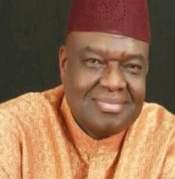
his luggage whenever he came, we gleaned the albums of new and current foreign musical releases. My first physical and auditory encounters with the works of many foreign artists those good old days were from Bro Ehigie's collections. These include releases by Ray Parker Jnr; Diana Ross; Al Hudson and One Way; Sugarhill Gang; Bill Summers and Summers Heat; Brothers Johnson, "Stomp;" Prince, "I Wanna Be Your Lover," Michael Jackson's "Off the Wall" and so on. Usually when he holidayed in Benin City, he was hosted to a few gigs by his friends. We the younger troupe would dress our best and tag along with him. My parents were ultra-strict with the rules, especially those years when one was still a precocious early teen. Bro Ehigie's name, however, could avail you some latitude.
In 1980, my family relocated to Ilorin in Kwara State. After several years in the "diaspora" within the Nigerian context, my parents thought we should gravitate homewards. Telephony was not anywhere as sophisticated as it is today, but somehow, I kept in touch with Benin City. Across the road from the Uzamere's, were the Ehigators, a family very close to ours. Osabuohien Ehigiator, (may his soul rest in peace) was my very good friend and schoolmate. Through him and members of his family, I was able to stay in touch with our mutual friends in Benin City. After qualifying as an architect in the US, Ehigie Uzamere went against the grain. Whereas many Nigerians who had the opportunity of foreign sojourn opted to stay back in the countries where they schooled, Uzamere returned home. He believed he could contribute to the development of his home country, despite the privilege of dual citizenship.
He underwent the mandatory one-year National Youth Service Corps, (NYSC) with the Bendel Development and Property Authority, (BPDA), which retained his services upon the completion of the exercise. Not too long after, he opted for self-employment and established a chain of private firms with interests in architecture and building; procurement; medical and pharmaceutical hardware; water processing and broadcasting. He ventured into politics and was elected Senator representing Edo South in 2007, and reelected for a second term in 2011. He made history as the first parliamentarian to be elected on the platforms of two different political parties, the Peoples Democratic Party, (PDP) and the Action Congress of Nigeria, (ACN), in Edo State. During his stint in the federal parliament, he helped reposition his senatorial district at the core of national politics. No more the sidelining, the intentional marginalisation
of Edo South in the national scheme.
Working with amenable political leaders from his catchment, he galvanised support for the appointment of one of his constituents as Vice Chancellor of the University of Benin. It was the very first time in the life of the institution. He equally anchored the recognition of one of his own as Chief Executive of the Nigerian Institute for Oil Palm Research, (NIFOR), which is domiciled in his senatorial district. In all of these, Uzamere remains renowned for his politics of civility. Not for him the lawlessness, thuggery and violence which typify our politics in parts. You needed to experience his connectedness with the grassroots, the way he was adulated one of those days he picked me up from the airport in Benin City. He is known by a large percentage of the commuter operators in the place and seamlessly code-switched to Bini language as he engaged with them. Don't be surprised when Ehigie Uzamere and I converse in particular ways in pidgin English. We have peculiar expressions understood only by initiates.
Uzamere's greatest source of joy, happiness and fulfilment is his beautiful family. He has been married to his very homely wife, Iriagbonse Irowa, for 43 years. The union has been blessed by God with many children and grandchildren. He has a pet name for each of his children even as he eternally dotes on his grandchildren. He never misses any opportunity to have his family congregate under one roof, in his homes, in Benin City, Abuja or Atlanta, especially during festivities. He would spontaneously set up photo shoots for his grandchildren. Contentment and gratitude are typically writ large on his visage. You get the feeling that he would most happily build an expansive palace, bordered by the same perimeters so he could wake up each morning and tour each family unit to see just how everyone is faring.
Uzamere's loyalty to friendship is phenomenal. In rain or sunshine, he sticks with you. Despite suspicions of the serial subversions of popular will by the nation's foremost electoral midwife in the 2019 and 2023 presidential elections, he has stuck with his preferred candidate, former Vice President Atiku Abubakar, through thick and thin. When he is not on Atiku's entourage, Uzamere would be on the delegation to receive Atiku at the airport, irrespective of the time of the day. He is not given to prevarication, he's never on the fence on issues. He takes a position and stays with it. He will remind you that at his age and stature as an elder statesman, it is far too late for him to play the chameleon.
I savoured a meal of home-made rice for dinner with him on one of my visits. It came, wrapped in green leaves, restating Uzamere's uncommon earthiness, despite his established cosmopolitanism. As I ran out of stew for my meal, he simply picked up my serving of the rice and moved the content into the stew. He remarked in pidgin English: When soup no plenty again, just transfer the food inside the soup bowl, he lectured me with an accompanying smile. Uzamere is in the constant business of self-development. He once told me, not too long ago, that he had registered for a masters degree in business administration. I asked why he went back to school.
Olusunle, PhD, Fellow of the Association of Nigerian Authors, (FANA), is an Adjunct Professor of Creative Writing at the University of Abuja

The federal government and the states are gradually bringing down their debt burden, contends BAMIDELE ATOYEBI


It is axiomatic that when the fountain is muddied, you can't get clean water downstream just like the fish starts rotting from the head. However, what is happening in the political firmament of Nigeria is a reverse logic to those aphorisms.
Like it is argued that individual capacity determines the success and development of a nation in transition like Nigeria, it has held true economically and will soon go round to other sectors of the country.
When Nigerians heard the announcement on inauguration day of President Bola Ahmed Tinubu, that subsidy is no more, it evoked mixed feelings from friends and foes. To some, it aligned with the unsteady movement of the announcer while armchair economists dusted up their brains and started tumbling straight from economic abstracts with convoluted propositions of what should or ought to have been done.
In his characteristic style, Tinubu asked for time and understanding, insisting that he knew what he was doing, and where he was leading the polity to. As with new policies, it brought with it the balancer of good which is hardship but Nigerians would have none of that and they started lamentations and hurling curses on the President for the hardship. They forgot that you can't make an omelette without breaking eggs, and that pain and gain are two sides of one coin. You cannot take one and leave the other.
Fastrack to now where other Governors like line dancers are looking at the footsteps of the lead dancer and taking cues. How has that translated to reality? A look at documents from the Debt Management Office shows that Nigeria is paying off her debts accumulated by several administrations like the International Monetary Fund (IMF) which has come out to acknowledge it as true, making people to wonder how come in this era of belt tightening and global tanking of economies.
Some are saying it is a product if the removal of subsidy which had attracted the highest outcry and negative analysis. Its early gains have manifested in debt freedom by Nigeria. Other debts are being serviced and repaid which signposts better days ahead.
Since President Tinubu has led the way to adroit utilisation of resources as well as responsible spending, there is no other way to go for subnationals than to follow suit. The first salvo was fired by Alex Otti of Abia State who said he had reduced the
debts of the state without borrowing while also executing multi- billion Naira projects. Indeed, more statistics started dropping that it was the case of all the states in Nigeria in a collective march towards debt freedom.
With a bragging right, the government can boast all it wants because there are tangibles to point at as performance indices. As one Tinubu supporter boasted on the internet, "The removal of subsidy has helped us to achieved this; we were borrowing to pay subsidies, but now, we are paying back all the debts incurred under subsidy.
"No State borrows to finance projects anymore, so the financial liberation is what we have not seen in this country before. We are definitely moving on the right track and hopefully, we will gather enough speed to meet the advanced economies soon."
A look at the statistics of domestic debt comparison released by relevant authorities show more than 98 per cent decrease in debts across states. Only three states have increased debts out of the 36 states and the Federal Capital Territory. They are Niger State with 15.40 per cent increase, Enugu with 27.99 percent increase, and Lagos with 61.59 percent. The rest of the states all have negative debt increases meaning they are paying back their debts without further borrowings, an unprecedented record in the annals of Nigerian history.
Jigawa State as at 2023 owed N43bn which it has reduced to N1.3bn which means it has paid 96.92% of its debt under Tinubu administration. It is closely followed by Ondo State which had N74bn but reduced to N13bn. Ebonyi State which has slashed N76bn to N18bn. By that figure, it has paid 76.21%of it's debt.
Kaduna State has reduced N87bn indebtedness to N25bn while Borno has N93bn reduced to N28bn, and so on.
The simple explanation to the magic is that Tinubu is clear headed on the problems of the country and has been applying his economic surgical blade with delicate accuracy to removing the cancerous cells that have been stultifying Nigeria's growth. Since we are still in the second year of the administration, and we are recording these results, there is no doubt that things will improve further in the years ahead.
Comrade Bamidele is a social worker, criminologist, maritime administrator, and philanthropist. He serves as The National Coordinator of The Accountability and Policy Tracker, Abuja
CHIDI ANSELM ODINKALU argues that the courts are increasingly suppressing the popular will as the foundation for democratic legitimacy

In March 2006, Uganda’s Supreme Court convened to begin adjudication of the disputes over the presidential election that occurred the previous month in the country. Voting took place on 23 February. Two days later, on 25 February, the Electoral Commission announced the results giving the incumbent, Yoweri Kaguta Museveni, 59.28% of the valid votes cast. In second place, with an award of 37.36% of the votes, the Commission announced Kiiza Besigye, a medical doctor whose military career began as part of the bush war that brought Museveni to power 20 years earlier in 1986.
In his petition against the announced result, Col. Besigye argued that the Electoral Commission did not validly declare the results in accordance with the Constitution, and the Presidential Elections Act; and that the election was conducted in contravention of the provisions of both. His evidence was compelling.
Yet, the impression that the petition process was a ritual performance with a predetermined outcome pervaded the process. Leading the legal team for the Electoral Commission of Uganda who were defendants in the petition was Lucian Tibaruha, Solicitor-General of Uganda. In reality, he also led the lawyers for the president, also a defendant alongside the Electoral Commission. Handling election petitions for a party political candidate was not supposed to be part of Lucian’s job, but there he was.
Presiding was Bejamin Josses Odoki, Chief Justice of Uganda since 2001 and the author of the 1995 Constitution that incrementally made Museveni a life president. Idi Amin, Uganda’s infamous military dictator, elevated Odoki to the bench as a 35 -yearold in 1978. Amin’s nemesis, Museveni, elevated him to the Supreme Court eight years later and made him Chief Justice in 2001.
Announcing its reasoned judgment in January 2007, the court found that there had been noncompliance with the Constitution of Uganda and the applicable laws in the form of “disenfranchisement of voters by deleting their names from the voters register or denying them the right to vote” as well as “in the counting and tallying of results.”
The Court equally found as a fact that the “principle of free and fair elections was compromised by bribery and intimidation or violence in some areas of the country” and also that “the principles of equal suffrage, transparency of the vote, and secrecy of the ballot were undermined by multiple voting, and vote stuffing in some areas.”
Despite these findings, Chief Justice Odoki and his court ruled by a majority of four votes to three of Justices of the Supreme Court of Uganda to uphold the election and grant President Museveni another five years in power. Two years after this decision, in 2009, when the Chief Justice’s son, Phillip Odoki, wedded, Museveni’s son, General Muhoozi Kainerugaba was the best man
In 2010, it emerged that Chief Justice Odoki never harboured any doubts about the outcome. Questioned about the role of judges in deciding elections in Africa, Odoki, “smiled when commenting that to nullify a presidential election would be suicidal.” He lived to see his peers in Kenya and Malawi do just that in 2017 and 2020 respectively. It proved not to be suicidal.
According to former law teacher, Olu Adediran, the role of judges in these kinds of cases is in reality “a compromise between law and political expediency.”
Jude Murison is more direct in calling it “judicial politics.” Judges are not instruments of change or revolution and when they are called upon to adjudicate between sides in a political dispute, they are more often than not likely to treat that not as an opportunity to change political paymasters except when the bell has already tolled undisputedly for an incumbent.
Politicians are supposed to sell themselves to the people through their programmes and through campaigns in a contest of both ideas and vision. In return, the people through their votes offer

endorsement to the politicians and programmes whom they believe best advance their interests. An electoral commission is a referee supposedly engaged and maintained at the public expense to administer this contest.
This is where things begin to break down. Although engaged in the name of the people, every electoral commission is appointed by people in power who never wish to relinquish it. When a dispute emerges as to the kind of job done by the electoral commission, it ends up before judges. However, the same people who appoint the electoral commission also usually appoint the most senior judges into office. In the maelstrom of party political competition, guardrails break down as politicians struggle to casualise the popular electorate in order to prosper a judicial selectorate.
The more election disputes end up in court, the more it becomes evident to politicians that it is easier to make deals with the judges. The people are and can be unpredictable, unlike most judges. Increasingly, therefore, politicians seek to judicialize the site of decision-making on elections, relocating that from the polling booth to the courtroom.
If a politician can get their spouse appointed to become a judge, they can even make the site of decision-making in elections more intimate, relocating it from the courtroom to the bedroom. Instead of the usual soapbox, increasingly elections in many countries can be decided by good old pillow-talk. Former federal legislator, Adamu Bulkachuwa, whose wife, Zainab, headed Nigeria’s Court of Appeal for six years until 2020, published the manual on this model of electoral ascendancy in his parliamentary valedictory remarks as a senator in June 2023.
This is why the judicialization of politics in Africa increasingly represents a huge risk to the popular will as the basis of government. First, it vitiates the right to democratic participation and suppresses the popular will as the foundation for democratic legitimacy. Second, it enables the courts to deprive the people of their democratic rights, accomplishing that under the alluring pretence of rule of law. Third, it provides perverse incentives for politicians to capture the courts, making the judiciary in many African countries a battleground for the pre-determination of election outcomes. Fourth, it has the capacity to alter the character of the judiciary from an independent institution to a plaything of political insiders.
This trend in consigning elections to the care of a judicial selectorate around Africa now endangers judges and their independence.
A lawyer and a teacher, Odinkalu can be reached at chidi.odinkalu@tufts.edu

Editor, Editorial Page PETER ISHAKA
Email peter.ishaka@thisdaylive.com
Remand homes should be well-provided for
The prevailing depressed economy in the country is no doubt accentuating the problem of juvenile crimes as many families increasingly become unable to live up to the challenge of parenthood. It is therefore concerning that in many states, there are no remand homes to serve as detention centres for children who are either awaiting trial or have been convicted of offenses. Due to absence of such facility in Gombe, according to the chairman of the state chapter of Nigerian Bar Association (NBA), Benjamin Sati, juvenile offenders are often sent to custodial centres where they become hardened.
In other societies, vulnerable children who need protection and those beyond parental control are commonly kept in remand homes. That was also the case in the pre-colonial and early post-colonial Nigeria, but not anymore. “Because of the lack of remand homes in Gombe State, underage persons are housed together with adults in the correctional facility,” Sati said while also lamenting how a juvenile offender was granted bail in the state because there was nowhere to legally keep him but ended up killing another victim just two weeks later. “If he was under some supervision in a remand home, perhaps no more life would have been lost.”

physical and emotional abuse, and inadequate access to education and healthcare.
The situation in this supposedly corrective home is not remarkably different from those of adults in conflict with the law. Indeed, the conditions at the remand homes reflect the national attitude towards children and the most vulnerable groups in Nigeria. Like the prisons, the few remand homes in the country are oppressive institutions aimed at punishing offenders rather than rehabilitating them. The institutions are decrepit, ill-equipped and the inmates ill-fed. They are denied humane treatment and have no access to recreational and sporting activities. Even more, they also lack relevant educational and vocational trainings to equip inmates to live a sustainable life when they eventually return to the larger society.
Inmates of these homes must also be equipped with basic skills that would enable them to fit easily into the larger society at the end of their reformation
T H I S D AY
EDITOR SHAKA MOMODU
DEPUTY EDITOR WALE OLALEYE
MANAGING DIRECTOR ENIOLA BELLO
DEPUTY MANAGING DIRECTOR ISRAEL IWEGBU
CHAIRMAN EDITORIAL BOARD OLUSEGUN ADENIYI
This is a serious problem that needs to be addressed. Nigeria is signatory to the Convention for the Rights of the Child (CRC) and the African Charter, and thus the treatment of the young offenders must conform to international standards. Although the Gombe Commissioner for Justice and Attorney General, Zubair Umar, has promised to address the issue due to growing criminal activities among teens, the challenge is not restricted to the state. It is a national problem. Even in a few states where these remand homes exist, they are plagued by overcrowding, poor living conditions, malnutrition,

EDITOR NATION’S CAPITAL IYOBOSA UWUGIAREN THE OMBUDSMAN KAYODE KOMOLAFE T
EDITOR-IN-CHIEF/CHAIRMAN NDUKA OBAIGBENA
GROUP EXECUTIVE DIRECTORS ENIOLA BELLO, KAYODE KOMOLAFE, ISRAEL IWEGBU
DIVISIONAL DIRECTORS SHAKA MOMODU, PETER IWEGBU, ANTHONY OGEDENGBE
DEPUTY DIVISIONAL DIRECTOR OJOGUN VICTOR DANBOYI
SNR. ASSOCIATE DIRECTOR ERIC OJEH
ASSOCIATE DIRECTOR PATRICK EIMIUHI
CONTROLLERS ABIMBOLA TAIWO, UCHENNA DIBIAGWU, NDUKA MOSERI
DIRECTOR, PRINTING PRODUCTION CHUKS ONWUDINJO
TO SEND EMAIL: first name.surname@thisdaylive.com
Also disturbing is that Nigeria lacks a dedicated helpline that street children can access to seek protection, redress, or shelter, leaving them even more vulnerable to abuse and neglect. That perhaps explains why we have a large army of youths roaming the streets begging for alms instead of being in school. Without homes or any discernible means of survival except begging, these children are easily lured into all manner of crimes. Meanwhile, there is also a social factor to the problem. Available reports indicate that most of the children in the remand homes across the country are from the poor in society--those in dire need of care and protection. Many of them live on the street and engage in any activities to scrape by before running afoul of the law.
We urge the Attorney General of the Federation and Justice Minister to work with his counterparts in the 36 states to ensure that there are functional remand homes across the country. Inmates of these homes must also be equipped with basic skills that would enable them to fit easily into the larger society at the end of their reformation.
Letters in response to specific publications in THISDAY should be brief (150-300 words) and straight to the point. Interested readers may send such letters along with their contact details to opinion@thisdaylive.com. We also welcome comments and opinions on topical local, national and international issues provided they are well-written and should also not be longer than (750- 1000 words). They should be sent to opinion@thisdaylive. com along with photograph, email address and phone numbers of the writer.
In Abuja, the Federal Capital Territory, right in the heart of Nigeria’s seat of power, pupils in public primary schools have remained at home with public primary schools shut as a result of the industrial action embarked upon by primary school teachers over wages. What this means is that for more than two months now, human capital development in children from low-income households has completely ground to a halt, stalled by the strike of their teachers. As is customary with industrial actions, there was surely a flurry of engagements between the teachers and the government and a series of warnings and interventions. If none of these worked, the only reasonable conclusion is that someone did not do enough to prevent what is a catastrophe for human capital development in Nigeria.
This is not the first time this is happening to primary school pupils within the Federal Capital Territory. In fact, this latest strike action is threatening to become a recurrent development.
It is sad that children in public primary schools are getting used to strike actions because their teachers are disgruntled over wages. It is even sadder that the authorities have shown a lack of tact in managing what has been a thorny problem, leading to more than
three such interruptions in the last three years.
Nigeria is a country of boundless potential. With its abundance of human and natural resources, Nigeria should have no business with multidimensional poverty. Yet, tragically, 83% of the world’s extremely poor people now live in Nigeria. Never has there been a better case study of what happens when management fails than the country as it is today.
At the heart of this crisis lie children. The children the country failed to train yesterday have become its problem today. The children it is failing to train today would surely pose a handful tomorrow.
A country that allows its schools to close is one that opens its gates to its enemies. Every shut school is a highway to prison as education is the foundation of every egalitarian society and without education, crime, and poverty enjoy a field day.
Education is invaluable to the human person. For children, especially those from extreme poverty, it is a lifeline, an equalizer, an indescribable gift.
No sane country would allow this kind of systematic compromise of its future to happen under its watch. Given the critical role
human capital development plays in national development, no serious society would allow the human capital of its youngest to fall under the hammer of systemic labor disputes, poor funding and regulatory inefficiency.
It is roundly scandalous that the pupils were allowed to miss their end-of-term exams and have again been missing crucial school work in the new term with devastating consequences for the children, their families, and the country at large.
Every day the children spend at home is a lost opportunity for Nigeria. The loss of social and economic value through the lack of human capital development in children, zero productivity from the striking teachers and interruptions to the jobs or businesses of parents whose schedules have been disrupted because children who should be in school are at home.
The consequences of this kind of derelictive disruption are usually years in the making. But come they must especially for a country where critical sectors are managed by grossly irresponsible and embarrassingly inept people.
Kene Obiezu, keneobiezu@gmail.com
TUeSday, M ay 20, 2025
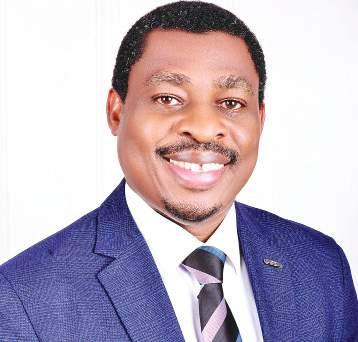


‘Every successful country, has built a system of government that is unique to them. They were trying to force the Arabs at the beginning, that they must adopt the American system of democracy. They said No…..American system, is based on the American culture of freedom. The British system, is based on the British system of Monarchy…..Every single one is different,…Let us build an African, Nigerian, focused political system….We had a political system before the Europeans came.….So, what are we running away from?’. - Tonye Cole, 2023 APC Rivers State Gubernatorial Candidate

PROF MIKE OZEKHOME, CON, SAN, FCIArb, PH.D. LLD Constitutional Democracy, means a system of government, in which political and governmental power, is defined, limited and shared by a grundnorm called the Constitution, which provides inbuilt checks and balances.
This column seeks to fiercely discuss constitutional, legal and political issues, with a view to strengthening, deepening and widening the plenitude and amplitude of democracy and good governance, without fear or favour.
The writer of this column, Prof Mike Ozekhome, SAN, is a Constitutional Lawyer, Human Rights Activist, Pro-Democracy Campaigner, Notary Public and Motivational Speaker. He co-founded the Civil Liberties Organisation (CLO), Nigeria’s pioneer human rights league, on October 15, 1987, the Universal defenders of Democracy (UDD), in 1992, and with Chief Gani Fawehinmi and others in 1998, the Joint Action Committee of Nigeria (JACON), to push out the military. In his early days, he lectured at the University of Ife. Prof Ozekhome is an author of many books. He is also a Special Counsel at the International Criminal Court (ICC), at The Hague.

Court with Jurisdiction in Dispute after Appointment of Receiver
Page IV
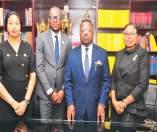
2025 NBA Lagos Annual Law Week to Spotlight Law, Ethics and Innovation
Page V

VeryDarkMan
Re-Arraigned in Cyberbullying Case, Trial Set for July 2025
Page V

Lagos Court Convicts 10 Thai Sailors for Cocaine Trafficking, Fines Vessel $4 Million
Page V
Last Thursday, I was going through This Day and, on Page 34, I saw a news story titled “DSS Files Charge Against Utomi Over Planned Shadow Government”. I didn’t know how to react, whether to fall on the floor rolling with laughter because it sounded so ludicrous, or whether to cry, because such a serious security agency which Nigerians look upon to take care of their internal security, could be wasting precious time on such instead of concentrating fully on Bandits, Kidnappers, Insurgents, so-called Herdsmen, and all the other new criminals that have emerged to cause Nigeria‘s internal insecurity. The news story stated that the Department of State Services (DSS) had gone to the Federal High Court, to get a perpetual injunction to stop Professor Pat Utomi and his associates from establishing a Shadow Government! The DSS claims that the Shadow Government is contrary to Sections 1(1), (2) & 14(2)(a) of the 1999 Constitution of the Federal Republic of Nigeria (as amended) (the Constitution).
One wonders if the DSS or its legal representatives understand what a Shadow Government is, at least, in Prof Utomi’s context, as the term ‘Shadow Government’ could have several appearances, and how needless their action of filing a suit in this regard is. To most Nigerians, it appears like a not-so-subtle attempt to stifle Nigerians’ right to freedom of thought and expression, which is enshrined in Sections 38(1) & 39(1) of the Constitution. See Shuaibu & Ors v Utomwen & Ors (2022) LPELR-58237(CA) per Biobele Abraham Georgewill, JCA on the right to freedom of expression. How does inaugurating a group that shadows government, monitoring whether government delivers good governance and churns out sound economic and public policies, translate to being a group that wants to control government and seize the sovereignty of Nigerians contrary to Sections 1(2) & 14(2)(a) of the Constitution? This is called accountability, checks and balances, encouragement of transparency in governance, and possibly opposition, if the Shadow Group disagrees with government policies; these are essential elements of democracy, and cannot be said to be unconstitutional. Unless there are many more facts that the public is unaware of, beyond Prof Utomi’s television interviews and social media activities which were referred to in the aforementioned news story, it is preposterous to conclude that he’s in breach of the aforementioned Section 1(2) & 14(2)(a) of the Constitution.
Appearances of Shadow Government
In the first context, you have a Shadow Government which is a clandestine group, such as a secret cult, populated with members from the different arms of government and all walks of life, and together, the members exercise immense powers over every aspect of government and its policies. This context is not applicable to Prof Utomi’s group, as it’s neither clandestine (some of the names of the members and their designations were published in the aforementioned news story), nor does his group wield any power.
In the second context, a Shadow Government could be an informal group that isn’t publicly accountable, possibly one that comprises of family members, cronies and associates of a political leader/top government official, but is well informed about all the important aspects of governance, even more so than those who may hold office and wields power over government policies, aka ‘Kitchen Cabinet’. We know that this certainly does not and cannot describe Prof Utomi and at least, one of the alleged members of his team, Dele Farotimi, who is a critic of Government. Even as a Politician aspiring to be the APC Delta State Gubernatorial candidate for the 2019 election, sometime in 2018 after the Delta State APC Primaries, a video trended in which Prof Utomi described his fellow APC Members as ‘evil’, because not only was he excluded from the Party Primaries which he was to participate in, the venue of the intra-party event wasn’t even shared with him! Obviously, Prof Utomi, who one can safely conclude has since left APC, is certainly not an inner caucus member of the powers that be, and this context of the definition of Shadow Government is inapplicable to his group, as he is even seen by some as a disgruntled former APC Member who turned sour after failing to achieve his political goal. Prof Utomi wasn’t even given any usual consolation prize appointment, like other party members who don’t get or don’t win their elective positions are usually given. In the third context, like in the UK, a Shadow Government is simply the strong opposition having its own Shadow Government complete with a
onIkepo BraIThwaITe
onikepo.braithwaite@thisdaylive. com onikepob@yahoo.com

“One
wonders if the DSS or its legal representatives understand what a Shadow Government is, at least, in Prof Utomi’s context….The irresistible conclusion about the DSS’s suit against Prof Utomi is, as we say in legal parlance when we want the court to dismiss our opponent’s application, that it is ‘misconceived, frivolous and vexatious’!”
Shadow Cabinet who study the policies of the corresponding Cabinet actually in office, criticise them, develop alternative/substitute policies and hold government accountable. For example, the UK Secretary of State for Education is Bridget Phillipson (she had been Shadow Minister with the same portfolio when Labour was the opposition), while the Shadow Minister of Education is now Laura Trott of the Conservative Party. It is in this third context that it makes sense to consider Prof Utomi’s Shadow Group, though they do not appear to have a full Shadow Cabinet, nor can they be said to be a strong opposition, at least, not in the way and manner the Conservative and Labour are to each other.
In the first context of the clandestine Shadow Government, there should certainly be concern, because no one but the members of their secret group know what their motives and goals are; even the knowledge of the existence such groups or their membership is usually mostly cloudy. In the second and third contexts, the essence of a Shadow Government is obviously not to overthrow the incumbent government. If anything, the second group wants to keep the government in office, so they can continue to wield power, while the third group gains popularity and experience from their shadowing, in preparation for taking up office if their Party wins the next election, as in the case of Bridget Phillipson who took over the substantive Education portfolio she had previously shadowed, when Labour won the election. In short, in the third scenario, such as Prof Utomi’s, unless government is trying to stifle all opposition
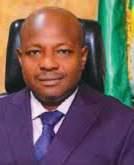
(see Section 1 (a)-(c) of the NSA Act), though the claim by the SSS is that DSS is its alter-ego, the same as SSS, or something like that. The functions of SSS which are not at large, but border on dealing with crimes that affect the internal security of the country, are set out in Section 2(3) of the NSA Act; and we can easily rule out Section 2(3)(b) which deals with non-military classified matters. See Section 9(1) of the Official Secrets Act 1962 on the definition of classified matter. Prof Utomi, who wasn’t informed of the venue of the Party Primaries in which he was to participate in, and was unable to discover the location of the venue through his own investigative efforts, is unlikely to be in possession of any classified information. There’s nothing classified about Government’s public policies, and letting Nigerians know the pitfalls therein, whether better ideas are put forward or not. This is called freedom of expression. It is bad enough that Chapter II of the Constitution, that is, the Fundamental Objectives and Directive Principles of State Policy that makes Government accountable to the people, is not directly justiciable, then to use all kinds of means of stopping people from expressing their opinions/displeasure resembles an autocratic, and not a democratic environment.
and in so doing, this may be tantamount to breaching some fundamental rights such as the right to freedom of thought, expression, peaceful assembly, association and freedom from discrimination contrary to Sections 38(1), 39(1), 40 and 42(1)(a) of the Constitution, ordinarily there’s really nothing wrong in having an organised opposition.
In Ransome-Kuti & Ors v AGF & Ors (1985) LPELR-2940(SC) per Kayode Eso, JSC, the Supreme Court held inter alia that, fundamental rights stand above the ordinary laws of the land.
Functions of SSS
The action filed against Prof Utomi, is civil in nature. But, since what the Plaintiff is asking the court for in the case appears to be misconceived, seeing as trying to form a viable opposition is Prof Utomi’s right and cannot by the stretch of a vivid imagination, be said to be him trying to take control of the Government of Nigeria contrary to Section 1(2) of the Constitution, nor can him and his group be said to be trying to wrestle sovereignty from the people of Nigeria whom it belongs to, contrary to Section 14(2)(a) of the Constitution, I decided to examine the action of Prof Utomi through a criminal lens, particularly because the SSS (DSS) exercises criminal jurisdiction.
The National Security Agencies Act 2006 (NSA Act), the establishment law of Nigeria’s Security Agencies, namely the Defence Intelligence Agency (DIA), National Intelligence Agency (NIA) and State Security Service (SSS) makes no mention of the DSS as one of the three national security agencies

As for Section 2(3)(a) of the NSA Act which provides for the prevention and detection of crimes that affect the internal security of Nigeria, internal security includes things to do with treason, insurgency, terrorism, subversion, spying and sedition. The first three offences have to do with violence, the fourth and fifth, leaking political or official information/secrets to another country and we can rule them all out in Prof Utomi’s case, since the DSS has brought a civil and not criminal against him. The sixth, Sedition, is inter alia, publications or actions which tend to bring the Government, President or Governors into disrepute, or incite hatred and disaffection against them, or promote hostility amongst different sections of Nigerians. See Sections 50 & 51 of the Criminal Code Act (CCA). However, in DPP v Obi (1961) LPELR-24982(SC) per Adetokunbo Adegboyega Ademola, JSC, the Supreme Court, inter alia, enumerated circumstances in which a publication or an action wouldn’t be seditious, such as when it shows that the President or Governor was misled or made a mistake in any measure, or pointing out errors in the measures. It appears that Prof Utomi’s actions fall within this exception, and are also protected by the aforementioned fundamental rights.
Even Section 2(3)(c) of the NSA Act which endows the National Assembly and the President with powers to assign other responsibilities to the SSS that are deemed necessary, such responsibilities are also not at large - they must be related to Nigeria’s internal security.
Conclusion
Is the DSS now trying to insist that everyone must support the Tinubu administration, and those who are not in support are a threat to its existence? With the wave of defections to the ruling APC going on at the moment, Nigerians are asking whether the country is moving towards a one-party State, which could be undemocratic, because one of the drawbacks of a one-Party State is that it promotes less accountability from the ruling party. In a country where the level of accountability on the part of the Federal Government has been rather low, and that of the Governors, even less, it would be like having no opposition and zero accountability in a one-Party State.
As for the SSS or DSS, they already have their work very well cut out for them with the numerous threats against Nigeria’s internal security, and they should face this squarely without distraction. Insurgency in the North East and Banditry/Farmer-Herder Crisis or whatever it is called in the North Central, seem to be on the rise again. It would be better if the SSS (DSS) concentrates more on these important matters bordering on insecurity, instead of wasting time on absurdities. Have they even watched any of Prof Utomi’s interviews on television? Mostly, only people who have some basic knowledge of economics can relate to his submissions. The average man on the street may not even have a television to watch Prof Utomi, or electricity supply to tune in, let alone understand and be influenced by Prof Utomi’s economic theories.
The irresistible conclusion about the DSS’s suit against Prof Utomi is, as we say in legal parlance when we want the court to dismiss our opponent’s application, that it is ‘misconceived, frivolous and vexatious’!
Facts
This appeal is an offshoot of the strained banker-customer relationship between the 1st Appellant and the Respondents, arising from a loan facility advanced to the 1st Respondent by the 1St Appellant. By a writ of summons dated 23rd June, 2008, the Respondents filed an action against the Appellants before Delta State High Court seeking, amongst others reliefs, a declaration that the loan transaction between the 1st Appellant and the 1st Respondent was frustrated by the 1st Appellant and natural causes, for which reason the 1st Appellant ought not to have charged any interest on the same. The Respondents also sought an order nullifying the appointment of the 2nd Appellant by the 1st Appellant as the Receiver/Manager of the 1st Respondent; damages for breach of contract and orders of injunction against the Appellants.
Upon being served with the Respondents’ processes, the Appellants entered conditional appearance, and reacted by filing a motion on notice praying the court to strike out the Respondents’ suit on the ground that the trial court lacked jurisdiction to entertain the suit because the 1st Respondent was in receivership. After taking arguments on the objection, the trial court held that the Respondents’ claims were well situated within the jurisdiction of the State High Court and consequently, dismissed the Appellants’ objection.
Dissatisfied, the Appellants appealed to the Court of Appeal. In its judgement, the Court of Appeal held that only claims Nos. 4, 6 and 11 can be heard and determined by the Federal High Court, while the other claims were well within the jurisdiction of the trial State High Court. Aggrieved with the latter part of the decision, the Appellants filed an appeal before the Supreme Court.
In determining the appeal, the Supreme Court adopted the issue distilled by the Respondents, as follows: Whether the lower court was right in holding that the trial State High Court had the jurisdiction to entertain the Respondents’ claim, except reliefs 4, 6 and 11.
Arguments
Counsel for the Appellants submitted that although by Section 251(1) of the 1999 Constitution (as amended), the Federal High Court and State High Court have concurrent jurisdiction on matters arising from Banker-Customer relationship; however, where the issue arising therefrom relates to the appointment of a Receiver/ Manager which is regulated the Companies and Allied Matters Act 2004 (CAMA), it is only the Federal High Court that can exercise exclusive jurisdiction over such matter. Counsel placed particular reliance on Section 251(1)(e) of the 1999 Constitution, in support of his argument that the State High Courts do not have jurisdiction over the operation of the Companies Act. Counsel submitted that Exhibit “AA15” — the Letter of Appointment of the 2nd Appellant as Receiver/Manager fell within the purview of Sections 387 to 400 of the Companies and Allied Matters Act (CAMA) 2004 which regulates the appointment of a Receiver/ Manager, hence, the State High Court could
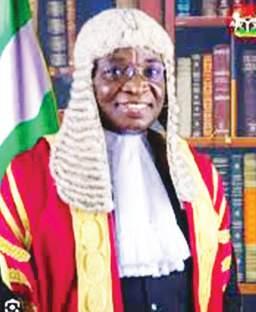
In the Supreme Court of Nigeria Holden at abuja
On Friday, the 19th day of July, 2024
Before their lordships uwani Musa abba aji Jummai Hannatu Sankey Stephen Jonah adah abubakar Sadiq umar Mohammed Baba Idris Justices, Supreme Court SC/234/2016
Between
1. FIRST BaNK OF NIGeRIa PLC
2. eLIJaH OLa adedIWuRa
aPPeLLaNTS
And
1. BeN-SeGBa TeCHNICaL SeRVICeS LTd
2. MR BeRNaRd eSeGBa
ReSPONdeNTS (Lead Judgement delivered by Honourable Stephen Jonah Adah, JSC)
not, by any means, exercise jurisdiction over any questions arising from or connected to the same. Counsel submitted that the Court of Appeal was wrong to have held that the High Court of Delta State, which is a State High Court, can adjudicate on the action filed by the Respondents. In response, Counsel for the Respondents argued that the lower court was correct in holding that the trial court had jurisdiction to entertain the Respondents’ claims, except for reliefs 4, 5, and 11. Counsel submitted that it is not the practice of the courts to strike out an entire suit merely because certain reliefs fall outside the jurisdiction of the court, particularly where the court retains jurisdiction over a substantial portion of the claims.
“…. where there are mixed reliefs, the court with competent jurisdiction to handle all should be used and not otherwise…. the appointment of a Receiver/Manager under the agreement not only raised the issues of recovery of the loan and receivership, but the inter-play and operation of the Companies and Allied Matters Act (CAMA), which by Section 251(1)(e) is exclusively meant for the Federal High Court”
Counsel further contended that none of the authorities cited by the Appellants establish that the State High Court must decline jurisdiction over an entire suit, simply because some claims fall within the concurrent jurisdiction of the Federal High Court. According to him, the mere fact that jurisdiction is shared does not render the State High Court incompetent to adjudicate on matters properly within its scope. Counsel maintained that where a trial court lacks jurisdiction over certain reliefs, it does not affect its competence to determine the remainder of the suit.
Relying on REGISTERED TRUSTEES OF LIVING CHRIST MISSION v ADUBA (2000) 3 NWLR (PT. 647) 14, Counsel submitted that the proper course in such circumstance is to strike out only the affected reliefs and proceed to determine those within the court’s jurisdiction. In conclusion, Counsel urged the Supreme Court to dismiss the appeal for lacking in merit.
Court’s Judgement and Rationale In resolving the sole issue, the Supreme Court emphasised that the jurisdiction of every court is created by the statute setting up the court and the Constitution. The Apex Court affirmed that the Constitution of
the Federal Republic of Nigeria 1999, expressly confers jurisdiction exclusively on the Federal High Court to hear and determine issues relating to receivership and the operation of the Companies and Allied Matters Act.
The Court held that where there are mixed reliefs, the court with competent jurisdiction to handle all should be used and not otherwise, thus, where there is a court that has the capacity or jurisdiction to settle all issues in a case, that court alone should be approached to hear the issues.
The Supreme Court held further that where ancillary or incidental or accessory claims are so inextricably tied to or bound up with the main claims before the court in a suit, a court cannot adjudicate over them where it has no jurisdiction to entertain the main claims if such incidental or ancillary claims cannot be determined without a determination at the same time of the main claims, or where the determination of such incidental or ancillary claims must necessarily involve a consideration or determination of the main claims.
The Court referred to its decision in GAFAR v GOVT OF KWARA STATE & ORS (2007) LPELR-8073 (SC) (PP. 22 PARAS A).
The Supreme Court held that it was evident that at the time the Writ was taken out by the Respondents, the 1st Appellant had under Clause 8 of the Tripartite Legal Mortgage Agreement between the parties, appointed the 2nd Appellant as a Receiver/Manager over the 1st Respondent. The Court held that this fact definitely, was signpost indicative of the fact that the issue at stake was no longer the simple issue of Customer/Banker relationship, but had metamorphosed into that of receivership; and the appointment of a Receiver/ Manager under the agreement not only raised the issues of recovery of the loan and receivership, but the inter-play and operation of the Companies and Allied Matters Act (CAMA), which by Section 251(1)(e) is exclusively meant for the Federal High Court. The Court held that this is particularly so, as reliefs 4, 6 and 11 out of the 11 reliefs sought by the Respondents were predicated on the appointment of a Receiver, and it was evident that the main grouse of the Respondents lay in the appointment of a Receiver for the 1st Respondent, following their default to meet their obligation to repay the loan advanced to the 1st Respondent.
The Apex Court held that it is apparent that the principal claims of the Respondents are as set out in paragraphs 4, 6 and 11 of the writ of summons and the other reliefs are consequential reliefs sought, should the principal claims in respect of receivership succeed. Therefore, insofar, as the trial State High Court is not competent to entertain claims nos. 4, 6 and 11; it is the Federal High Court, as opposed to the Delta State High Court, that is vested with the requisite jurisdiction to determine the entire claims of the Respondents. The Apex Court agreed with the Appellants’ Counsel that the lower court was truly in grave error, in failing to disqualify the trial court from exercising jurisdiction in hearing and determining the Respondents’ action as constituted.
Appeal Allowed. Jim Okodaso with Uvie Oru for the Appellants. Onome Egbon for the Respondents.
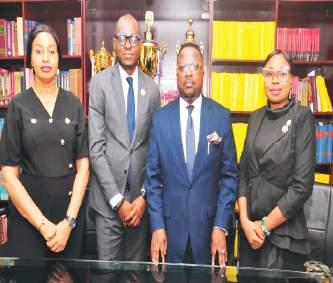

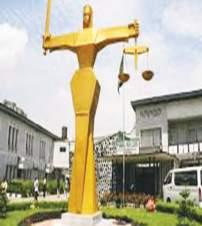
Stories by Steve Aya
Activities and dates for the Lagos Branch of the Nigerian Bar Association (NBA) flagship event, the 2025 Annual Law Conference, have been announced. With the theme “Reimagining the Practice of Law: Ethics, Innovation, and the Future of Legal Services” .
The highly anticipated event is scheduled to take place from Saturday, June 14 to Friday, June 20, 2025, at the MUSON Centre, Onikan, Lagos. The Conference will feature a week of activities, aimed at redefining legal practice in the face of societal and technological change.
Conference Planning Committee Chairman, Dr Tolu Aderemi, said the sub-theme “Let’s Be Lawyers Again”, underscores a call to restore professionalism and ethical standards in law.
One of the major highlights of the Conference is the Keynote
Address by Mr Richard Atkinson, President of the Law Society of England and Wales. Mr Atkinson is expected to offer a global perspective on the future of legal services, with a focus on innovation and regulatory reform.
The first plenary session, led by former NBA President, Dr Olisa Agbakoba, SAN, will feature a distinguished Panel including current NBA President, Mazi Afam Osigwe, SAN; Mrs Funke Adekoya, SAN; and President, National Industrial Court of Nigeria, Honourable Justice B. B. Kanyip. Discussions
will centre on the ethical and professional standards expected of legal practitioners in both the public and private sectors.In a symbolic gesture aimed at reinforcing integrity within the profession, all attendees will take an “Ethical Oath Declaration”. An “Ethical Icon Award” will also be presented, to a legal practitioner who exemplifies the highest standards of ethical conduct.
The agenda includes several Panel sessions, across specialised legal fields. A notable innovation this year, is the introduction of subject-specific masterclasses led
by top law firms and industry professionals. Topics will include data privacy, sports and entertainment law, renewable energy, green growth, and governance, offering participants in-depth engagement with emerging areas of legal practice.
Another major feature is Day 4, the Regulatory Clinic, where agencies such as the Lagos State Lands Bureau, Corporate Affairs Commission (CAC), and Federal Competition and Consumer Protection Commission (FCCPC) will engage directly with practitioners. Rather than serve as a platform for criticism, the
session aims to promote dialogue and enhance service delivery within the legal ecosystem.
Leadership and professional development will take centre stage on Day 5, as aspirants for the Branch Chairman role share their vision in an open forum. Dedicated sessions will also be held for In-House Counsel and the Young Lawyers’ Forum. The former will tackle common challenges in corporate legal departments, while the latter will focus on ethics, discipline, and career growth for emerging professionals.
The week will conclude with
a Chairman’s Dinner and Elders’ Night - an elegant tribute to senior Lawyers who have served the profession, but are no longer active due to age or health. The event will wrap up with a vibrant Closing Party, to celebrate the insights and relationships built during the week.
Describing the Conference as more than a professional gathering, Dr Aderemi stated that: “This is a movement to reawaken the conscience of the legal profession, embrace innovation, and restore public trust in the Bar”.
Popular social media commentator and activist, Martins Otse, better known by his online moniker, VeryDarkMan (VDM) was re-arraigned before the Federal High Court in Abuja,
in fresh proceedings related to alleged cyberstalking and online harassment.
The case, which centres on posts targeting Nigerian entertainment personalities, continues to stir debate
over the fine line between activism and defamation in the digital age.
VDM appeared before Hon. Justice Musa Liman, to face a five-count charge brought by the Nigeria
A Federal High Court sitting in Lagos, has convicted ten Thai nationals and a cargo vessel, MV Chayanee Naree, for their role in the unlawful importation of 32.9 kilograms of cocaine into Nigeria.
Trial Judge, Hon. Justice Daniel Osiagor, delivered the judgement on Friday, bringing to a close a highprofile narcotics prosecution led by the National Drug Law Enforcement Agency (NDLEA). The vessel, intercepted at the Apapa Port in Lagos on October 13, 2021, had reportedly arrived from Brazil carrying the prohibited substance.
The convicted Thai sailors are: Krilerk Tanakhan, Boonlert Hansoongnern, Jakkarin Booncharoen, Thammarong Put-tlek, Worrapat Paopinta, Marut Kantaprom, Werapat Somboonying, Urkit Amsri, Panudet Jaisuk and Amrat Thawom. They were initially arraigned alongside the vessel and nine Nigerian
nationals in February 2022 on multiple charges, including conspiracy, unlawful transportation, and importation of illicit drugs.
The charges stemmed from alleged violations of Sections 11(a), 11(b), and 14(b) of the NDLEA Act, Cap N30, Laws of the Federation of Nigeria, 2004, all of which carry stringent penalties upon conviction.
The Nigerians still facing trial are: Samuel Messiah, Ishaya Maisamari, Ilesanmi Ayo Abbey, Osabeye Stephen, Gbenga Ogunfadeke, Kayode Buletiri, Rilwan Omotosho Liasu, Saidi Sule Alani, and Jamiu Adewale Yusuf.
The NDLEA also named three other suspects, Kehinde Enoch, Ayo Joseph, and one Tunde, who remain at large.
After the Prosecution, led by NDLEA Counsel Mrs Theresa Asuquo, A. Adebayo, and Paul Awogbuyi, presented its case, the Thai Defendants opted
for a "no-case submission, a legal move seeking dismissal on the grounds that the Prosecution failed to establish a prima facie case. However, the court ruled against them. Justice Osiagor upheld the Prosecution’s position, stating that sufficient evidence had been presented to warrant a full defence. Rather than proceed to trial, the sailors entered into a plea bargain agreement with the NDLEA.
At the judgement hearing on Friday, the court imposed the following penalties in line with the agreement:
The vessel MV Chayanee Naree is to pay a fine of $4 million USD, or its equivalent in Naira.
The vessel’s three captains, Krilerk Tanakhan, Boonlert Hansoongnern, and Jakkarin Booncharoen are each to pay $50,000 USD. The remaining seven crew members were fined $30,000 USD each. In addition, all other convicted sailors were ordered to pay
a supplementary fine of N100,000 each.
The Thai Defendants were represented by a team of Lawyers, including Babajide Koku, SAN; Femi Atoyebi, SAN, and Tunde Adejuyigbe, SAN.
While the case against the Thai nationals and the vessel has been concluded, the trial of the nine Nigerian Defendants remains ongoing. Justice Osiagor adjourned the proceedings in their matter until June 25, 2025, when hearing is expected to resume.
The outcome of this case marks one of the NDLEA’s major victories, in its continued crackdown on transnational drug trafficking through Nigerian ports. It also reinforces Nigeria’s commitment to international anti-narcotics cooperation, particularly amidst increasing concerns over West Africa’s role as a transit hub for illicit drugs, en route to Europe and Asia.
Police Force. The charges, according to court filings, relate to allegedly offensive and defamatory online publications made between October 2023 and March 2024, involving figures such as Actresses Iyabo Ojo and Tonto Dikeh, and Music Producer, Samuel Oguachuba (widely known as Samklef).
The case was originally filed under Charge No. FHC/ABJ/CR/140/2024 before Hon. Justice Mobolaji Olajuwon. However, following the Judge’s reassignment to another Division, the matter was transferred and reassigned to Justice Liman, prompting the re-arraignment of the Defendant.
At the hearing, VDM entered a plea of not guilty to all charges. His Counsel, Deji Adeyanju, urged the court to retain the bail conditions earlier granted on June 10, 2024. Those terms include a N10 million bond with two sureties, each either a Federal civil servant of at least Level 17, or an employee of a reputable company. The Prosecution, represented by Victor Okoye, did not object, and the court affirmed the existing bail arrangement. Justice Liman subsequently adjourned the matter until July 24, 2025,
setting the stage for what is expected to be a closely watched trial.
The Prosecution alleges that VDM used social media platforms to harass and defame the aforementioned individuals, by publishing content deemed “offensive, injurious, and intended to cause distress”. The charges fall under Section 24 of the Cybercrimes (Prohibition, Prevention, etc.) Act, 2015, a controversial law that has increasingly been used to prosecute online speech in Nigeria.
The courts have previously ruled on similar issues involving online speech, but public interest in VDM’s case remains high, partly because of his reach and influence. Should he be convicted, it may open the door to a wave of prosecutions against other outspoken online personalities.
For now, VDM remains free on bail, but his trial set for July 2025 will likely reignite fierce debates over digital expression, celebrity culture, and the limits of lawful criticism.
As Nigeria’s legal system grapples with the fast-paced evolution of social media, the outcome of this case could shape the future of digital accountability and activism in the country.
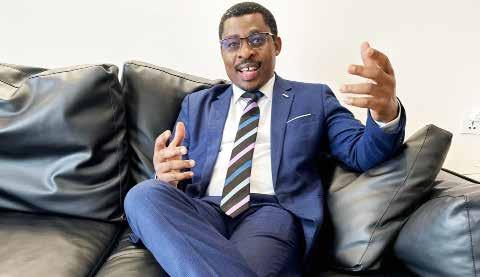
It is a truism that law reports are at the heart of legal practice in the Common Law Jurisdiction, where Lawyers and Judges rely heavily on decided cases and precedent in litigation. For decades, legal practitioners and judicial officers had to tediously scour through, find and cite authorities from printed law reports and books. But, about 20 years ago, a young, intelligent and energetic Electronic and Electrical Engineer, ope olugasa, the Founder and cEo of LawPavilion, saw a huge challenge in the legal industry and took the initiative to address it frontally. Thus, LawPavilion electronic Law Reports was born, and from humble beginnings the idea has blossomed into a vast outfit and resource engine, which provides numerous legal aI solutions, the deployment of which makes the work of Lawyers and Judges more efficient and accurate, resulting in LawPavilion Products becoming indispensable. Last weekend, onikepo Braithwaite and Jude Igbanoi caught up with Mr Olugasa and travelled with him on the journey from the humble beginnings of LawPavilion, to the aI Giant that it has become today
You started LawPavilion 20 years ago at a time, when electronic law reporting wasn’t the norm, at least, not in Nigeria. Today, LawPavilion has become so popular with Lawyers and Judges, that it is now even cited at the Supreme Court. Are you a Lawyer? How did you get into Legal AI? Take us through your journey to the top in the past two decades. What have been the highs and lows on this journey?
Let me start by acknowledging that it was purely by the grace of God. I’m not a Lawyer - I studied Electronic and Electrical Engineering, and my background is in software engineering. However, growing up, I’d always had an interest in justice and equity. I was always willing to stand up for the oppressed. This yearning was so strong that during my undergraduate days, I developed a keen interest in
“For us, it was a passion of patriotism, not minding what it would cost us. We participated at the International Bar Association (IBA) Conferences, proudly representing Nigeria among the committee of nations, showcasing our products. Our first exhibition at the IBA in Boston, earned us a subscription from the prestigious Harvard Law School that year”
law, and took some of my elective courses from the Faculty of Law. I spent some time reading law textbooks - not for exams, just out of personal interest. I had several friends who were law students, and while I was reading for interest, they were researching intensely, combing through indexes and volumes just to extract legal principles. I often wondered why there couldn’t be a less stressful, faster way to conduct legal research.
At the time, I wasn’t thinking about legal technology - I was simply drawn to the structure and reasoning in law. But, later, as I grew professionally in software and systems design, I began to reflect more deeply on how technology could enable justice delivery. That’s when I remembered the challenge I had observed in the law library: the time-consuming nature of legal research, and how that ineffi-
ciency could impact the broader justice system.
And, so, I thought - what if we could significantly reduce the time it takes for a Lawyer or Judge to carry out legal research? What if we could take a process that used to take two days and bring it down to five minutes - accurate, reliable, and authoritative? That was the spark that led to our first product: the LawPavilion Electronic Law Report (LPELR), pioneering Nigeria’s electronic law reporting that was not just a digitised content, but, one that could be cited in court just like the print versions.
Of course, at the time, this was between 2005 and 2007, electronic legal research wasn’t the norm in Nigeria. It wasn’t easy at first. Adoption was slow, and we spent years engaging Lawyers and institutions. In fact, I remember our first outing during the NBA Annual General Conference at Ilorin in 2007, some Lawyers made fun of our product,
saying that it would never see the light of the day in Nigeria, considering the highly conservative nature of the Legal Industry. We were resolute, and our response was “it's never a sprint, but a marathon, and we were prepared for the long haul”. We had those very low moments, discouraged by the difficulty of adoption at scale. We suffered series of rejections and disappointments, but, truly, God saw us through. I remember the day I went for a demo- presentation in one of the leading law firms. I was asked to search for “Quiet Enjoyment”, and the search engine could not find any authority. We were tactically ridiculed, and told to come back when we are more serious. We felt so bad and humiliated. That day, I promised my already discouraged colleague that we would so develop the product, that the same law firm would come looking for us. We turned “quiet enjoyment” into one of our yardsticks for evaluating the effectiveness of our search engine, and it worked so well. By the end of that year, the same law firm came looking for us. We never relented, we kept listening to feedback from the industry and kept pushing the boundaries of what was technologically possible. We were determined to give the Nigerian legal industry, the best solution available anywhere in the world. For us, it was a passion of patriotism, not minding what it would cost us. We participated at the International Bar Association (IBA) Conferences, proudly representing Nigeria among the committee of nations, showcasing our products. Our first exhibition at the IBA in Boston, earned us a subscription from the prestigious Harvard Law School that year. We were so excited and more determined to push the boundaries further! We ensured we improved the contents to become the most comprehensive legal database in Nigeria, and since then, we never looked back. It’s a culture of continuous innovation, and consistent improvement. Every year, we must come up with something new and now, Artificial Intelligence is the order of the day.
Our big break came between 2011 and 2012 when the Supreme Court and Court of Appeal subscribed to our solution, validating its relevance. I’m ever grateful to several Justices of the Supreme Court, Court of Appeal and High Courts (especially of the FCT, Ogun State and Lagos State) whose names are indelibly marked on the canvas of my mind, but, not sure if they would permit me to mention on the pages of the newspaper. Interestingly, it also
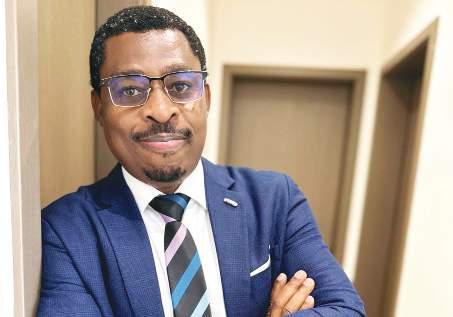
showed that the legal market wasn’t opposed to innovation — what they really needed was institutional acceptance. Since then, we’ve grown into a full legal tech company - building research platforms, court workflow systems, and most recently, PrimeGPT: Nigeria’s first indigenous Generative AI (Artificial Intelligence) legal drafting and research platform, launched in 2023.
The highs have been humbling - seeing our work cited before the Supreme Court, earning the trust of institutions, and more importantly, empowering Lawyers and legal professionals to become more efficient and impactful. The lows? Navigating scepticism, infrastructure challenges, and building credibility in a space where we were initially seen as outsiders. For example, we had to invest so much money into the development of secured offline E-Library, just to circumvent the challenge of low internet penetration in Nigeria at that time. Now, with better and more widespread internet connectivity nationwide, the online version is now more accessible and more acceptable.
But, I believe the beauty of innovation is in listening, learning, and building with the people
“One key reason our Case Management System, and indeed, all our products, resonate so deeply with the legal industry is that, we don't see ourselves as outsiders looking in; we see ourselves as part of the justice system….. We understand the real pain points faced by legal professionals, and our mission is to solve them intuitively, intelligently, and effectively”
you serve. And, though I am not a Lawyer, I consider it a privilege to be able to contribute meaningfully to the legal profession and the justice system in Nigeria, through technological innovation.
Kindly give us an overview of the Applications that LawPavilion offers. Your Case Management App seems to be very well received. What is so special about it?
At LawPavilion, we offer a suite of intelligent legal technology applications designed to support legal professionals, courts, and government agencies in delivering justice more efficiently. Our solutions include digital libraries and e-publishing services that simplify access to legal knowledge - LawPavilion Prime and Primsol (the online version); AI-powered legal research assistant PrimsolGPT and PrimeGPT, workflow automation tools for courts, law firms, Ministries of Justice and legal departments (CourtManager and CaseManager).
One key reason our Case Management System, and indeed, all our products, resonate so deeply with the legal industry is that we don't see ourselves as outsiders looking in; we see ourselves as part of the justice system. That perspective shapes everything we build. We understand the real pain points faced by legal professionals, and our mission is to solve them intuitively, intelligently, and effectively.
Recently, we improved our CaseManager for law firms into more than just a case tracking tool - it’s now a fully integrated solution that combines case management with Organisational Knowledge Management (OKM). This means Lawyers can not only manage their matters and
documents efficiently, but also tap into the firm’s collective knowledge and past experiences when handling similar cases. It’s designed to reduce duplication of effort, preserve institutional memory, and enhance the quality of legal research and service delivery within the firm, while maintaining consistency and quality of service.
Our CaseManager MoJ (CMS MoJ) is a tailored case management system specifically designed for Ministries of Justice, to help align their day-to-day operations for institutional performance and excellence. What makes the CMS MoJ truly special, is its ability to centralise and streamline legal and administrative workflows, across various departments and directorates in the Ministry of Justice. CMS MoJ provides real-time oversight, with a specialised dashboard for key decision-makers like the AttorneyGeneral, Permanent Secretary, and Directors, allowing them to track case progress, monitor departmental performance through KPIs, and gain deep visibility into overall Ministry operations. With remote accessibility built in, it empowers legal teams to manage processes on the go, supporting efficiency, accuracy, and transparency.
At LawPavilion, we are consistently driven by our commitment to accelerating access to justice, so innovation isn’t just about building tools; it’s about creating systems that make justice faster, fairer, and more accessible for all. For example, we are currently collaborating with the Administration of Criminal Justice Monitoring Committee (ACJMC) to enhance full implementation and proper monitoring of the Administration of Criminal Justice Act, by unifying previously fragmented systems within Nigeria’s criminal
justice process into a cohesive, modern justice ecosystem that delivers timely and fair outcomes, thereby rebuilding public trust in the rule of law.
Through real-time case tracking, centralised data analytics, and seamless collaboration among the criminal justice stakeholders, the ACJMC portal tackles delays, eliminates data inconsistencies, and ensures greater accountability. Most importantly, it protects the rights of all citizens, fully aligning with the provisions of the Administration of Criminal Justice Act (ACJA).
What Apps do you have especially for judicial officers?
In some jurisdictions there are apps to review judgements to determine that they are correct, while some even use AI to assist judicial officers in writing their judgements. What do you have in this regard?
Yes, we have developed tailored solutions specifically for judicial officers, with the aim of supporting their efficiency, accuracy, and access to relevant legal insights. Two standout innovations in this regard are the Appellate Feedback System for Judges (AFSJ) and our PrimeGPT for Judges.
We developed a version of our AI product, PrimeGPT, trained specifically for Judges. This tool allows judicial officers to upload written submissions from Counsel, and the system helps by summarising the arguments, harmonising the issues for determination raised by the Counsel, suggesting issues for determination to be considered by the Judge, and even proposing legal opinions on each of the issues for determination, supported by relevant authorities and reasons for the suggested opinions. It’s not a replacement for judicial reasoning - far from it. Rather, it’s a decision support tool, that assists Judges in handling complex caseloads with greater efficiency and legal clarity.
The Appellate Feedback System for Judges (AFSJ) is a unique performance and feedback tool, designed to give Judges real-time insights into how their judgements fare on appeal. It tracks and reports whether a lower court’s judgement has been upheld, modified, or overturned at the appellate level. This kind of feedback is not only crucial for continuous judicial improvement, but it also promotes self-awareness and consistency in legal reasoning across court hierarchies. It empowers Judges with data on how their decisions are being reviewed, which is rare in most jurisdictions.
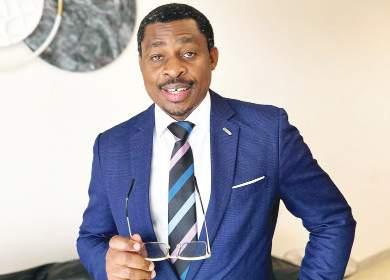
How have your Apps contributed to making law practice more efficient generally?
Our suite of applications has played a central role, in enhancing efficiency across various segments of legal practice. Each solution was thoughtfully developed to address specific challenges faced by Lawyers, Judges, and legal institutions.
Our E-Library, for example, houses not just our electronic law report, but also statutes, subsidiary legislation, court rules, regulations, court forms, and precedents. It enables practitioners to conduct comprehensive legal research in a single environment - quickly, accurately, and without the constraints of physical libraries.
We’ve also deployed the Case Management System which helps streamline the workflow process, ensures coordinated case tracking across departments, and enables seamless document management and performance monitoringempowering Lawyers to deliver more effectively.
In support of institutional reforms, we developed the LPPC Portal, which has revolutionised the process of applying for the rank of Senior Advocate of Nigeria (SAN). The once tedious and paper-heavy process is now digi-
“Our solutions include digital libraries and epublishing services that simplify access to legal knowledge - LawPavilion Prime and Primsol (the online version); AI-powered legal research assistant PrimsolGPT and PrimeGPT, work flow automation tools for courts, law firms, Ministries of Justice and legal departments (CourtManager and CaseManager)”
tised and transparent, improving the integrity and efficiency of the SAN conferment process. A very big thanks to the LPPC and of course, the Supreme Court for this innovative feat.
In collaboration with the Nigerian Bar Association, we created a system that allows Lawyers to electronically append their NBA Stamp and Seal directly onto court processes and legal documents from their devices. This has saved considerable time and eliminated the inefficiencies associated with first drafting, printing, physically stamping, and then scanning for e-filing at the court.
PrimeGPT and PrimsolGPT allow Lawyers and Judges to interact with legal material, using intelligent prompts. It goes beyond a keyword search to provide contextual legal guidance, generate arguments, analyse submissions, and even draft opinions backed by legal authorities - reducing research time dramatically. The solution also helps, with drafting of originating applications.
The Organisational Knowledge Management (OKM), an AI-enabled solution that helps law firms capture and reuse institutional memory. Rather than just digitising files, OKM allows users to leverage the firm’s collective experience - past cases, arguments, and outcomes stored in the organisation, thus, learning not just from the law, but from the combined wisdom of their teams.
Do you have any applications for document/contract review or predictive analytics to predict outcomes of cases? Some argue that predictive analytics in Nigerian cases may not be useful or efficient,
as we are fraught with a bevy of conflicting judgements on the same subject-matters. Is this true?
At the moment, we don’t offer a standalone app for contract or document review, although our PrimeGPT for Judges already performs some document analysis by reviewing written addresses, summarising key issues, and offering informed, authority-backed opinions. A dedicated contract review solution is currently in development, and will soon be available. It will take the industry by storm. We are already excited by the possibilities it promises. It will help legal practitioners to see what was previously unseen, in order to act in ways that were previously impossible.
As for predictive analytics, while we don’t have a statistical prediction tool yet, our PrimeGPT offers a more context-sensitive alternative. When fed the facts of a case, it can identify likely issues for determination and present how courts have typically resolved similar issues - all while grounding its responses in relevant legal authorities. It’s not prediction in the strict sense, but, it provides Lawyers with a clearer sense of litigation direction, aiding strategy and improving confidence in legal decision-making.
Your company has found its way into the international legal space. You feature at every Conference of the International Bar Association, despite the huge costs. Tell us about the acceptance of LawPavilion in other jurisdictions, and how successfully you have been able to penetrate them?
Yes, we have made deliberate efforts to extend our impact beyond Nigeria, and our consistent presence at the International Bar Association
(IBA) Conferences is part of that strategic outreach. While the cost of participating in such global platforms is considerable, we see it as a necessary investment in visibility, credibility, and learning. But, more importantly, it’s an opportunity to promote the Nigeria brand in legal context.
Our reception in other jurisdictions has been encouraging. We’ve had several clients in the UK, Ghana, Gambia, South Africa, etc. What stands out is that, many legal systems, regardless of location, face similar challenges - delayed justice delivery, manual processes, and inefficient research systems. Our solutions, especially our PrimeGPT and enterprise platforms, have generated interest for their practical applicability and our proven track record back home.
We may not yet claim deep penetration across all jurisdictions, but we've certainly earned recognition as a serious player in legal innovation. We’ve had pilot conversations and collaborations in parts of Africa, and are exploring opportunities for tailored deployments in Commonwealth countries, particularly where legal systems share a similar foundation.
What is your assessment of the role of AI in Legal Practice and how Nigeria is faring? AI has its benefits, but, some legal practitioners fear that AI could replace the role of Lawyers and render them redundant. Is this fear reasonable or baseless?
The initial reception of AI in Nigeria’s legal sector, was understandably slow. When we first launched our PrimeGPT, there was scepticism, with some suggesting it wouldn't last. But, by 2024, the conversation had shifted - not about whether to use AI, but which AI to use. Most available models were trained on foreign jurisdictions and general contents, so, when we introduced the 'Ask a Question' feature on our PrimeGPT, specifically tailored to Nigerian jurisprudence, it was seen as a timely and much-needed solution.
Concerns about AI replacing Lawyers, are often overstated. A helpful way to understand AI’s place in legal practice is this: AI can perform about 30% of a Lawyer’s work, and do it 100 times faster and better. But, it cannot replace the remaining 70%, which requires human judgement, empathy, advocacy, and ethical reasoning. Smart Lawyers are those who allow AI to handle the 30%, and focus their expertise on the rest. So, it’s not
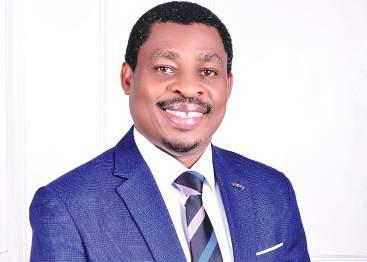
AI that will take Lawyers' jobs; it’s Lawyers who leverage on AI that will outpace and possibly, replace those who don’t.
More so, at LawPavilion, we've seen firsthand how AI is not just supporting Lawyers, but creating entirely new roles. We now have legal professionals working as AI trainers - helping shape how the system interprets and applies Nigerian law. That’s the future: not replacement, but reinvention and rearrangement of roles.
Have you had challenges with plagiarism and hacking? How do you protect your products?
Plagiarism, in our context, is often interpreted as the unauthorised replication or adaptation of our proprietary content, such as our editorial notes, legal summaries, or the structure of our platforms. While we have encountered attempts at imitation, we rely on our continuous innovation, market trust, and legal protections, including copyright, to maintain our lead. Our citation formats are publicly available for legal referencing, and the industry is structured in a way that encourages proper attribution in legal writing.
On the issue of hacking, we take data protection and platform security very seriously. All our solutions are hosted on secure
“Yes, we have developed tailored solutions specifically for judicial officers, with the aim of supporting their efficiency, accuracy, and access to relevant legal insights. Two standout innovations in this regard are the Appellate Feedback System for Judges (AFSJ) and our PrimeGPT for Judges”
servers, and we adhere to global best practices in cybersecurity to ensure our systems are not breached. Regular audits, encryption protocols, and user authentication processes are part of our security infrastructure.
How can technology, LawPavilion particularly, enhance access to justice for the common man and be useful to him/her? Is it affordable, because some have complained about the high cost of your products. Would you say that is a fair complaint?
At LawPavilion, our vision is to equip the justice system to enable people and businesses achieve their potential. That means we are deeply invested in ensuring that justice is not only available, but accessible - both to the professionals who deliver it, and to the citizens who need it.
When people raise concerns about the cost of our solutions, it's important to clarify who we're talking about. For our primary users - Judges, Lawyers, and legal institutions - the value far outweighs the cost. Compared to the resources required to build and maintain a standard physical law library, or the hours spent managing manual processes, our solutions offer a significantly more efficient, scalable, and cost-effective alternative. Even in monetary terms, we’ve ensured our pricing is fair and competitive. To put things in perspective: during a recent visit to East Africa, I discovered that their legal AI models cost nearly five times more than ours - yet, without offering the kind of contextual accuracy and depth that our PrimeGPT provides. So, yes, we can categorically say our pricing is fair, especially for the value
it delivers. We also offer flexible plans to suit different user needs, without compromising quality. For the common man, however, the barrier is often not financial - it is informational. What tends to keep people from justice is not the cost of our tools, but a lack of knowledge about their rights, obligations, and options. That’s why we developed JustEase, a social-legal educational mobile app where users can learn the law in simple terms, connect with Lawyers, and report rights violations to the appropriate agencies. The app is free to download on the Play Store, and it’s our way of making sure that justice starts with awareness and is accessible to every Nigerian, not just the elite. What, in your view, is the Future of Legal Tech in Africa and the role LawPavilion hopes to play?
The future of Legal Tech in Africa, is incredibly promising. With increasing internet penetration, a growing middle class, and a rising demand for efficiency, technology will transform the legal landscape. Legal Tech solutions will help address longstanding issues like access to justice, delayed case resolutions, and the high cost of legal services, making the justice system more transparent and accessible. This will help foster adherence to rule of law. The end result of this is an egalitarian society, with economic emancipation and enhanced ease of doing business.
At LawPavilion, our role is clear - we aim to remain at the forefront of innovation, building context-aware solutions that speak directly to Africa’s legal realities. From AI-powered research tools to justice access platforms for citizens and smart contracts, we are not just shaping the future - we are building it, with Africa in mind.
Thank you.
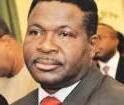
Introduction
Recently, I outlined the facts of Sunday Jackson’s case, and briefly reviewed the Apex Court’s decision-pointing out the areas that raised some disquiet, particularly the court’s misapplication of the principle of self-defence in our criminal jurisprudence. Today, we shall continue with same highlighting the perception that the decision reflects a failure of substantial judgement and miscomprehension of the facts and the court’s failure to take cognisance of the lingering herdsmen-farmers crisis. After which we shall x-ray of factors therein. Enjoy.
Overview of the Supreme Court Judgement: Points of Concern (Continues)
3. Failure of Substantial Justice and Misjudgement of Facts
The Supreme Court’s approach to Jackson’s case, represents a deeper judicial failure: the substitution of presumed scenarios for proven facts. The court’s analysis, was built on the mental construction of a disarmed aggressor lying harmlessly before a free and unthreatened Jackson. This imaginary scene contradicts Jackson’s account, which described a wrestling struggle during which he gained control of the weapon in a moment of sheer survival.
The court overlooked the critical fact that, Jackson and his attacker remained in physical contact throughout the ordeal. In such close quarters, it is unrealistic to presume Jackson had the luxury of time or physical ability to disengage, without first ensuring his own safety by incapacitating his assailant. Additionally, the court failed to reckon with the reasonable fear that, the attacker still within reach, could have reclaimed the weapon, or grabbed any other weapon within reach (for example, a piece of rock, tree branch, etc) and attacked Jackson.
Even the court’s suo motu exploration of the defence of provocation was, with respect, mishandled. Although it recognised that Jackson acted in the heat of passion and under grave provocation, it however, concluded erroneously that there was sufficient time for his passion to have cooled. This is a legal fiction unsupported by the chronology of events, as admitted in Jackson’s confessional statement.
In dismissing the defence of provocation, the court claimed Jackson’s passion had cooled. But, how could it have? The entire incident happened in a blur of chaos; in the heat of the moment when reason had vacated its seat, and when there was no time for passion to have cooled down. This was not a pre-meditated or calculated revenge; it was a reflex action for survival. And, the law is supposed to understand that.
4. Failure of the Supreme Court to take Judicial Notice of the lingering FarmerHerder Crisis in Assessing the Defence of Self-Defence
In affirming the conviction and death sentence of Sunday Jackson, the Supreme Court appeared to have approached the case in a vacuum, as though the incident took place in a socially and historically neutral setting. It made no reference whatsoever, to the widely recognised and ongoing farmers-herders conflict that has plagued communities across Adamawa State and much of Nigeria’s Middle Belt, South-West, South-South and South-East. This oversight is striking, particularly given that Jackson’s alleged assailant, a herder, confronted him in a rural bush area, a pattern consistent with the violent clashes that have led to hundreds of deaths and displacements in the region.
Under Section 124 of the Evidence Act, Nigerian courts are permitted and indeed, expected to take judicial notice of facts that are so notorious or

well-known that they are not reasonably open to question. The farmers-herders conflict, and the tension and hostility they generate in affected communities, fall squarely within this category.
The Supreme Court’s failure to contextualise Jackson’s fear and response within this reality, deprived the case of necessary social, sociological and historical nuance.
The court ought to have appreciated that Jackson, being part of a vulnerable and frequently targeted farming community, would have reasonably perceived any sudden attack from a known herder as a mortal threat. By ignoring this critical background, the judgement appears detached from the lived experiences of rural Nigerians, and fails to reflect the court’s obligation to administer justice not merely according to the letter of the law, but in alignment with the broader circumstances that inform human behaviour.
The Supreme Court had a chance, a golden opportunity, to expand Nigerian jurisprudence on self-defence: To recognise that not all threats come with time to think; that a farmer attacked on his own land should not be condemned for failing to flee; that justice must take into account the real-life context in which people act, not just the sterile pages of law books.
The Defences of Self-Defence and Provocation
What is self-defence under the Nigerian Law?
Self-defence is the protection of one’s person or property (Section 289 Criminal Code (CC), against some injury attempted by another. This right is recognised on the basis that, it constitutes a lawful justification for the use of force in repelling an assault against one’s
“The Supreme Court’s failure to contextualise Jackson’s fear and response within this reality, deprived the case of necessary social, sociological and historical nuance….The court ought to have appreciated that Jackson, being part of a vulnerable and frequently targeted farming community, would have reasonably perceived any sudden attack from a known herder as a mortal threat”
person (Section 32(3) Criminal Code). In the Penal Code, it is also referred to as private defence (Section 59 Penal Code (PC) In the usual course of law, the use of such force would constitute a criminal offence; however, it is deemed justified under the doctrine of self-defence (John v The State [2012] 7 NWLR (Pt.1299) 336 C.A).
In EKPOUDO v THE STATE (2021) LPELR-52826(CA), the Court of Appeal defined self-defence as; “the use of force to protect oneself, one's family or one's property from a real or threatened attack”. Typically, a person is justified in using a reasonable degree of force in self-defence, when they have a reasonable belief that imminent bodily harm is threatened, and that such force is necessary to prevent the danger.
Section 32(3) of the Criminal Code stipulates that a person shall not be held criminally liable for an act, if it is reasonably necessary to resist actual and unlawful violence directed at themselves or another individual in their presence.
To activate the above section, the Apex Court in UWAEKWEGHINYA v THE STATE (2005) 9 NWLR (PT. 930) 27, the Supreme Court held that “Where a person kills another in defence of himself, such a killing is excused, and it does not amount to manslaughter under the Criminal Code or Culpable Homicide not punishable with death under the Penal Code. The defence of self-defence is a complete defence under the Criminal Code and the Penal Code, and a successful defence of self-defence leads to the discharge and acquittal of the accused person”.
This position was also reiterated in the case of LAWALI v STATE (2021) LPELR-56431 where the Court of Appeal opined as follows:
“The Law is that, if the intention of an accused person in doing an unlawful act was not to kill or cause grievous harm, but the act resulted in the death of a person, a verdict of culpable homicide not punishable with death will be returned. This is in line with the provisions of Section 222(4) of the Penal Code which states that, culpable homicide is not punishable with death if it is committed without premeditation in a sudden
fight in the heat of passion upon a sudden quarrel, and without the offender having taken undue advantage or acted in a cruel or unusual manner”.
The consequence of this is that self-defence is constitutionally afforded to an individual who is attacked by another, serving as a necessary defence, with specific elements that must be demonstrated or proven in order to succeed in the claim.
In order for the plea of self-defence to succeed, the following must be present as outlined by the Supreme Court in RASHEED AMINU v THE STATE ((2019) 7 NWLR (pt.1672) 481). They constitute the requisite ingredients of self-defence under Section 32(3) of the Criminal Code to wit:
a. That the victim was attacking or about to attack the Defendant in a manner that grievous hurt and or death was possible, thus, he had to defend himself.
b. That the self-defence was instantaneous and contemporaneous with threatened attack.
c. That the mode of defence was not greater or disproportionate with the threatened attack. To elaborate further on self-defence under the Penal Code, the Apex Court in MOHAMMAD v THE STATE ((2019) 4 NWLR (pt. 1661) 98 at 101) adopted the ingredients laid down in RASHEED AMINU v THE STATE ((2019) 7 NWLR (PT.1627) 481). This obviously evidenced that the ingredients of self–defence under the Criminal Code and Penal Code are the same. The Court of Appeal in MOHAMMED v STATE (2020) LPELR-50919(CA) held that:
"The defence of self-defence, is clearly a child of necessity. It is a defence that is not pleaded as a matter of course, but, one in which the Defendant is expected to establish that he was at the time of the killing, in reasonable apprehension of death to himself or grievous harm, and that it was necessary at the time to use the force which resulted in the death of the deceased in order to preserve his life. As an important aspect of the force used by the Defendant, must be shown to be proportionate to the force used or imminently threatened against him and reasonable in the circumstances in which it was used. The defence of self-defence, of course, is not available where the person attacked used a greater degree of force than was necessary in repelling the attack".
The defence of provocation, which can reduce a murder charge to manslaughter, was also considered. The law recognises provocation where:
1. The accused was provoked by a sudden and grave act.
2. The provocation deprived the accused of self-control.
3. The act of killing occurred before time to regain composure.
The Supreme Court in the Jackson case, acknowledged that being stabbed could amount to grave provocation. But, it held that Jackson, having overpowered his attacker, had time, however brief, to calm down. Thus, the Court concluded that he acted not in the heat of passion, but in calculated retaliation.
It must be pointed out that, this standard fails to appreciate the psychological and physiological state of someone who has just survived a violent, near-death encounter. Expecting dispassionate judgement in such moments is unrealistic, especially when such expectation is judged from a removed, academic standpoint.
The Dissenting Opinion: A Voice of Moderation
Many a time, events or decisions can appear entirely reasonable when outlined on paper neatly justified by logic, data, or policy. But, the moment a human face is attached to that same event, the perspective shifts. What once seemed like a practical or even necessary action can suddenly feel personal, emotional, and far more complex. Numbers do not cry. Statistics do not have families. But, people do. And, when the abstract becomes tangible, when names replace case numbers and stories replace bullet points, we are reminded that reason alone is not always enough we need empathy, too. (To be continued)
THOUGHT FOR THE WEEK
“At his best, man is the noblest of all animals; separated from law and justice he is the worst”. (Aristotle).
Acting Group Politics Editor DEJI ELUMOYE
Email: deji.elumoye@thisdaylive.com
08033025611 sms only
Fidelis David reports that the a ppeal Court’s judgment which further legitimized Governor Lucky a iyedatiwa’s victory in the November 16, 2024, gubernatorial poll in Ondo State has significant implication for his administration.
In Nigeria, court processes challenging a governor’s election have hinder his ability to implement projects and policies, leading to delays and stagnation in development.
Superficially, practical instances include that of Governor Abba Yusuf of Kano State who was initially sacked by the Kano State Governorship Election Petitions Tribunal and the Court of Appeal, but later had the judgment upturned in his favour at the Supreme Court.
These court cases created uncertainty about the governor’s legitimacy, potentially leading to instability and affecting electorate’s confidence.
Political pundits also believe that the governor’s focus on addressing the lawsuit may divert his attention from pressing governance issues, leading to inadequate service delivery.
In a significant development in Ondo State politics, the Appeal Court sitting in Akure last week dismissed a suit challenging Governor Lucky Aiyedatiwa’s victory in the November 16, 2024, governorship election.
Court’s Unanimous Decision
The court’s unanimous judgment, delivered by Justice Oyebisi Omoleye, affirmed the earlier decision of the Federal High Court, which dismissed the suit filed by the New Nigeria Peoples Party (NNPP) candidate, Olugbenga Edema.
The NNPP candidate had challenged the validity of the primary that produced Aiyedatiwa as the candidate of the All Progressives Congress (APC). Edema sought the court’s order to compel the Independent National Electoral Commission (INEC) to withdraw the nomination and publication of Aiyedatiwa’s name as a candidate.
The Federal High Court however dismissed the suit, and the Appeal Court upheld this decision.
The Appeal Court’s judgment has significant implication for Governor Aiyedatiwa’s administration. With the court dismissing the appeal for lack of merit and awarding a fine of N1 million to each of the respondents, Aiyedatiwa’s victory has been further legitimized.
Stakeholders’ Reaction
As he begins the new term, Aiyedatiwa has emphasized that his victory belongs to all Ondo people, and he is committed to working towards the progress and development of the state.
His Ekiti State counterpart, Biodun Oyebanji has congratulated him on his victory, describing it as a confidence vote in President Bola Tinubu’s leadership. Oyebanji also commended the people of Ondo State for conducting themselves in a peaceful and orderly manner during the election.
Reacting to the decision of the court, Remi Olatubora (SAN) said the case filed by Edema constituted abuse of court process since a similar case had earlier been dismissed by the same appeal court.
He said: “Going forward, our system must be reformed in such a way that a suit like this one should never be permitted in the first instance. This is a case of an individual who contested the election as the candidate of NNPP and now came to court after the conclusion of the election to challenge Aiyedatiwa, who was declared the winner of the election on the platform of APC.
“I feel that our law should not allow this kind of suit, and you can imagine the amount of time we have expended in litigating this case at the Federal High Court and subsequently at the Court of Appeal. The joy of it is that justice has been done and the case has been dismissed with a cost of N1 million to each respondent”. Similarly, the State Attorney General and Commissioner for Justice, Dr Kayode Ajulo (SAN) who witnessed the hearing and judgment of the suit, saluted the industry and courage of the judges, saying he agreed with the decision
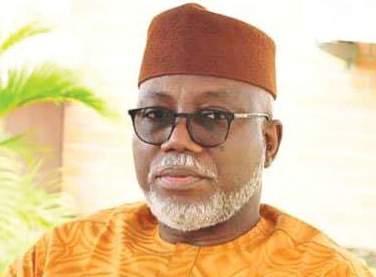
of the court.
“One cannot but salute the industry and courage of the judges. I was in the court from the beginning to the end. You can see the erudition and the research that can sum up the judgment. On the judgment, I think we will need to first see this as another reaffirmation of the mandate of the people reposed on the governor of the state, Dr. Lucky Orimisan Aiyedatiwa.
“We have been saying it; the 18–0 is not a fluke, and this has been reaffirmed again. One just needs to salute the courage of the whole people of this state. Both the appellant and the respondent are citizens of this state.
“I have been saying this: there must be an end to this litigation; the people have spoken, and they spoke clearly. Using any other means, running from pillar to post, will not help; we belong to the same family, and we need to come together. What we should be discussing now is to see how we can move Ondo State forward, not with this endless
litigation. Going further is a waste of time”, Ajulo added.
Edema’s Resignation
In a dramatic twist, Olugbenga Ederna in a letter dated 9th May, 2025 addressed to the Chairman of NNPP in Mahin Ward 11 in Ilaje Local Government Area resigned his membership of the party forthwith.
Edema in the letter said “Since joining the party in June, 2024, the party has been characterised with internal wranglings and rancour that have stunted the growth of the party; this is not healthy for any serious-minded party that intends to win elections, which is the major objective of all political parties.
“Furthermore, the activities of the leadership of the party negates the ethos of political parties; which is to form Government at various levels.
“Since my over 35 years in active political party participation, I have never seen a political party with a leadership so treacherous to the extent of frustrating its candidate by withdrawing a legitimate case in court in favour of an opposing party against its candidate. It is apparent that the objective of the party is radically
The implication of Edema’s action is that he will no longer proceed to the s upreme court to challenge the judgment of the appellate court. Also, with the legal challenge out of the way, Governor Aiyedatiwa can now focus on delivering his campaign promises to the people of o ndo s tate through effective governance.
different from the above stated objectives of any serious-minded political party.
“From the foregoing, it is obvious that I am not on the same page with the leadership of the party as to what a party’s objectives and values should be. By this letter therefore, I hereby cease to be a member of the New Nigeria People’s Party with effect from today, 09th May, 2025.”
Implication for Aiyedatiwa’s Govt
The implication of Edema’s action is that he will no longer proceed to the Supreme court to challenge the judgment of the appellate court.
Also, with the legal challenge out of the way, Governor Aiyedatiwa can now focus on delivering his campaign promises to the people of Ondo State through effective governance.
As Ondo State embarks on this new journey vis-a-vis the appellate court judgment, the people can look forward to a brighter future, with Governor Aiyedatiwa at the helm, working tirelessly to deliver on his campaign promises and improve the lives of all Ondo people.
It’s worth noting that Aiyedatiwa has already started implementing policies and programs, including paying salary arrears and approving funds for infrastructure development.
Specifically, some of his notable achievements include, employment of over 1,000 primary school teachers, payment of January 2017 salary arrears to civil servants, releasing N850 million to Rufus Giwa Polytechnic Owo, paying N1.5 billion gratuity to retirees in the state, awarding N220 million loans to traders and artisans, among others.
Concerns
However, specific area where residents of the coastal state have criticized Aiyedatiwa’s administration is the alleged failure by the Governor in his constitutional duty to secure and protect citizens’ lives and property.
Nume Ekeghe
In a strategic effort to unlock the potential of Nigeria’s small and medium-sized enterprises (SMEs), Access Bank Plc has teamed up with global consultancy firm Deloitte to deliver a nationwide SME Business Clinic an initiative designed to support entrepreneurs with expert guidance, access to finance, and practical market insights.
Launched in Lagos and concurrently held in Abuja, the SME Business Clinic is scheduled to run across major Nigerian cities throughout the year. Themed, “Building a Resilient, Profitable and FutureReady Business in Nigeria,” the clinic aims to provide hands-on advisory services tailored to the operational realities of SMEs, from nano-enterprises to growth-stage businesses.
The event brought together over 50 Deloitte professionals, including auditors, tax
consultants, legal experts, and financial advisers, to offer personalised guidance to participating SMEs. These experts helped business owners tackle real-world issues such as regulatory compliance, tax structuring, cash flow management, and expansion strategy with a focus on making SMEs resilient in a volatile economic climate.
Senior Banking Advisor at Access Bank, Rob Giles, underscored the bank’s long-standing commitment to nurturing the SME ecosystem, noting that Access Bank currently serves over 7.5 million SME customers across the country.
“That’s a privilege, but also a massive responsibility,” Giles said. “At Access Bank, we only win if you win. Our business grows when your business grows.”
He emphasised that insights gathered over years of engagement with entrepreneurs have consistently pointed to three
major challenges: access to finance, access to markets, and access to the right information.
Also speaking at the event, Abiodun Olubitan, Group Head of SME Banking at Access Bank, highlighted the bank’s flexible approach to financing SMEs, especially those not yet ready for traditional lending models.
“We understand that at different stages of growth, SMEs might not be ready for big borrowings,” Olubitan explained. “That’s why we offer collateral-free loans based on the cash flow we see in your business. We analyse your sales trend and profile you for funding accordingly.”
Some of the entrepreneurs who attended the Lagos clinic described the experience as transformational.
Founder of Oge’s Closet and Hair Hub, Ogechi Eze, and a long-time Access Bank customer, praised the bank’s consistent support for her business.
United Bank for Africa (UBA) Plc, has reaffirmed its leadership position in fostering economic growth and empowerment as it clinched four major awards at the 2025 Development Bank of Nigeria (DBN) Service Ambassador Awards which held at the weekend in Lagos.
The prestigious awards, recognises financial institutions driving impactful support for Micro, Small, and Medium Enterprises (MSMEs) across Nigeria, and UBA emerge as top performer, coming tops in the following categories: DBM with the Highest Impact on MSMEs in Nigeria; DBM with the Highest Impact on Women MSMEs; PFI with the Highest Impact in the
North-Central Zone; and the Prestigious Platinum Service Ambassador Award, the highest award of the night.
UBA’s Deputy Managing Director, Mr. Muyiwa Akinyemi, who received the Platinum Service Ambassador Award on behalf of the bank, expressed his delight, stating; “We are deeply honoured to be recognised by the Development Bank of Nigeria for our efforts in driving sustainable growth and empowerment for MSMEs, particularly women-led businesses and enterprises in Nigeria.
These awards are a testament to our strategic focus on providing accessible financing, capacity building, and innovative solutions
that enable small businesses to thrive. We remain committed to fostering economic resilience and prosperity across Nigeria.”
Managing Director/CEO of the Development Bank of Nigeria, Dr. Tony Okpanachi, commended UBA’s outstanding contributions, saying: “UBA has consistently demonstrated exceptional dedication to alleviating financing constraints faced by MSMEs in Nigeria. Their impactful interventions, especially in supporting women entrepreneurs and underserved regions, align perfectly with DBN’s mandate. We celebrate UBA’s achievements and encourage them to continue setting benchmarks in MSME financing.”
Cascador, a leading accelerator for mid-stage Nigerian entrepreneurs, has disbursed over $3 million in debt funding to nine Nigerian startups to enhance their operations and accelerate their growth.
Nine Nigerian startups, out of over 60 applicants, emerged as recipients of the funding after a highly competitive pitch day event held in Lagos over the weekend, including Crop2Cash, Oriki, N.E.A.T, Adunni Organics, Sycamore, DoChase, Drive45, 24SEVEN, and ExCare.
According to Cascador CEO, Trish Thomas, “The funding is only available to alumni of
our Cascador program. There are about 60 companies now that have gone through the program. The nine finalists you see today have been awarded over $3 million in debt and equity.The selection process was a highly competitive one. We focused on companies with a proven track record, good operational management, and a trajectory for scaling social impact and operations.
“Interestingly, 74 per cent of applicants requested debt funding, indicating a strong preference for working capital over equity. This trend reflects the unique needs of Nigerian entrepreneurs, many of whom are seeking sustainable growth rather than rapid exit strate-
Olawale Ajimotokan in Abuja
Young innovators have urged improved connectivity as a crucial tool in bridging the information gap that hinders sustainable development, particularly in underserved communities.
This call to action was the decimal at the Global Accessibility Awareness Day (GAAD), held under the theme
“Accessible by Design: Inclusion Starts Here.”
The event brought together tech entrepreneurs, policy advocates, and communication experts to discuss the digital divide and the role of innovation in promoting inclusivity across Nigeria.
The highlight of the day was a panel discussion where speakers identified a lack of awareness, poor infrastructure, and limited access to digital resources as

gies.”
Earlier in his address, Cascador Founder Dave DeLicia highlighted the transformative power of the accelerator’s training, mentorship, and networking opportunities. He emphasised that these benefits hold even greater value than the funding itself.
According to him, “At Cascador, we’re looking for two key qualities: business acumen and discipline to execute scalable, sustainable companies that drive social impact. We’re sector-agnostic, with a diverse range of businesses, from cosmetics to microfinance banks. They’ll be competing for at least $3 million in funding.”
major challenges confronting youth-led innovation in the country.
Speaking at the event, Asma’u Abdullahi, the convener of the programme and Executive Director of Slumtech—a FinTech organisation, , focused on developing sustainable technologies for urban low-income communities—stressed the need for a more enabling environment for young innovators to thrive.
Kayode Tokede
The Minister of Finance and Coordinating Minister of the Economy Mr. Wale Edun, yesterday emphasized the crucial role of the capital market in achieving the nation’s ambitious goal of becoming a $1 trillion economy.
Speaking at the Capital Market Committee (CMC) meeting, Edun who was represented by Minister of State for Finance, Dr.
Doris Uzoka-Anite, highlighted the market’s transformation since 2015, with improvements in governance structures, new products and platforms, stronger regulatory environment, and growing investor participation.
According to the Minister, the Implementation of the Capital Market Master Plan (2015-2025), has been instrumental in increasing the market’s contribution to the national economy,
developing a sophisticated market structure, and improving competitiveness.
Edun said the revised plan prioritizes digitalization, innovation, sustainability, inclusion, and capital formation, aligning with the broader economic reform agenda.
He said the passage of the new act modernizes the legal and regulatory framework, streamlines enforcement
mechanisms, and provides clarity on emerging areas such as digital assets and crowdfunding.
On the challenges and opportunities inherent in the Act, the Minister said, it will help deepen market participation, as well as ensure regulatory coordination remain tight.
Speaking on the government private sector innovation in creating the needed environment for businesses to thrive, the
Minister noted that, the government is committed to creating an enabling environment for private sector innovation to flourish within a fair and transparent environment.
The Minister added that, the market is expected to contribute to the economy, serving not only for capital raising but also as a vehicle for wealth creation, economic inclusion, and long-term na-
tional resilience. He explained that, with the Securities and Exchange Commission undertaken regulatory reforms, including joining the GBMC Network of IOSCO in promoting and implementing ISSB Standards amongst others, the domestic economy has recorded the fastest GDP growth in about a decade in 2024, driven by a strong fourth quarter and improved fiscal position.
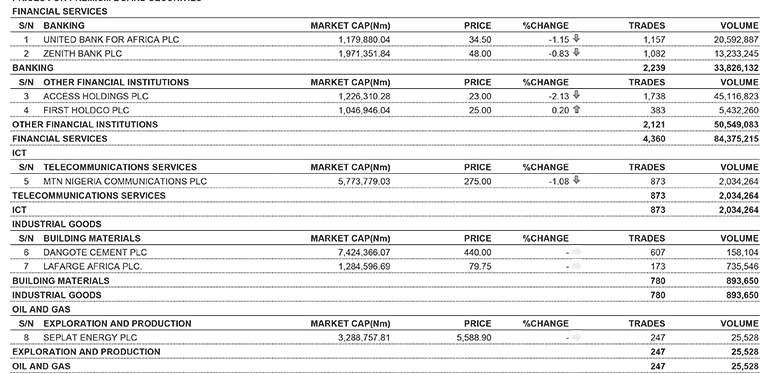
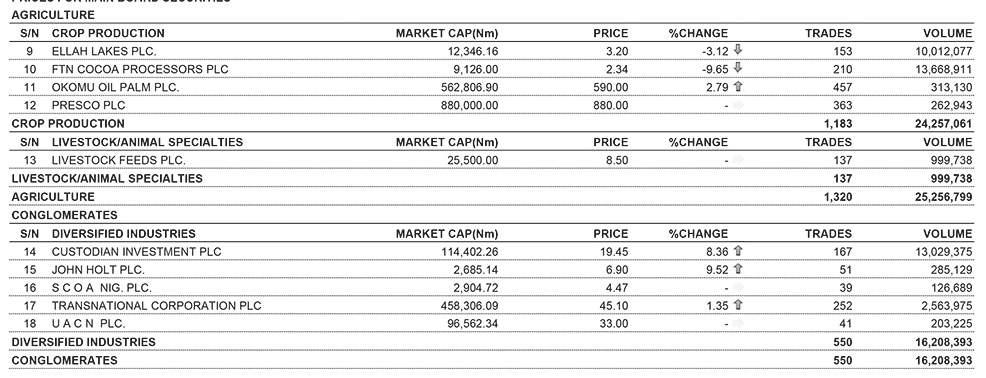
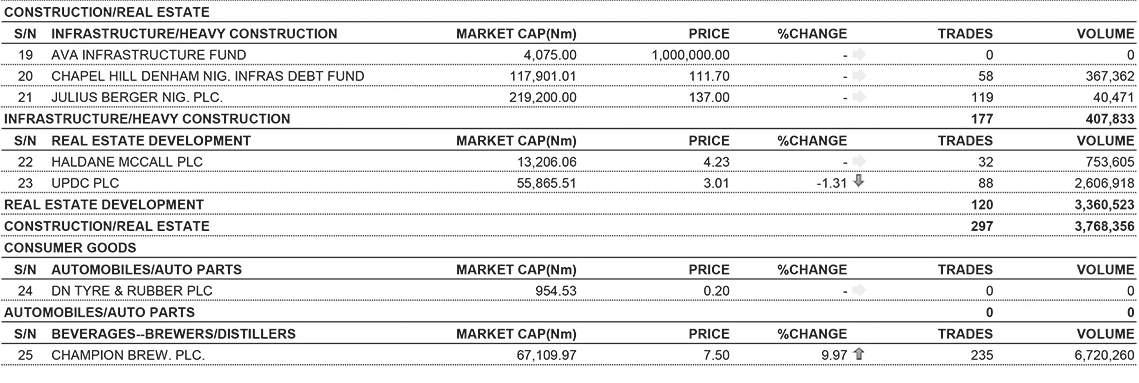
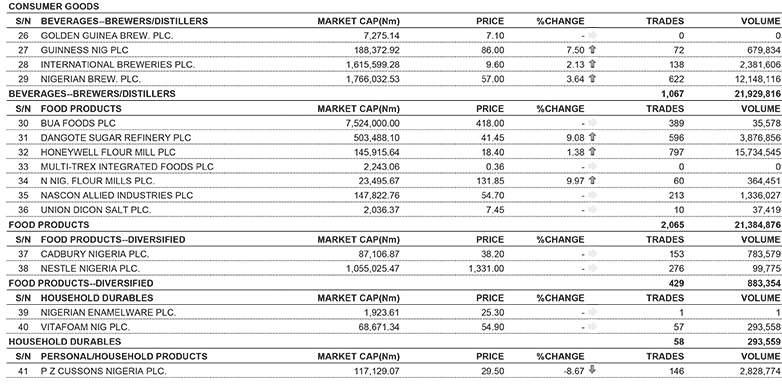

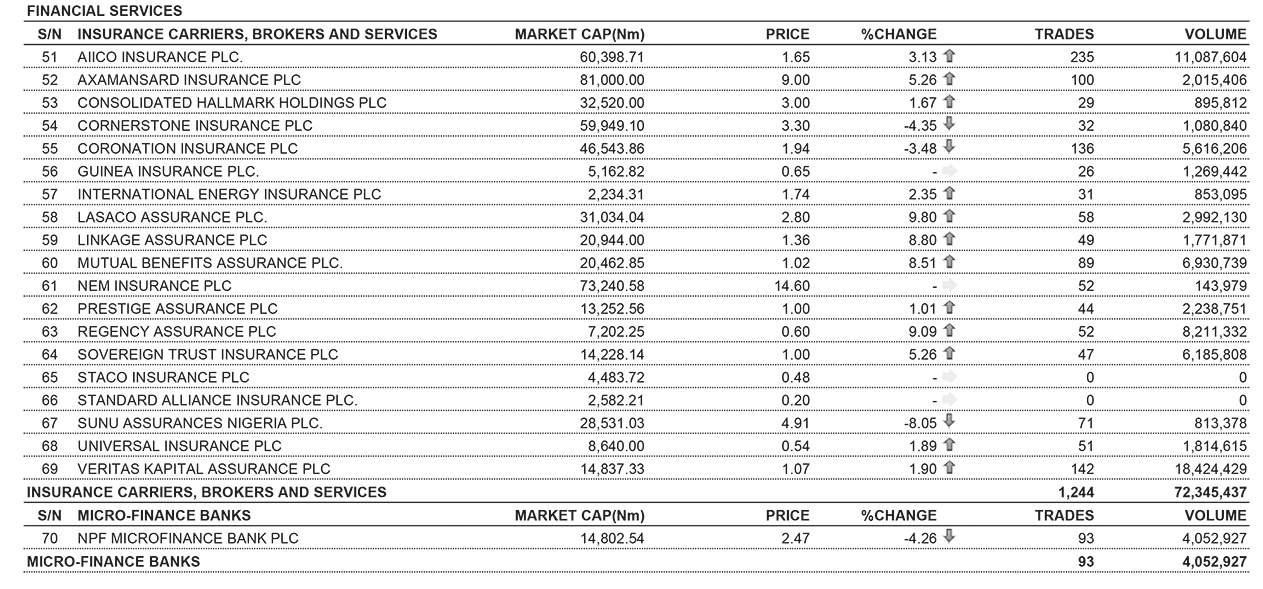

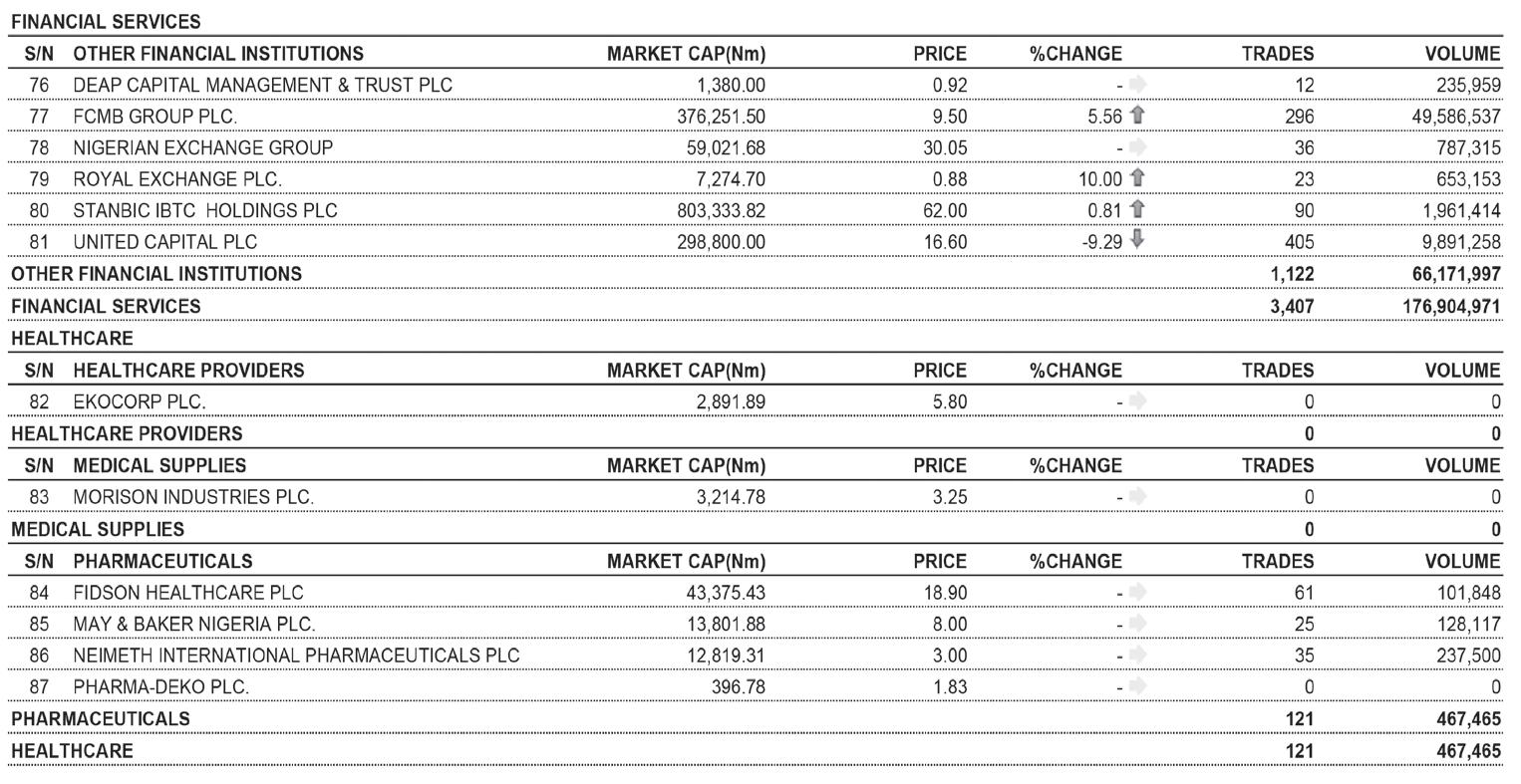
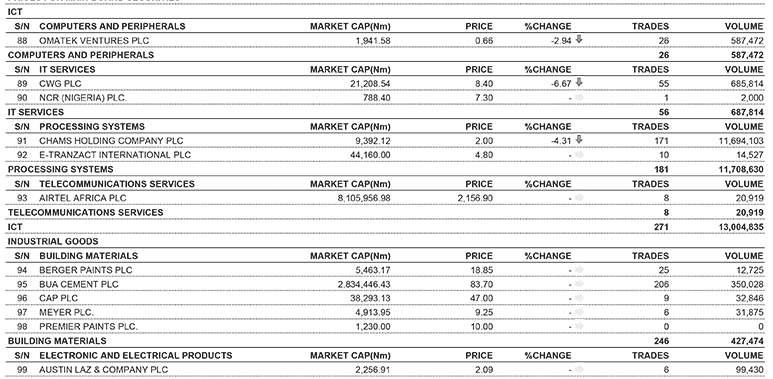

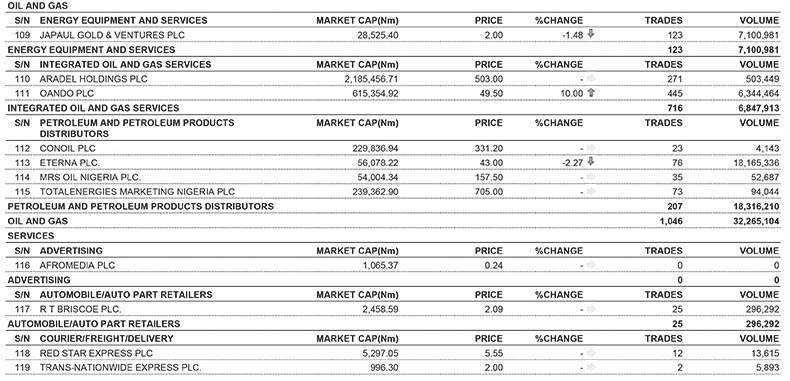

A Mutual fund (Unit Trust) is an investment vehicle managed by a SEC (Securities and Exchange Commission) registered Fund Manager. Investors with similar objectives buy units of the Fund so that the Fund Manager can buy securities that willl generate their desired return.
An ETF (Exchange Traded Fund) is a type of fund which owns the assets (shares of stock, bonds, oil futures, gold bars, foreign currency, etc.) and divides ownership of those assets into shares. Investors can buy these ‘shares’ on the
floor of the Nigerian Stock Exchange.
A REIT (Real Estate Investment Trust) is an investment vehicle that allows both small and large investors to part-own real estate ventures (eg. Offices, Houses, Hospitals) in proportion to their investments. The assets are divided into shares that are traded on the Nigerian Stock Exchange.
GUIDE TO DATA:
Date: All fund prices are quoted in Naira as at 15 May-2025, unless otherwise stated.
Chuks Okocha in abuja
The leadership of the Labour Party (LP) in Jere Ward in Jere South, Kaduna State, has affirmed that the factional national chairman, Senator Nenadi Usman is a registered member of the party. The Jere ward debunked recent claims questioning the membership status of distinguished Senator Nenadi Esther Usman in the party.
The declaration was made during a press conference held at FADA Polly Unite 006, convened by the Ward Chairman, Mr. Hussaini Lawal, alongside executive members of the ward.
In his address, Lawal described the reports alleging that Senator
Usman is not a member of the Labour Party as “false, malicious, and politically motivated.” He emphasised that Senator Usman is a fully registered and bonafide member of the Labour Party in Jere Ward, with her polling unit clearly documented as 006.
“Let it be known to all Nigerians that Senator Nenadi Usman is not just a member; she is a pillar of the Labour Party, not only in Jere Ward and Kaduna State but also across Nigeria,” Mr. Lawal said. “Her wealth of experience, leadership, and contributions to the party’s growth are invaluable.”
The leadership highlighted her long-standing commitment to national development, referencing her past roles as
Commissioner in Kaduna State, Minister of Finance of the Federal Republic of Nigeria, and Senator representing Southern Kaduna. Her current role as acting National Chairman of the Labour Party was also acknowledged with pride.
The press conference served to reaffirm her active membership and pivotal leadership within the party, while also issuing a strong warning to those propagating misinformation.
“Our records are clear and verifiable. We challenge anyone with contrary evidence to come forward. We will not allow political mischief makers to distract us from our mission to build a better Nigeria under the Labour Party,” Mr. Lawal stated.
Some concerned Elders and Youth of APC in Ekiti State led by Chief Olaofe Adeniran, have accused the Governor of the state, Biodun Oyebanji, of showing disdain, disrespect, and flagrant disobedience to President Bola Tinubu and the National Working Committee (NWC) of the party by setting up a 24-member Committee for his emergence as the adopted candidate of the party for the 2026 gubernatorial election.
The concerned elders and youths in a statement yesterday said contrary to the party’s guidelines that the NWC has
the responsibility to organise and oversee primary elections, Governor Oyebanji is, instead, closing the democratic space against eligible and competent party members in violation of the party’s guidelines and President Bola Tinubu’s directive on adherence to internal party democracy. They berated the governor for deliberately ignoring the directive of the president.
The group has, therefore, called on the national leader of the party, President Tinubu, the chairman of the party, Alhaji Umar Ganduje and other national leaders of the party to call Governor Oyebanji
to order to avoid an unpleasant backlash that could cost the party the state in 2026. The aggrieved party men expressed surprise at the premature action of self succession of the governor, especially when the Independence National Electoral Commission (INEC) has not issued any directive in this regard.
The group noted that the APC constitution, which should serve as a guiding document for the party’s internal affairs is specifically clear in matters relating to primary elections, pointing out that Section 20(1) of the APC constitution.
Mary Nnah
The Oniru of Iru Kingdom, Oba Abdulwasiu Omogbolahan Lawal, Abisogun II, has hailed Access Holdings for its contribution to infrastructure, security, and socio-economic development in Iruland, in Lagos State, describing the institution as a “true partner in progress.”
The monarch made this known during an official visit to Access Holdings headquarters in Lagos as part of his corporate appreciation tour marking the fifth anniversary of his
coronation.
The tour, which spans key institutions across Iru Kingdom, is aimed at appreciating stakeholders who have remained committed to the vision of building a prosperous and sustainable Iru Land under the #LeGIT agenda — Let’s Grow Iruland Together.
Oba Lawal said: “Access Holdings has, over the years, distinguished itself as a builder of futures. Your contributions go far beyond finance and include bold investments in infrastructure, education, entrepreneurship, and
urban transformation.”
He lauded the institution’s role in the Victoria Island–Lekki Traffic Circulation Project, noting that the initiative had drastically eased congestion and improved mobility in one of Lagos’ busiest corridors.
The monarch also used the occasion to request Access Holdings’ support in providing a dedicated Personal Power Supply (PPS) system to Iru Kingdom, a move he said would significantly improve energy access and stimulate further economic activities in the area.
The Awomamma Development Forum, an umbrella association of Awomamma indigenes both home and in Diaspora have sent a strongly worded petition to the Inspector General of Police(IG), Kayode Egbetokun as well as the Chief of Defence Staff, General Chris Musa, to urgently intervene in the continuous killing of their citizens under the guise of fighting insecurity.
In a letter signed by their Legal Adviser and Attorney, Barrister Obinna Amagwula and the Diaspora Representative,
Chris Ndedigwe, the community stated that whereas they were not opposed to the fight against bandits and kidnappers by the agents of the state, they can no longer watch while security agents backed by the state government continue to kill unarmed civilian citizens and bombing family houses which has gone on unabated for over three years now.
The petition which, was also copied to the Director General of the DSS as well as the Executive Governor of Imo state, condemned in particular
the recent shooting of one Mr. Vitus Mbah, a 60- year-old truck driver and gravel dealer who was shot right inside his truck.
The community wondered how the old man, who is well known as a focused gentleman in the villages, can be a bandit and why shoot soft targets instead of arresting and prosecuting suspects.
The community leaders said they may have to resort to self help to protect themselves if it becomes obvious that government cannot guarantee their safety.
Yinka Kolawole in Osogbo
A gubernatorial aspirant on the platform of the All Progressives Congress(APC), Senator. Surajudeen Ajibola Basiru, has again taken a swipe at the administration of Governor Ademola Adeleke for what he described as politicising the issue of health, education and others in the state.
Basiru, apparently reacting to the governor’s statement that the teachers and health workers
who were sacked and have not been replaced were APC apologists, said the government should come and clean and apologise to the people.
In a statement by the campaign office of Basiru, the National Secretary of the APC said he would ordinarily have ignored the governor’s outburst but for “the depth of distortion and deliberate deceit it contains demands a firm response, not to argue with a spin doctor, but to inform
and defend the truth for the good people of Osun.”
According to the chairman of the National Sugar Development Council (NSDC), “the governor’s latest response should have been totally ignored as his trademark is yet another episode in their administration’s series of deceit and propaganda campaigns.”
“However, the depth of distortion and deliberate lies it contains demands a firm response.”
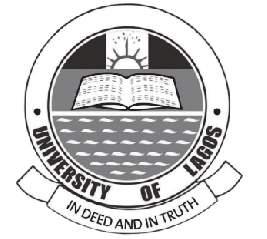
Duro Ikhazuagbe
Super Falcons goalkeeper, Chiamaka Nnadozie, has insisted that reclaiming the Women’s Africa Cup of Nations (WAFCON) title is the target for the senior Nigerian team when the tournament kicks off in July
Nine-time champions Nigeria lost the 2022 edition to hosts Morocco in heartbreaking semifinal shootouts.
Now, Nnadozie who is backto-back Africa’s best women’s goalkeeper is leading her teammates back to Morocco with a clear mission: The trophy or Nothing!
Speaking in a chat with CAFonline. com yesterday, the Paris FC Safe Hands recalled the heartbreak that the Super Eagles went through when they failed to defend the trophy.
“It was incredibly tough to accept that defeat to Morocco. We really wanted to defend our crown, but football can be like that some days, things just don’t go your way. That match against Morocco, we lost partly because the opposition had a well-executed strategy. It wasn’t that Nigeria was the weak team,” recalled Nnadozie.
However, for the next edition scheduled to kick off July 5 through July 26, 2025 Nigeria will have to battle Tunisia, Algeria, and Botswana in Group B before dreaming of taking a shot at reclaiming the title.
Asked if she considers the Group B pairing a piece of cake for the nine-time champions, she was wary and refused to see any team as minnow in African football.
“People might think it’s a manageable group, but the reality is very different. Women’s football has made huge strides in recent years. Every team is improving, working hard, and investing in development.
“We saw it in the last AFCON, where many of the favourites were shaken. No one can be underestimated anymore. This group is tricky, and we have to treat it with the seriousness it deserves. Qualification won’t be handed to us we’ll need to earn it through hard work and discipline,” Nnadozie observed with seriousness.
She insisted that the African tournament holds same weight as the World Cup in her estimation. “To me, AFCON holds the
same weight as a World Cup. The atmosphere, the stakes, the intensity it’s all there. I remember the 2022 edition in Morocco: packed
stadiums, incredible supporters. You feel lifted by an entire continent. And personally, I’ve never been the starting goalkeeper when we’ve won a title.
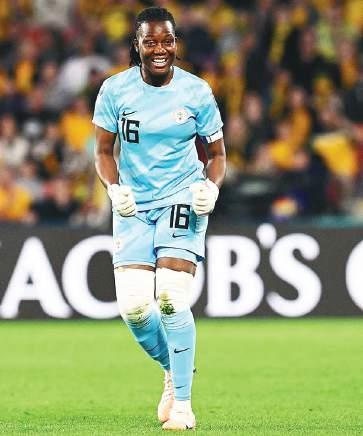
African Champion, Omolola Onome Didih of Lagos State and Rivers State’s Ruth Nyong gave standout performances on the Day 2 of the Weightlifting events of the ongoing National Sports Festival tagged the Gateway Games yesterday.
The two lifters won four gold medals and two silvers for their states in the women’s 49kg and 55kg categories respectively.
In the Women’s 49kg class, Ruth Nyong (Rivers State) won two gold and one silver medal.
She lifted 75kg to claim gold in the snatch and she got the second gold in her total lift of 167kg. Nyong originally from Akwa Ibom handed Rivers State additional silver medal with her 92kg lift in the Clean & Jerk. In the same weight class, Ebele Chukwu Vanessa Agbah of Delta State bagged a gold in the Clean & Jerk with her 93kg lift and a Silver medal with her lift of 164kg.
In the snatch, Quadri Zainab of Lagos grabbed a silver with her lift of 72kg while Adamma Dorcas Anyimba of Kano got a bronze with her lift of 71kg.
The same Anyimba also got a bronze medal with her total lift of 157kg. Monica Uweh of Ogun State finished with a bronze medal in the Clean & Jerk with her 88kg lift.
In the Women’s 55kg, African Games Gold medallist, Omolola Onome Didih of Lagos won two gold medals in the snatch and total with her lifts of 93kg and 205kg in that order. She was however beaten in the Clean & Jerk by determined Theresa Daniel Okon of Akwa Ibom State who lifted 113kg to win the gold medal. Didih finished a kilogram behind for a
silver and her third medal.
Temidayo Jegede of Kano claimed two silver and a bronze medal to add to the pyramids’ state’s medals’ haul. She lifted 77kg in the snatch and 175kg total lift for her two silver medals before her bronze in the Clean & Jerk with a lift of 98kg. Joy Chima from Lagos got the remaining two bronze medals with her lifts of 71kg and 168kg
in the snatch and total.
Meanwhile, 2023 African Games Gold medallist, King Kalu of Cross River State and Esther Amarachi
Chijoke of Invited Junior Athletes (IJA) bagged five gold medals combined for their states in the men’s 55kg.
There were other winners in the various categories. Competition continues in the sport today.
Nigeria is set to make her second appearance at the African Sambo Championships as a two-man team departs for Conakry, Guinea, on Wednesday, May 21, to compete in the 19th edition of the continental tournament organized by the African Sambo Federation. This year’s championship is particularly significant for Nigeria, marking the country’s debut in Combat Sambo—a more intense and physically demanding variant of the sport.
Representing the nation are Martin Aziba and Ramon Ibrahim, accompanied by Hammed Sheriff, Vice President of the Nigerian Sambo
Association. The team will fly via Asky Airlines through Lomé to Conakry.
Aziba will make history as the first Nigerian athlete to compete in Combat Sambo at the African Championships, contesting in the Men’s 85kg category. Ibrahim will compete in Sport Sambo (Men’s 64kg). Both athletes are also scheduled to participate in Beach Sambo, which will take place at the iconic Stade du 28 Septembre in Conakry. Ahead of the tournament, Aziba expressed optimism and pride: “We’ve been training hard to perfect our techniques and are fully focused on bringing home gold medals and
glory for Nigeria. This is a historic moment for us, and I’m proud to be the first Nigerian in Combat Sambo at this level.”
Ibrahim echoed his teammate’s confidence: “We’ve been in training for the past three months. We’re ready to give our best and make Nigeria proud.”
For Hammed Sheriff, the focus extends beyond the medals: “This is our first competition of the year, and we’re aiming to build on our past successes. At the last African Championships, we secured three golds, one silver, and one bronze. We’re confident we can match or even surpass that performance.”
This time, I want to lift that trophy from the pitch to play a real part in the victory,” stressed Nnadozie. At just 24, Nnadozie embodies the perfect balance of authority, calmness, and ambition are all the indexes needed to realise the dream of a return to the top of African Football.
In 2019, Nnadozie became the youngest goalkeeper to play at a World Cup, at just 18. Four years later, she’s captain. And that armband isn’t just symbolic. She wears it with pride and responsibility. She knows the weight of the shirt she wears; the legacy the Super Falcons have built before her. And she wants to add her own chapter to that legacy.
Flying Eagles Captain, Bameyi, Makes U20 AFCON Best XI
Flying Eagles skipper, Daniel Bameyi, has been named in the CAF U20 AFCON Best XI.
The central defender led by example as the Flying Eagles again placed third at the tournament by stopping hosts Egypt after a penalty shootout.
The Bayelsa United star was Man of the Match when the Flying Eagles held Morocco to scoreless draw in their second Group B game.
This was the second U20 AFCON for Bameyi, who also led Nigeria to finish third two years ago also in Egypt.
The CAF Best XI was dominated by players from champions South Africa as they provided four players.

Ikpeba
Two of Nigeria’s football greats, Kanu Nwankwo and Victor Ikpeba, have thrown their weight behind the ongoing transformation of the Nigerian National League (NNL), praising the quality of play and leadership at the second-tier level of the country’s club football.
Ikpeba was present at the Mobolaji Johnson Arena in Onikan, Lagos, on Sunday to witness a thrilling Match Day 15 encounter between Smart City FC and Warri Wolves, which ended in a 1–1 draw.
The result brightened the chances of Warri Wolves’ qualification for the NNL Super Eight, the final playoff round of the league.
Kanu, the Chairman of Enyimba International FC, Nigeria’s most decorated football club, on his part expressed his excitement at the level of competition and performance of teams in NNL.
“There is great hope for Nigerian football from what I am seeing
in the NNL. I have seen some of the games of the on going season. What I have seen is encouraging. These players are hungry, talented, and just need the right platform,” Kanu said.
Victor Ikpeba, 1997 CAF African Footballer of the Year, also commended the league’s progress under its current leadership.
“The standard of play is good and the league is very competitive. I look forward to attending the NNL Super Eight.”
Kanu and Ikpeba—winners of the CAF African Footballer of the Year in 1996 & 1999 and 1997 respectively—are among a growing list of ex-professionals lending support to Nigeria’s domestic football ecosystem. Their presence and endorsements are expected to boost the league’s visibility and attract further attention to grassroots and developmental football across the country.
Chairman of the Nigeria Premier Football League (NPFL), Otunba Gbenga Elegbeleye, has lauded the election of the President of Nigeria Football Federation (NFF) Alhaji Ibrahim Gusau to the leadership of the CAF West Africa Football Union(WAFU) B.
The Confederation of Africa Football (CAF) created administrative zones to decentralise its functions. The WAFU B sub-region comprises Nigeria, the Benin Republic Burkina Faso, Cote d’Ivoire, Ghana, Niger and Togo.
Elegbeleye said that Gusau’s emergence as the leader of the regional football body is a significant indication of the rising influence of Nigeria in African football administration.
“The NPFL Board receives the assumption of our Federation President, Alhaji Gusau to the leadership of the WAFU B Board and wish him and the new executives a successful tenure.
“This development is a very significant indication of the growing influence of Nigeria in football administration in the region and indeed in Africa”, Elegbeleye observed.
Gusau is the fifth Nigerian to hold a top position in the West African subregional football body. Others before him include the founding president, Joseph Kwamina Tandoh, who at the time was a vice chairman of the then Nigeria Football Association (NFA). He is the father of Dr Kweku Tandoh, the Executive Secretary of the Local Organising Committee (LOC) of the ongoing 22nd National Sports Festival in Ogun State.
The other Nigerian who had led WAFU are Jonathan Boytie Ogufere from 1988 to 1994; Abdulmumini Aminu (1999 to 2002) and Amos Adamu (2008 to 2010), under whose tenure, the hitherto 16-nation body was divided into two – WAFU A and WAFU B.
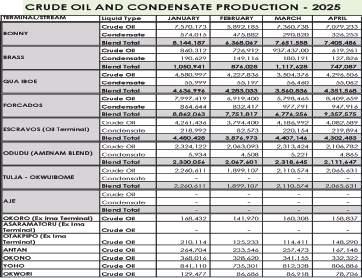
Emmanuel Addeh in Abuja
Nigeria’s crude oil production slumped by an estimated 46.4 million barrels in the first four months of 2025, spanning January to April, a development seen as a key threat to the country’s 2025 budget.
An analysis of data from the Nigerian Upstream Petroleum Regulatory Commission (NUPRC) for the four months showed that the country’s actual crude oil output was 200.8 million barrels for the period compared to a projected production of roughly 247.2 million barrels.
This represented about 18.7 per cent production deficit recorded during the period under consideration, a review of the
four-month data showed.
By the 2.06 million barrels per day oil benchmark in the 2025 budget, Nigeria’s production, including oil and condensate, from January to December, should be in the region of 61.8 million barrels every month.
However, the data from the upstream regulator indicated that in January, total production, including condensate, was 53.86 barrels; in February, it fell to 46.81 barrels ; in March crude oil produced was 49.7 million barrels, while it was 50.5 million barrels in April.
The Nigerian economy is projected to grapple with significant challenges this year, stemming from declining oil production, falling global oil prices,
and a substantial budget deficit, all of which are impacting the nation’s economic growth trajectory.
The 2025 federal budget, totaling N55 trillion, was predicated on an oil price benchmark of N75 per barrel and a daily production target of 2.06 million barrels. However, actual production has consistently fallen short, averaging around 1.6 million barrels per day in the first quarter of the year.
The shortfall, amounting to a deficit of approximately 46.4 million barrels in the first four months of this year, per THISDAY analysis, has resulted in an estimated revenue loss of $3 billion to the federal government, at an average of $65 per barrel of Brent this year, further
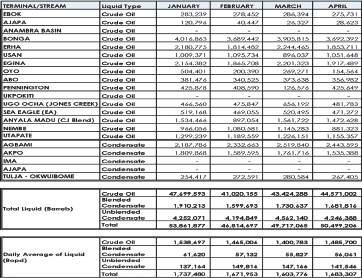
exacerbating the fiscal strain.
To ameliorate the impact of the fall in international oil prices, the Lagos Chamber of Commerce and Industry (LCCI) has recently urged the federal government to reassess the 2025 budget in light of these developments.
This recent decline is attributed to increased global oil production from non-members of the Organisation of Petroleum Exporting Countries (OPEC) countries as well as the cartel itself. Besides, there has been a slowdown in demand growth due to global economic uncertainties, including Donald Trump’s sweeping tariffs.
The information provided by the NUPRC showed that for each month,
Nigeria produced 1.737 million bpd in January; 1.671 million bpd in February; 1.603 million in March; and 1.683 million bpd in April.
Also, a breakdown showed that daily crude oil production, excluding condensate, stood at 1.53 million bpd in January; 1.46 million bpd in February; 1.4 million bpd in March and 1.48 million bpd in April.
Aside from the fall in prices, Nigeria’s crude oil production has faced significant setbacks due to a combination of oil theft, pipeline sabotage, infrastructural issues, and underinvestment, leading to substantial economic losses and environmental degradation.
In recent years, oil theft has been a major contributor to production
losses. At its peak in 2022, Nigeria was losing approximately 108,000 barrels per day to theft. However, concerted efforts by the Nigerian government and security agencies have led to a significant reduction in these losses.
For the four months under consideration, production mainly came from Bonny, which saw its output fall from 8.1 million barrels in January to 7.4 million in April; Brass output which slumped from 1 million barrels in January to 747,000 in April as well as Qua Iboe, which fell from 4.6 million to 4.3 million between January and April.
Eromosele Abiodun
African governments have been called upon to unlock the full potential of the African Continental Free Trade Area (AfCTFA) by prioritising the harmonisation of customs and trade policies, as this agreement remains pivotal to the overall economic prosperity of the continent.
The Chief Executive Officer, Lagos Free Zone, Mrs. Adesuwa Ladoja stated this during a panel

session titled, “From factory to port: Why infrastructure will drive Africa’s industrial revolution,” at the Africa CEO Forum held in Abidjan, Cote d’Ivoire.
Speaking during the session, Ladoja stressed the need for African countries to work together in aligning policies to unleash the full benefits of AfCFTA.
According to her, “The transformative power of AfCFTA lies in our ability to act collectively. Policy alignment across African states
is not optional, it is essential. We cannot afford to stay on the sidelines while the world evolves. Government leadership, in partnership with the private sector, is critical.”
She further emphasised the need for infrastructure integration, industrial policy alignment, and inclusive growth as the foundation for Africa’s economic transformation. She went further to highlight the unique advantages of the Zone’s integrated ecosystem which offers a safe and efficient

platform for global investors, citing Lekki Deep Sea Port as a major driver of Nigeria’s logistics growth.
According to her, the port features a modern container terminal, advanced ship-to-shore cranes, scanners, and other state-ofthe-art facilities operated by global partners such as CMA CGM.
“With tariff rates from Nigeria at 14% and other African countries averaging 10 per cent, there is a clear opportunity to move manufacturing hubs to Africa and
export globally at more competitive rates, what we must do now is replace friction with efficiency. As of today, Lekki Port handles about 25 per cent of all container traffic (TEUs) into Nigeria; a testament to the value we’ve built into the system. Despite global challenges like the COVID-19 pandemic and the Russia-Ukraine war, we’ve not only remained resilient but continued to thrive,” she noted.
While calling for increased collaboration between the public

and private sector, she explained that the Zone has evolved from a greenfield venture to a thriving economic ecosystem with over $2.75 in employed capital as a result of investment in infrastructure development. Commenting on the emerging global trade tensions and shifting tariff structure, she urged African governments to seize the opportunity to reposition the continent as a competitive manufacturing base.




Stories by Emmanuel Addeh
TCN said it has mobilised three separate contractors to the site, each assigned to handle the reconstruction of
The Nigerian Defence Academy (NDA) in Kaduna has commended that federal government over the commissioning of a state-ofthe-art 2.5 megawatts Hybrid Solar Power Plant and the Phase One 600-kilowatts photovoltaic solar power project.
The 2.5MW hybrid solar power plant was funded by the World Bank in conjunction with the Ministry of Power through its agency, the Rural Electrification Agency(REA), a statement by Bolaji Tunji, spokesman to the Power Minister, Adebayo Adelabu, said.
However, he added that the 600KW Solar Photovoltaic solar
power project was fully funded by the ministry of power.
The project also slashes the NDA’s reliance on the national grid by 50 per cent, ensuring uninterrupted power to energise academic excellence, military training, and daily operations, Tunji added. Expressing joy over the project, Commandant of the NDA, Maj. Gen. AK Ibrahim declared: “This project propels us to uphold our legacy as Nigeria’s crown jewel of military excellence. With pride, we celebrate President Bola Ahmed Tinubu’s visionary leadership and the federal government’s bold strides in energy security”.
Goldman Sachs analysts have revised their outlook for global oil demand upwards, now expecting growth of 600,000 barrels daily this year and 400,000 barrels daily in 2026.
The bank, however, maintained its oil price forecast at $60 per barrel of Brent crude and $56 per barrel of West Texas Intermediate for this year, Reuters reported, citing a new note.
Goldman’s analysts expect the benchmarks to fall further next year, to $56 for Brent crude and $52 for WTI. A big reason
for the bearish outlook is the nuclear deal between the U.S. and Iran that recently became a more distinct possibility than it was until now.
Last Thursday, President Donald Trump the two sides were really close to sealing such a deal. The news dealt a blow to oil prices.
Later updates, however, tamed any optimism as they revealed persistent differences between the two sides on what conditions they would accept. The U.S. side insists on Iran committing to stop any uranium enrichment activities. The Iranian side considers its uranium-enrichment activities non-negotiable, oilprice.com reported.
Group Business Editor
Eromosele abiodun
Deputy Business Editor
Chinedu Eze
Comms/e-Business Editor
Emma Okonji
Asst. Editor, Energy
Emmanuel addeh
Asst. Editor, Money Market
Nume Ekeghe
Correspondents
KayodeTokede(CapitalMarkets)
James Emejo (Finance)
Ebere Nwoji (Insurance)
Reporter Peter Uzoho (Energy)
However, the prospect of a shorter rather than longer tariff war has improved the outlook for global growth, which could offset any bearish supply effect stemming from a U.S.-Iran nuclear deal by improving demand for crude, per Goldman. This was the basis for their upward revision of demand for the second half of the year, or, as they put it, “Incorporating lower tariffs and higher GDP.”
On the other hand, if the tariff war drags on and comes to affect global economic growth in the physical world rather than the realm of forecast, the investment bank expects Brent could drop as far as $40 per barrel in late 2026. For that to happen, OPEC+ must also bring back all the barrels it cut from its combined supply back in 2022, Goldman analysts said.
Also speaking, Adelabu said: “Powering the NDA with solar energy fortifies national assets, drives education, security, and
sustainability. Under President Tinubu’s Renewed Hope Agenda, we’re lighting up Nigeria’s future—one institution at a time.”
one tower, noting that the ‘strategic deployment’ aims to accelerate the restoration process and minimize downtime on the line.
“In the meantime, efforts have been made to cushion the impact of the disruption in bulk power supply to Kaduna Distribution Company (Disco), which affects some of its customers.
“ Sokoto and Birnin Kebbi are currently receiving between 6 MW and 7 MW of bulk electricity from the Mando Transmission substation via the
132kV Mando-Zaria-FuntuaGusau-Talata Mafara-SokotoBirnin Kebbi line,” a statement from the organisation said. TCN appreciated the patience and understanding of the affected communities as contractors work assiduously with the supervising engineers to rebuild the towers and restring the 330kV transmission line.
“We regret the inconvenience caused by the tower collapse and are committed to restoring full supply as quickly as possible,” it said.
The Nigerian Upstream Petroleum Regulatory Commission (NUPRC) has congratulated Conoil Producing Limited on the successful shipment of the first cargo of the Obodo crude blend.
This development, it said, marks a significant milestone for Nigeria’s upstream sector, demonstrating the growing capacity of indigenous operators to contribute meaningfully to
national crude oil production and exports.
The introduction of the Obodo crude blend, according to the NUPRC, further diversifies Nigeria’s export portfolio and aligns with the commission’s strategic objectives to enhance production output, maximise hydrocarbon resources, and attract investment through operational efficiency and innovation.
“This achievement by Conoil, under the production sharing contract framework with the Nigerian National Petroleum Company Limited (NNPC), also reflects the positive outcomes of collaborative regulatory support, enabling indigenous players to thrive.
“As the regulator of Nigeria’s upstream petroleum industry, the NUPRC remains
committed to providing a transparent, predictable, and investment-friendly environment that encourages the development of new crude streams and ensures optimal value for the Nigerian people.
“We look forward to more milestones of this nature that advance national energy security and economic resilience,” the upstream regulator said.
The Association of Meter Manufacturers of Nigeria (AMMON), a coalition of industry leaders committed to advancing local meter manufacturing, ensuring quality standards, and supporting Nigeria’s energy sector growth, has expressed enthusiasm for President Bola Tinubu’s “Nigeria First Policy.”
According to AMMON, which represents 40 certified Local Meter Manufacturers and Assemblers (LMMAs), the policy will unlock the full potential of Nigerian industries.
In his message to President Bola Ahmed Tinubu, the President of AMMON, Durosola Omogbengun, appreciated him for the policy, which prioritises locally manufactured goods in public procurement and mandates technology transfer and capacity-building when foreign options are pursued.
He also commended the Special Adviser to the President on Energy, Mrs. Olu Verheijen, and the Minister of State for Industry, Senator Owan Enoh, for their support.
AMMON pledged to support the government’s efforts, stressing that its members have the capacity to provide and install adequate meters for all consumers.
It stated: “With the enactment of the “Nigeria First Policy” AMMON remains ready and equipped to showcase its ability to provide meter for the country with our members currently boasting a combined installed capacity of six million meters annually and holding over 250,000 compliant meters in country, ready-for immediate deployment while continuing production to meet future demand.
“Our records show that AMMON/MAP have delivered quicker and in multiples of any foreign procurement project undertaken. World Bank project delivered 75,000 meters out of 1.25million meters in 20 months while AMMON delivered 1.7million meters in 12 months of 2021. We are still able to do that if similar funded procurement is provided to AMMON.”
AMMON urged the
government to fully operationalize the “Nigeria First Policy” in the structuring Nigeria Distribution Sector Recovery Program, DISREP II and Presidential Metering Initiative, PMI, adopting National Competitive Bidding (NCB) as the default mechanism to ensure local content inclusion. This, the association argued, will prevent capital flight, stimulate job creation, and accelerate backward integration.
According to AMMON, “Nigeria’s metering industry is a cornerstone of national development, and with the right policy support, it can graduate from early-stage manufacturing to full manufacturing, thereby positioning Nigeria as a regional export hub under AfCFTA.
“Mr. President, your leadership inspires confidence and renews hope in Nigeria’s industrial future. We pledge our full cooperation and continued dedication to the success of your administration’s Renewed Hope Agenda.”
The association highlighted that there are 42 Local Meter Manufacturers in Nigeria, with a combined installed capacity of 6 million meters per annum, employing 10,000 workers directly and 30,000 indirectly.
AMMON also noted that local meter manufacturers have installed 2.6 million meters and 850,000 National Mass Metering Programme (NMMP) meters between 2020 and 2024.
It stated: “The contribution made by local meter manufacturers, especially from 2021 to 2024 was achieved at the cost of N353.7 billion (at today’s price for single & three phase meters and excluding CBN funded NMMP Project of 850,000 meters). This amount was financed by LMMA/MAPs locally.”
AMMON expressed concerns about contracts with Chinese firms, citing slow delivery and high costs. They urged the government to prioritize local manufacturing to stimulate industrial growth and job creation.

adedayo akinwale in Abuja
The South East Caucus in the House of Representatives has called for the resignation of the Registrar of the Joint Admissions and Matriculation Board (JAMB), Prof. Ishaq Oloyede,
over the alleged glitches in the conduct of the 2025 Unified Tertiary Matriculation Examination (UTME). While acknowledging Oloyede’s public admission of the failure, the caucus maintained that accountability must go beyond apologies.
It insisted his resignation would allow for a thorough, independent review of the failure and restore public confidence in the examination body.
The Leader of the Caucus, Hon. Igariwey Enwo, in a statement issued
Monday noted that the response of JAMB had been grossly inadequate.
The caucus cited poor communication, scheduling conflicts with ongoing WAEC examinations, and the short notice given for the re-sit, adding that the situation has caused
Leaders from Urhonigbe Town in Orhionmwon Local Government Area of Edo State have expressed support for the proposed Federal College of Agriculture in their community, citing its potential to boost the government’s agricultural initiatives.
The community said the college aligns with President Bola Ahmed Tinubu’s Renewed Hope Agenda, particularly programs like the Agricultural Transformation Agenda (ATA), Growth Enhancement Support Scheme (GESS), Youth Empowerment in Agriculture Programme (YEAP), and Livelihood Improvement Family Enterprises (LIFE) Programme.
The leaders added the government’s agricultural programmes connecting with rural community like Urhonigbe Town, with population of over 500,000 – the second-largest Edo-speaking tribe of Edo State, is well-positioned to provide the necessary resources and services to enhance the implementation of these programmes.
A statement issued by the delegation’s spokesman Dr. Iyobosa Uwugiaren, quoted the Head of Urhonigbe delegation, Pa Thomas Odemwingie, as stating this yesterday
while making a presentation during the public hearing on a ‘’Bill for an Act to amend the Agricultural Research Council of Nigeria Act, Cap 12, Law of the federation of Nigeria, 2004 (as amended) - to make provision for the establishment of the Federal College of Agriculture, Urhonigbe, Edo State.
The Bill is being sponsored by Hon. Billy Osawaru, representing Uhumwode/Orhionmwon Federal Constituency.
The delegation comprised Barr. Kingsley Osadolor, former editor of The Guardian; Prof. Victor Ekhator, former Dean, Department of Public Administration, University of Abuja; Dr Iyobosa Uwugiaren, Editor Nation’s Capital of ThisDay/General Secretary, Nigeria Guild of Editors; Dr Felicia Onibon, and Mr. Osaro Odemwingie, Senior Political Advisor to the Delegation of the European Union to Nigeria and the Economic Community of West African States (ECOWAS).
The community added the college will create academic and non-academic jobs for indigenes and other qualified Nigerians from Edo State and the nation at large, while equipping Nigerians
with marketable skills - from agronomy to agribusiness management.
According to the presentation, “The College will boost food security and research to enable the local adaptation of crop varieties. Sustainable practices can then be developed on-site and taken to scale across Edo State and beyond, enhancing national food security.
“The rural transformation inspired by the college will boost rural infrastructure, including housing, roads and ICT. Such uplift in the entire Urhonigbe and surrounding communities in Edo and Delta states will reduce rural urban migration.’’
Giving an overview of Urhonigbe Town, the delegation explained that the community constitutes a large percentage of the entire Orhiommwon LGA estimated to be 500,000 - being the largest community in the LGA.
The delegation added that in the late 1950s to early 1960s, Urhonigbe was the headquarters of the old Iyekeorhionmwon District Council, while its people are renowned for their warm hospitality, communal solidarity, and strong agricultural tradition, making it an ideal site for
a learning institution that interacts closely with local stakeholders.
“Covering roughly 12 square kilometres (12,000,000 m²), Urhonigbe boasts an extensive expanse of arable land. Generous tracts of this land have been identified and earmarked for both academic infrastructure and practical farm plots, ensuring students gain hands-on training on campus.
“In addition to its status as a fortress of the Benin empire, Urhonigbe is popular for its annual Ekaba festival and Izeki, a once-in-a-decade rites of passage observance.
“The community is bordered by a number of villages in Delta State and in close proximity to such places as Benin City, Asaba and Warri, which have busy airports and are therefore accessible to it in less than one hour’’, the delegation added.
unnecessary trauma for students and families.
To this end, the caucus called for the immediate cancellation of the 2025 UTME and the fixing of a new date, preferably after WAEC and NECO examinations to ensure no student is disadvantaged.
The caucus also demanded the suspension of key officials responsible for JAMB’s digital operations and logistics.
It said: “Over the past week, we have exercised restraint, hoping that JAMB would provide effective remedial measures to address what is clearly a catastrophic institutional failure - one that has severely shaken public trust and the confidence of students and their families nationwide.
“As a caucus, we are deeply concerned, as all five South Eastern states we represent were directly affected by these so-called ‘score distortions.”
The caucus reminded JAMB of its constitutional duty to guarantee equal and adequate educational opportunities for all Nigerian children - a responsibility they said had clearly been violated in this instance.
It noted: “While we acknowledge Professor Oloyede’s openness in admitting JAMB’s failures, we must state unequivocally that the remedial steps taken so far fall drastically short of our constituents’ expectations.
“JAMB’s knee-jerk, fire-brigade approach has been anything but adequate. Students in the South East - many of whom are currently writing their WAEC examinations - were given less than 48 hours’ notice to appear for the rescheduled UTME.
“Reports indicate that this notice was grossly inadequate, resulting in low turnout. In some cases, the rescheduled UTME clashed directly with ongoing WAEC papers, compounding the distress and confusion for students and their families.
“We must remind Nigerians that JAMB, as a government agency, is duty-bound to uphold the fundamental obligations of government to its citizens.
“The framers of our constitution recognised the central role of education in national development. Section 18(1) of the 1999 Constitution clearly states: ‘Government shall direct its policy towards ensuring that there are equal and adequate educational opportunities at all levels.’
“By recent judicial pronouncements, this provision now constitutes an enforceable right for every Nigerian child. Sadly, for the thousands of students across the South East, the flawed and tainted conduct of the 2025 UTME has effectively denied them that right to equal and adequate educational opportunities.”
The anti-cultism war in Edo State has gained significant traction as the Edo Civil Society Organisation has thrown its weight behind Governor Monday Okpebholo’s administration in the fight against cultism and cult-related matters.
george okoh
A leading energy company HIGHLAND ENERGY has announced plans to collaborate with the Benue State Government on the development of Compressed Natural Gas (CNG) and Liquefied Natural Gas (LNG) stations aimed at meeting the state’s growing industrial and commercial energy needs.
Speaking on the development at the Benue International Investment and Economic Summit on Sunday, the CEO of HIGHLAND LNG, Oga Adejo-Ogiri, expressed the company’s readiness to partner the government to accelerate the adoption of gas as the preferred
fuel for transportation, industry, and commerce across the state.
“Benue State’s drive to make gas the fuel of choice is not only commendable, but also presents an exciting opportunity for investment in clean, sustainable energy infrastructure,” he stated.
As part of the partnership, HIGHLAND LNG plans to site a Liquefied Compressed Natural Gas (L-CNG) station in Makurdi, the state capital, to serve the transport and industrial sectors.
The company is also exploring the possibility of establishing a CNG mother station in the state to further deepen gas penetration and support local distribution.
HIGHLAND LNG is currently developing its flagship mini-LNG plant in Ajaokuta, Kogi State, in partnership with the Nigerian National Petroleum Company Limited (NNPCL) through its subsidiary, NNPC Gas Marketing Company.
The facility which will commence operations with a capacity of 10 million standard cubic feet per day, is designed to scale based on demand and will be supplied with feedstock via the Oben-Ajaokuta gas pipeline. With Makurdi located less than 200 kilometers from Ajaokuta, HIGHLAND LNG sees a clear path to delivering consistent, trucked LNG supply to Benue State.
The group, led by its Coordinator General, Comrade Omobude Agho, staged a peaceful protest to Government House in Benin City to show solidarity with the government’s efforts.
The protesters received by the Commissioner for Information and Communication, Hon. Paul Ohonbamu, and the Chief Press Secretary to the Governor, Mr. Fred Itua, expressed their support for the government’s actions against cultism. Agho commended Governor Okpebholo for his efforts so far and expressed the group’s readiness to support the government in ensuring that cultism becomes a thing of the
past in the state.
“We are here to solidarize 100 percent and in support of Edo State government’s actions in the fight against cultism,” Agho said.
“Edo Civil Society Organization is enlightening the people on the anti-cultism law so that nobody would claim ignorance of the law.”
The Commissioner for Information and Communication, Hon. Paul Ohonbamu, thanked the group for the peaceful protest and noted it would create a platform for engagement that would lead to deliberation and solution to the issues.
“The governor wants to maintain law and order in Edo State, and to do this, certain actions need to be taken to send a signal that the governor means business,” Ohonbamu said.
Ohonbamu also expressed gratitude to the group for supporting the governor’s administration in the fight against cultism and cult-related matters.
“The governor said some of these
houses might be proceeds from fraud and evil acts, and such buildings must be demolished as some of these structures might not give peaceful repose to the conscience of society,” he said.
The Commissioner noted that Edo State and Nigeria are faced with several challenges and that it would take a bold man like Governor Okpebholo to face the challenges head-on.
“This is what the governor is doing today,” Ohonbamu said.
“Thank God for your commendation and appreciate the group for the support as the governor will know that the people are with him as he is not alone in the fight to make the state peaceful and secure for all.” Agho, on his part, urged the Edo State government to take over properties used for crimes rather than destroying them. “We all hate cultism because it’s dangerous to society and has done more damage to the youths of Edo State,” Agho said.

Alex Enumah in Abuja
The Attorney General of the Federation (AGF) and Minister of Justice, Prince Lateef Fagbemi, SAN, has withdrawn the fiat donated to Mr. Femi Falana, SAN, to prosecute the Chairman of Zinox Technologies, Mr. Leo Stan Ekeh and 12 others.
The fiat which was granted to Falana on December 20, 2023 to prosecute the alleged case of fraud against the defendants was withdrawn following request by Mr. Mathew Burkaa, SAN, counsel representing the defendants in the suit marked: FCT/HC/CR/985/2024, between FRN v. Leo Stan Ekeh and 12 others.
According to the Director of Public Prosecutions of the Federation, Mr. M. B. Abubakar, the senior lawyer had written the AGF on several occasions demanding the withdrawal of the fiat.
In a correspondence dated May 6, and addressed to Burkaa, the AGF said he took the decision to withdraw the authorization after a consideration of the senior lawyer’s request, the facts and circumstances of the case.
The letter read inter alia: “You may wish to refer to the above-mentioned subject matter and be informed that the office of the Attorney General of the Federation is in receipt of your letters dated December 24, 2024; March 27, 2025 and April 10, 2025 respectively, requesting for the withdrawal of the fiat donated to Messrs. Femi Falana SAN on December 20, 2023.
“I am to inform you that after a consideration of your request, the facts and circumstances of the case,
the Attorney General of the Federation has withdrawn the fiat donated to Messrs. Femi Falana SAN, dated December 20, 2023 vide a letter dated May 2, 2025.”
Meanwhile, the May 2, letter addressed to Falana and titled: Withdrawal of Authorization Under Section 174 of the Constitution of the Federal Republic of Nigeria, 1999 as Amended, reads: “I am directed to write in reference to the above caption and to inform you that the Honourable Attorney General of the Federation and Minister of Justice in exercise of the power conferred upon him by section 174 of the Constitution of the Federal Republic of Nigeria, 1999, as amended and section 106 of the Administration of Criminal Justice Act, 2015, has withdrawn the fiat earlier granted to you dated December 20, 2023 to prosecute the case mentioned below at the expense of the nominal complainant Mr. Joseph Benjamin: FRG V. Chris Eze Ozims and 6 others, Charge No: CR/827/2013.
“You are accordingly, requested to withdraw Charge No; FCT/ HC/CR/985/2024 between FRN v. Leo Stan Ekeh and 12 others in the interest of justice.”
However, this is not the first time the AGF is withdrawing the fiat donated to the senior lawyer and rights activist.
Recall that the former AGF and Minister of Justice, Mr. Abubakar Malami SAN, had in a letter dated October 28, 2022, withdrawn a similar fiat that was donated to Falana, upon his own application, on the same set of facts and allegations.
Based on the withdrawal, the charges filed by Falana, pursuant to the Fiat were struck out by two justices of the FCT High Court, Abuja (Honourable Justice Christopher O. Oba, and Honourable Justice Ade. S. Adepoju).
However, upon the appointment of the current AGF and Minister of Justice, Femi Falana, again applied and got a Fiat with which he filed a new case: Charge No: FCT/HC/ CR/985/2024 between FRN.v. Leo Stan and 12 others, still on the same set of facts and allegations.
But upon a further review of the file at the Ministry of Justice, the AGF and Minister of Justice came to the conclusion that “in the interest of justice” the Fiat and the Charges filed pursuant to it should be withdrawn.
Recall that this case and its adjunct suits had been dismissed three times by three different courts. The latest dismissal was on March 20, 2025 by Justice Akpan Okon Ebong of the FCT High Court who struck out the case filed by Mr. Femi Falana SAN, against the Chairman of Zinox Technologies,
Mr. Leo Stan Ekeh, and 12 others, based on the Fiat (that has now been withdrawn from him.).
The other defendants are Mr. Chris Eze Ozims, Oyebode Folashade, Charles Adigwe, Obilo Onuoha, Agartha Ukoha, Anya O. Anya, Femi Dosumu, Nnenna Kalu, Admas Digital Technologies Limited, Technology Distributions Limited and Zinox Technologies Limited.
The suit No. FCT/HC/CR/985/24 filed in November 2024 by Falana on behalf of his client, Benjamin Joseph, before the Federal High Court in
Abuja for the same alleged diversion of N162,247,513.80 being payment for laptop supply contract at FIRS Headquarters was dismissed. In the Certified True Copy of the judgment dated March 20, 2025, Justice Ebong ruled as follows: “It is my conclusion based on the foregoing that this charge (No. FCT/HC/CR/985/2024, Federal Republic of Nigeria v Leo Stan Ekeh and 12 ORS) constitutes a gross abuse of court process and is liable to dismissal. I accordingly hereby dismiss it.”
Intervention to cost over N3trillion Fixes 1,163 deplorable roads in two years, secures $22m for fibre installations
To address the growing threat to its coastal areas due to erosion, the Lagos State Government, LASG, has announced plans to deploy ground technology to battle the menace.
The Commissioner for Waterfront Infrastructure Development, Hon. Ekundayo Alebiosu, who announced this yesterday, revealed the government has embarked on a strategic working visit to the Kingdom of Netherland to explore international best practices and forge partnerships for sustainable coastal management.
In another development, LASG, through the state Infrastructure Maintenance and Regulatory Agency, (LASIMRA) disclosed it has successfully intervened on 1,163 roads, covering approximately 78.42 km across various categories between 2023 and 2025. Besides, the government also revealed it has secured foreign direct investment of $22 million to roll out quality fibre installations across the metropolis and reinforce its status as a growing digital hub.
Meanwhile, according to the state Waterfront Infrastructure Development boss, Alebiosu, a groyne is a rigid hydraulic structure built from an ocean shore or riverbank that interrupts water flow and limits the movement of sediment. The technology has been effectively used to arrest coastal erosion and stabilize beaches in several parts of
the world, including the Netherlands. His words: “Though Lagos State has already begun implementing this technology, the sheer scale of the challenge to stretch the usage along the 180km stretch of shoreline presents a significant financial burden. It costs a huge amount to construct a single groyne, and with a targeted 180km coastal stretch, the projected cost exceeds N3 trillion, a figure that makes it clear that strategic collaboration is required.
“This is not just a Lagos problem, it is a national environmental and economic challenge. If we are serious about preserving our shoreline, preventing further erosion, and protecting coastal communities, then a robust partnership with the federal government and the private sector is not just desirable, it is absolutely necessary.”
The Commissioner described
the Netherlands, renowned for its pioneering coastal engineering solutions, as a perfect case study for the state government’s delegation. The Dutch model, which integrates groynes, sand nourishment, and nature-based solutions, provided insights into how sustainable and economically viable approaches can be adapted to suit local conditions in Lagos. He emphasised that the Lagos State Government is actively pursuing a Public-Private Partnership (PPP) framework to finance and implement large-scale groyne deployment and coastal protection infrastructure.
“This initiative also aligns with Governor Babajide Sanwo-Olu administration’s broader agenda to secure lives, protect public and private assets, and unlock the economic potential of Lagos’ vast waterfronts.
The National Agency for Science and Engineering Infrastructure (NASENI) and the Presidential Implementation Committee on Technology Transfer (PICTT) said the federal government is committed to promoting female engineering by supporting women-led innovation.
Speaking at the Agency’s headquarters on Monday, May 19, 2025, during the launch of the second phase of the Developing Engineering Leaders Through Her (DELT-Her) proposal portal, the Executive Vice Chairman/CEO of NASENI, Mr. Khalil Suleiman Halilu, emphasized the goal of doubling the number of female engineers in Nigeria within five years.
He described DELT-Her as a movement encouraging women to lead, with NASENI offering
support through funding, mentorship, and exposure to global platforms.
“DELT-Her is fueling a wave of women-led solutions to Nigeria’s toughest challenges,” he said.
Citing past success stories such as AI-driven soil monitoring, drone-based security systems, and eco-friendly brake pads, he said over N70.5 million was awarded to six female engineers in the first phase in 2024 with more support planned in the second, adding that NASENI is partnering PICTT and the Czech Republic’s Technology Agency to foster a thriving innovation ecosystem for women.
Chairman of PICTT, Dr. Mohammed Dahiru, in his welcome remarks, described DELT-Her as a flagship project aimed at empowering women, breaking gender barriers, and reshap-
ing Nigeria’s technological future.
He highlighted the urgent need to raise the participation of women in engineering, where they currently make up just five per cent in Nigeria and 28 per cent globally.
According to Dr. Dahiru, the initiative will not only fund successful applicants but also provide mentorship from industry leaders to help transform ideas into viable startups.
He acknowledged the support from the Nigerian Society of Engineers and praised the success stories from the first cohort of DELT-Her recipients.
The Chairman, Senate Committee on NASENI, Sen. Francis Ezenwa Onyewuchi, in his goodwill message pledged the Senate’s continued support for women engineers and scientists.
LASG Resolves Land Dispute
Segun James
Following resolution of the decadelong land dispute at Ok in Ajah and Mayegun communities in the Lekki Penninsula of Lagos, the state government has disclosed that over 200 allotees have benefited from the resolution.
Speaking at the ministerial press briefing in Alausa on Tuesday, the Commissioner for Waterfront Infrastructure Development, Ekundayo Alebiosu, revealed the dispute which had threatened the homes and livelihoods of hundreds of residents
within state government schemes, was brought to a peaceful and lawful end through the intervention of Governor Babajide Olusola Sanwo-Olu.
According to Alebiosu, the governor’s unwavering commitment to governance with a human face was the driving force behind a groundbreaking regularisation process that spared over 200 allottees from eviction and property loss.
“What we have achieved here is a testament to Mr. Governor’s belief that governance must prioritize people, their dignity, their security, and their future. Rather than demolish homes and
uproot lives, we brought stakeholders to a roundtable and crafted a legal pathway for regularising occupancy.”
The Commissioner explained that many of the affected individuals had unknowingly encroached on government land, creating a protracted conflict over ownership.
Instead of resorting to mass demolitions, the state government, through the Ministry of Waterfront Infrastructure Development, implemented an accommodation strategy that allowed the settlers to regularise their land documents and remain legally on the property.
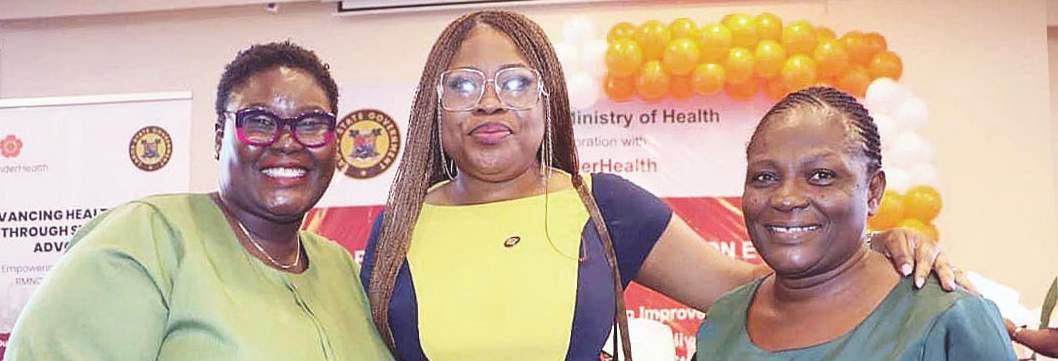
L-R: Director, Medical Services and Disease Control, Lagos State Health District 3, Dr. Adenike Oguntuase; Lagos State Permanent Secretary, Health District 3, Dr. Monsurat Adeleke; and Director, Nursing Services, Lagos State Health District 3, Mrs Christiana Akinboboye, during the flag off of the “Advocacy Solutions to Improve PHC and RMNCAH Delivery and Health Outcomes project in Lagos State” , funded by the Gates Foundation and implemented by Engender Health, held at Sheraton Hotel, Ikeja... recently
The Nigerian government has called for the accelerated implementation of the Single African Air Transport Market (SAATM) among the African countries that have signed the agreement.
Minister of Aviation and Aerospace Development, Festus Keyamo, made the call during the opening ceremony of the 18th Plenary Session of the Banjul Accord Group (BAG) of States, which began in Abuja, yesterday.
SAATM represents the vision of
achieving the African Union’s Agenda 2063 and unlocking the immense potential of seamless air connectivity across our continent.
Keyamo, in his welcome address said, “I want to highlight the urgent need to implement the SAATM for the benefit of our sub-region and the entire African continent.”
He opined that the call was critical because, despite Africa’s strong political will and numerous declarations, progress has been slow, and fragmentation remains a barrier to regional integration.
Air connectivity, he reiterated, was an asset, which improves the global competitiveness of cities, States and regions thus Africa cannot be left behind.
According to him, “it is believed that SAATM will enhance intra-African connections and make movement of passengers and cargo smooth with minimum transit points at competitive prices.
“Achieving these requires our collective resolve not only to implement SAATM, but also to make conscious efforts to address issues
of non-physical barriers, including the high cost of travel within the region” he stated.
While calling on all member state to move beyond commitments and take coordinated, deliberate steps toward making SAATM a living reality, the minister added, “Our skies must no longer be defined by closed borders, but by open opportunities.”
He acknowledged that the BAG was critical to SAATM’s implementation even as he reaffirmed Nigeria’s unwavering commitment to the BAG and to the ideals of cooperation, safety,
Michael Olugbode in Abuja
Borno State Governor, Professor Babagana Zulum, dedicated yesterday to prayer and fasting to seek heavenly intervention in efforts to foster unity, spiritual resilience, and hope among the people amid ongoing security challenges.
Zulum, who arrived Rann, headquarters of Kala Balge Local Government Area, before sunset on Sunday, spent the night coordinating support for security agencies and volunteer forces.
Kala-Balge is one of the communities in Borno State that has faced persistent security challenges from Boko Haram/ISWAP insurgents, which disrupted the daily life and peace of the people.
Zulum said the visit was part of his commitment to strengthening the people in the face of the security challenges.
He urged citizens to observe fasting and prayer exercise on Monday in a state broadcast on Saturday.
The governor stated, “In light of our current security challenges, I am calling on all residents of Borno State to unite in a collective act of faith and solidarity.
“This Monday, I am inviting you to join me in a voluntary day of fasting and prayer for peace to reign in Borno State, North-east Nigeria, and, indeed, the entire country.”
Zulum expressed appreciation to the people of Borno State and those outside the state for heeding his call
to observe fasting and prayer for the restoration of peace in the state.
He said, “Let me express my appreciation to thousands of people in Borno that have observed today’s fasting and praying for peace to reign in our state.
“People from other states and even beyond Nigeria joined in seeking divine intervention for the security challenges we are facing. We thank everyone for the solidarity.”
Meanwhile, Zulum approved 10 patrol vehicles to support the military and youth volunteers in combating the criminal activities of Boko Haram/ISWAP insurgents.
Zulum, while announcing the approval on Monday during an address to both groups separately, stated that while the volunteers, comprising
Ahmad Sorondinki in Kano
The Executive Director of Corporate Accountability and Public Participation Africa (CAPPA), Akinbode Oluwafemi, has said that non-communicable diseases (NCDs) have emerged as a significant public health challenge in Nigeria, accounting for approximately 30% of all deaths annually.
Oluwafemi, disclosed in his welcome Remarks at the Journalism Training on Sugar-Sweetened Beverages SSB) tax and Industry Monitoring held in Kano on Monday.
He said one of the critical factors contributing to the crisis was the
widespread consumption of ultraprocessed foods, largely driven by the activities of food corporations.
According to him, Nigeria is facing escalating public health crisis which has been on the rise of non-communicable diseases fueled, in part, by dietary factors such as excessive consumption of ultra-processed foods.
“The impact of these practices on Nigeria’s health landscape cannot be overstated, underscoring the urgent need for robust policies and interventions to promote healthier diets and protect the population from the harmful effects of ultra-processed
foods.”
He lamented that, “some corporations prioritize profit over public health, aggressively marketing and distributing unhealthy products that fuel the rising burden of NCDs, including diabetes, heart disease, and certain cancers.”
Oluwafemi, attributed the contributions of the ultra-processed food industry to the crisis food corporations used as a sophisticated web of marketing strategies to lure Nigerians especially children and young adults-into consuming ultra-processed foods that damage their health.
CJTF, hunters and vigilantes, would receive six Takoma/Toyota Hilux, an additional four gun-trucks would be donated to the military.
The governor rounded off the visit in Kala-Balge by distributing food items to over 10,000 families, mostly women and their vulnerable family members.
and integration.
“Let us leave this meeting with a shared determination to elevate BAG into a true model of African aviation solidarity,” he stated.
Keyamo further stated that with BAG, “a lot has been achieved for the region, including strengthening aviation safety, efficiency, and oversight across the BAG region, ensuring compliance with international best practices, and reinforcing regional collaboration in harmonising regulatory frameworks, enhancing capacity building, and improving operational standards.”
In his welcome address, Nigeria’s Director-General, Nigeria Civil Aviation Authority (NCAA), Capt. Chris Najomo said the 18th plenary session serves as an opportunity to not only reflect on our collective achievements, but also renew member country’s focus on the challenges ahead.
Najomo, listed some of the challenges to include infrastructure gaps, personnel shortages, emerging safety risks and the imperative for digital transformation in aviation.
He noted that BAG continues to serve as a beacon of sub-regional cooperation, and that it was “inspiring to witness the progress we have
made together in ensuring a safe, secure, efficient, and environmentally responsible air transport sector in line with the ‘No Country Left Behind’ initiative by ICAO.”
The DGCA noted that, “Nigeria, being a driving force in the subregional group, remains steadfast in its fervent support for the laudable objectives of BAG and is committed to playing an active and constructive role in seeing to the realisation of such air transport sector in West Africa and beyond.
“While we chart a bold path forward for BAG in particular, and Africa & global aviation in general, let us keep our eyes on the prize – a safe, secure, and unified aviation sector in West Africa.”
The Head of the BAG Secretariat Fansu Bojang, who is also the Director General of the Gambia Civil Aviation Authority (GCAA), said more needed to be done to unlock the potential of the sub-region. Also, Senate Committee Chairman on Aviation, Sen. Buhari Abdulfatai, represented by Sen. Augustine Akobundu, said the National Assembly was committed to the ideas of BAG and supports a harmonised West African aviation community.
The Nigerian Navy said it will on May 31 commission six newly acquired platforms at NNS BEECROFT, Apapa, Lagos, to strengthen maritime security in Nigeria and the Gulf of Guinea.
Addressing a press conference at the naval headquarters in Abuja to officially kick-start the Nigerian Navy’s 69th Anniversary Celebrations 2025, scheduled to hold from Friday, May 23 to Sunday, June 1, Chief of Naval Staff (CNS), Vice Admiral Emmanuel Ogalla, revealed that the new platforms included three patrol vessels and three helicopters.
Represented by Chief of Policy and Plans, Nigerian Navy, Rear Admiral Ibrahim Dewu, the CNS revealed that the three patrol vessels were codenamed “NNS SHERE, NNS FARO, and NNS IKOGOSI.”
He stated that the three helicopters, when commissioned,
would bring the total number of helicopters in the Nigerian Navy’s inventory to 14.
Ogalla stated, “In terms of fleet renewal, the Nigerian Navy has taken delivery of more platforms in support of all our maritime security operations.
“Notable amongst these are three new patrol vessels and three newly acquired helicopters, which will be commissioned during the Navy week. All three vessels are about 38 meters long with an endurance of five days.
“Two of the vessels were acquired from Singapore and one from South Korea, and they all arrived in Nigeria in December 2024. These vessels will serve as seaward defence boats within Nigeria’s littorals up to the 24 nautical mile contiguous zone and, when necessary, go beyond in hot pursuit as necessary.”
The CNS said the three patrol vessels would essentially improve the navy’s presence at sea.
He explained, “Additionally, three more Agusta Westland 109 Trekker helicopters will be commissioned, bringing the total number of helicopters in the Nigerian Navy’s inventory to 14, thus, improving our air operations exponentially.
“As you are aware, the maritime domain is common to all because maritime boundaries cannot be accurately defined like land boundaries.”
The CNS said the Nigerian Navy had staged and participated in several local and international exercises with Gulf of Guinea states and foreign partners to achieve synergy in maritime security.
Recalling the recently concluded Exercise Obangame Express 2025, which held from May 10 to 16, Ogalla stated that the exercise brought together the navies of the Gulf of Guinea states and foreign partners, including the USA, Brazil, Italy, and Spain.
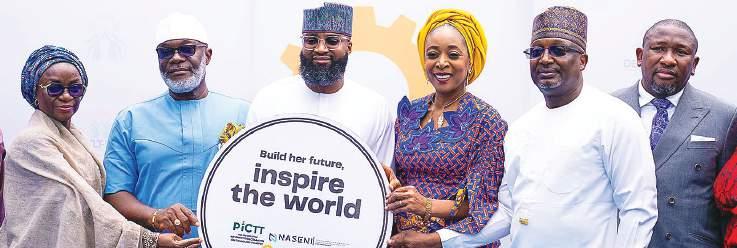
L-R: Permanent Secretary, Ministry of Women Affairs, Mrs. Maryam Chira Keshinro; Chairman, Senate Committee on NASENI, Sen. Francis Ezenwa Onyewuchi; EVC/CEO of NASENI, Mr. Khalil Suleiman Halilu; Mandate Secretary, Women Affairs Secretariat, FCTA, Dr. Adedayo Benjamins- Laniyi; Chairman of Presidential Implementation Committee on Technology Transfer, Dr. Mohammed Dahiru; and Executive Director, North and Public Sector, Fidelity Bank, Mr. Sufiyani Garba at the launch of DELT-Her proposal portal for female engineers at NASENI Headquarters, Abuja... yesterday.
Speaker of the House of Representatives, Hon. Tajudeen Abbas, said the strengthening of agricultural research
centres would unlock new insights in crop production, pest control, and climate-smart agriculture. Abbas stated this yesterday in Abuja at a one-day public hearing of the House
Francis Sardauna in Katsina
The member representing Mashi/ Dutsi Federal Constituency of Katsina State, Hon. Salisu Yusuf Majigiri, has picked a membership card of the All Progressives Congress (APC) after his official defection from the Peoples Democratic Party (PDP) to the ruling party.
Majigiri, a former longest serving Katsina PDP chairman and Chief of Staff to former Governor Ibrahim Shema, received his APC membership card at his polling unit in Majigiri electoral ward of Mashi local government area of the state. Addressing his supporters shortly after receiving his membership card, the federal lawmaker said the opposition PDP was suffering from a self-inflicted protracted leadership illness hence his decision to leave the party.
He explained that the PDP has been writhing in leadership crisis with numerous litigations at the national and state levels after the 2023 presidential primary and made it impossible for him to adequately
Police
represent his constituents.
In Katsina, he said, the party could not even participate in local government election because of irreconcilable differences that had bedeviled it and lack of coherent leadership orchestrated by some “self-fish individuals” within the party.
“PDP is suffering from protracted leadership illness both at national and state levels since after the 2023 presidential primary of the party. So, if there is no leadership, what can you do for your people?
“It’s important to put the interest of our people first, not our individual and personal interest. We need development, progress and better wellbeing of our people. So, it is better for me to join a party that is focused with direction and united.
“APC is not in court but look at our opposition parties. Most of them are in court. So, to ensure better leadership for my people, it is better for me to join APC so that I can give my contribution to the development of my constituency, Katsina state and Nigeria in general.”
Committee on Agricultural Colleges and Institutions.
He said the gathering came at a critical juncture, when Nigeria must decisively pivot towards sustainable solutions for national development, especially in the agricultural sector.
He also stated that the 11 legislative proposals currently under the scrutiny of the committee reflected a clear indication that the 10th House was resolute in its drive to actualise meaningful governance through responsive and visionary legislation.
The speaker stressed that the bills spoke to the green chamber’s collective ambition to restructure the
country’s agricultural framework through legal instruments that could effectively modernise and revitalise the sector.
Abbas stated, “It is important to emphasise that each of the proposed Bills encapsulates a forward-looking vision of agriculture as a strategic force, no longer tethered to archaic systems but poised for transformation through innovation and inclusive economic participation.
“When enacted into law, these instruments will signify Nigeria’s firm embrace of scientific methodologies, digital integration, and evidence-based policy in the pursuit
of a productive and competitive agricultural sector.”
The speaker stressed that the proposed laws, when enacted, would also signal to the country’s domestic and international stakeholders that Nigeria was ready to harness the full breadth of knowledge-based agriculture for national advancement.
Abbas pointed out that with Nigeria’s economy still grappling with the vulnerabilities of oil dependency, agriculture presented the most viable alternative to attaining broad-based economic resilience. He stated that it was within this context that the establishment and expansion of
agricultural research institutions across the country was not only necessary but also strategically urgent.
He said the passage of the bills would invigorate agricultural institutions by providing them with a robust legal and operational framework.
Abbas said, “Strengthening research centres will unlock new insights in crop production, pest control, and climate-smart agriculture. Expanding extension services will bridge the gap between research and practice, ensuring that innovations reach the grassroots.”
Linus Aleke in Abuja
Chief of Army Staff (COAS), Lieutenant-General Olufemi Oluyede, has ordered a “thorough and transparent” investigation into a recent incident in which personnel of the Nigerian Army deployed for security duties at Mgbom N’Achara Community, Ohaozara Local Government Area of Ebonyi State, allegedly assaulted a police detective monitoring a traditional leadership election in the community on May 1, 2025.
Oluyede’s order followed a viral footage of the alleged assault of the police detective circulating on
Says arrest, invitation, probe based on petition not violation of fundamental rights
Alex Enumah in Abuja
Justice Obiora Egwuatu of a Federal High Court, Abuja on Monday declared that the Nigeria Police Force has the constitutional powers to investigate credible allegations of crime made against anyone.
Justice Egwuatu upheld the powers of the court while delivering judgment in a N1 billion fundamental rights enforcement suit filed by the President of the Nigerian Baptist Convention, Rev. (Dr.) Israel Akanji. Rev. Akanji had sued the force for alleged harassment, smear campaign, and violation of his rights following a petition accusing him of forging the constitution of the
First Baptist Church, Garki, Abuja, and misappropriating church funds.
Respondents in the suit marked: FHC/ABJ/152/2025, Akanji are; Nigeria Police Force, the Inspector General of Police, senior police officers - CP Ajani Musibau Omolabi and DCP Rita Oki Oyintare - as well as the petitioner, Engineer Adekunle Mokuolu, among others.
His counsel, Ovrawah Ogaga, SAN, had sought a declaration that Akanji’s arrest and detention on June 5, 2024, by the police based on Mokuolu’s petition, were unlawful and a violation of his fundamental rights.
He also sought an injunction restraining the police from further arresting or harassing him, as well
as N1 billion in damages for alleged rights violations.
However, in his judgment, Justice Obiora Egwuatu held that the police acted within the scope of their duties and that the plaintiff failed to establish that his rights were violated.
“The police have a duty under the law to investigate any reasonable suspicion of a crime. The arrest or invitation for questioning based on a petition is not, in itself, a violation of fundamental rights,” the judge ruled.
The judge held that the request by the police, that the applicant make himself available subsequently does not violate his liberty as it is part of the investigation process.
some social media platforms.
Acting Director of Army Public Relations, Lieutenant-Colonel Appolonia Anele, in a statement, said the Nigerian Army viewed the trending footage with utmost concern, hence the investigation.
Anele stated that those investigating the alleged assault of the police officer were mandated to unravel the circumstances surrounding the presence and conduct of the military personnel at the said event. She said THIS was in line with the Nigerian Army’s commitment to
upholding the highest standards of professionalism and accountability in the discharge of its constitutional responsibilities.
The statement said, “While the investigation is still ongoing, we urge all law-abiding citizens to remain calm, as details of the investigation will be made public to ensure transparency and accountability.
“Any personnel found guilty in connection with this sad development will be duly sanctioned, in line with extant military regulations and procedures. “The Nigerian Army remains professional and solely committed to its constitutional roles, especially in aid to civil authorities when called upon. It also values the trust and cooperation of Nigerians at all times.”
The service, therefore, urged the public to continue to support the Nigerian Army as it carried out its constitutional responsibilities with integrity, professionalism, and dedication to national peace, security, and stability.
Wale igbintade
Justice Chukwujekwu Aneke of the Federal High Court,Lagos, has reserved ruling on the no-case submission filed by former Ekiti State Governor, Ayodele Fayose, in his trial over alleged money laundering and theft amounting to N6.9 billion.
The judge reserved his decision after hearing arguments from Chief Kanu Agabi, SAN, counsel to Fayose (the 1st defendant); Olalekan Ojo, SAN, representing the 2nd defendant, Spotless Investment Limited; and Rotimi Jacobs, SAN, counsel to the Economic and Financial Crimes Commission (EFCC).
Fayose and his company were re-arraigned by the EFCC on an 11-count charge of money laundering and theft allegedly committed during his tenure as governor.
The charges related to funds reportedly linked to the office of the former National Security Adviser (NSA).
Adopting the no-case submission
dated July 16, 2025, Agabi argued that the prosecution failed to establish a prima facie case against Fayose.
He noted that Abiodun Agbele, who allegedly played a central role in the transactions, was not charged alongside Fayose, weakening the EFCC case.
“With due respect, the predicate offences do not hold water. Criminal breach of trust and conspiracy are distinct offences, and no co-conspirator was charged,” Agabi submitted, urging the court to rule that Fayose had no case to answer.
Ojo, counsel to the 2nd defendant, adopted a separate no-case submission dated March 21, 2025, supported by documents filed on May 16.
He argued that key prosecution evidence was unreliable, especially the testimony of the 13th prosecution witness, former Minister of State for Defence, Senator Musiliu Obanikoro, who confirmed there was no communication between Fayose and then NSA, Col. Sambo Dasuki.
Opposing the submissions, Jacobs urged the court to dismiss them.
Adopting the prosecution’s counter-affidavit and written address dated May 8, 2025, he argued that the defence failed to justify several suspicious transactions.
Jacobs questioned why Fayose would not use his own bank account for transfers if the funds from the NSA were legitimate.
He referenced testimony from EFCC investigator Abubakar Madaki, who stated that Fayose used associates to acquire properties in Abuja, Lagos, and abroad, individuals who later denied ownership, although Fayose admitted they were his.
“If the money was clean, why not buy the properties in his name?” Jacobs asked.
He also cited Obanikoro’s testimony that Fayose requested the funds in cash and introduced Agbele to collect the money, insisting the defendant must account for these actions.
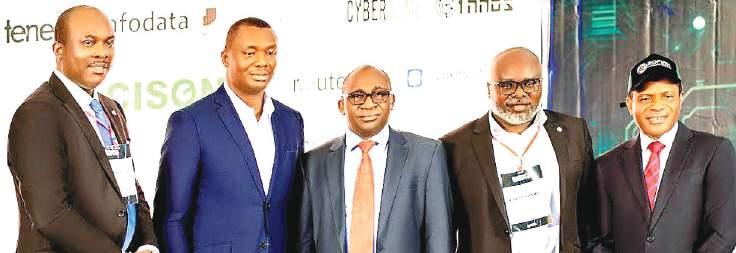
L-R: Chief Executive Officer, SMSAM System Limited, Mr Sunday MCDickson Samuel; Partner and Leader of Deloitte West Africa’s Risk Advisory business, Mr.
Security Officers of Nigeria Financial Industry (CCISONFI), Mr. Festus Amede; Group Chief Executive Officer and Co-Founder, Seamfix Limited, Mr.
Limited/Academy,
efforts in addressing nation’s challenges
Funmi Ogundare
Former Edo State governor, Senator Adams Oshiomhole, yesterday, acknowledged that Nigeria’s security situation was far from ideal, but insisted some measurable progress had been made under President Bola Tinubu’s leadership.
Also, praising Tinubu for what he described as a ‘huge’ achievement in eliminating Nigeria’s controversial dual exchange rate policy, he described it as a major step toward economic transparency and value restoration.
In an interview on AriseTV, Osh-
Citing improved coordination and access to previously unreachable areas, Oshiomhole argued that changing war theatre leadership was not inherently detrimental as being insinuated in some quarters.
iomhole addressed concerns around the country’s persistent insecurity, particularly in the North-East.
“There are places in the North-East where people can now go freely without military escorts,” he stated, crediting Tinubu’s renewed investment in the armed forces and security operations.
He emphasised that while attacks still occured, including deadly ambushes and roadside bombings, the current
government was actively addressing them.
Responding to criticism over the frequent change of military commanders, with the latest being Major General Abdul-Salam Abubakar, becoming the 15th to lead the fight against Boko Haram in 15 years, Oshiomhole argued that changing leadership was not inherently detrimental.
“If I give you an assignment and
Alex Enumah in Abuja
Justice Peter Lifu of the Federal High Court, Abuja, yesterday, dismissed a N50 billion fundamental rights enforcement suit filed by former Deputy Governor of Edo State, Philip Shaibu, against the then governor, Godwin Obaseki, and others.
Lifu dismissed the suit while ruling in an application for its withdrawal by the plaintiff’s lawyer, Anita Oteh.
At yesterday’s proceedings, Oteh informed the court that parties in the suit had settled their differences, hence, the need to withdraw the suit.
But counsel to the AttorneyGeneral of the Federation (AGF), the
reforms.
The 2025 CMC Meeting brought together a wide array of stakeholders across the financial ecosystem, including representatives from NGX, NASD, FMDQ, AFEX, CSCS, LCFE, NG Clearing, PCX, and GCMX.
There were also public sector institutions such as the Central Bank of Nigeria (CBN), Debt Management Office (DMO), Federal Inland Revenue Service (FIRS) and the Ministry of Industry, Trade and Investment.
The meeting also marked the official launch of the new SEC corporate website and the ISA 2025 Handbook.
Bagudu to World Bank: Nigeria’s Economic Reforms on Track
Minister of Budget and Economic Planning, Senator Abubakar Bagudu, yesterday said the country’s economic reforms embarked upon by the Tinubu’s administration remained on schedule, recording significant progress. Bagudu, spoke when he received the World Bank’s new Country Director for Nigeria, Mr. Matthew Verghis, who paid him a courtesy visit in Abuja.
fourth defendant in the suit, Aliyu Abdulkadir, denied any knowledge of the settlement.
“However, we are not opposed to the application for withdrawal and will also not be asking for a cost, but I will make a simple request,” Abdulkadir said.
Abdulkadir then prayed the court to dismiss the suit.
Oteh disagreed with Abdulkadir’s request, urging the court to grant their application for the withdrawal of the suit.
Lifu, in his ruling, held that, having joined issues in the matter, the proper thing was to dismiss the case.
“In view of the fact that issues have
Bagudu told the World Bank country director that ongoing reforms have continued to yield positive results.
He pointed out that some of the reforms’ encouraging outcomes were the significant rise in revenues accruing to states and local governments and the substantial debt reduction.
The minister thanked the World Bank team for supporting the reforms and welcomed the Nigeria Development Update, which was unveiled last week, as documentary evidence of the country’s positive economic progress.
He said, “Our ambition is to grow the Nigerian economy to $1 trillion, and to achieve that, we need to develop a strategy for attaining double-digit growth.”
Bagudu noted that growth remained possible through mobilising public support from the political class, labour unions, and the private sector, who have indicated broad acceptance of the reforms.
In a statement by the ministry’s Director Information and Public Relations, Mrs. Osagie Jacobs,, the minister said, “We are confident that we will stay on course.”
Earlier, Verghis, noted that India
been joined in this matter, this suit is hereby dismissed in its entirety,” he ruled.
Obaseki, Inspector-General (IG) of Police, Director, Department of State Services (DSS), AGF, and Attorney General of Edo State were first to fifth defendants, respectively, in the suit marked: FHC/ABJ/CS/914/2024, and dated July 4, 2024, but filed July 19, 2024 by Shaibu’s counsel, Egwuaba Reuben.
Among reliefs sought was an order of the court awarding the sum of N50 billion to Shaibu for aggravated and exemplary damages against the defendants to be paid jointly for the illegal and unconstitutional violation
followed a similar path in the early 90s, explaining that its tough economic decisions resulted in three decades of growth, significantly reducing poverty and leading to a general turnaround.
He expressed the World Bank team’s commitment to assist Nigeria in growing its economy by accelerating growth, encouraging job creation, promoting financial inclusion, and supporting agri-business, among other initiatives.
Before his posting to Nigeria, Verghis served as the South Asia Regional Director for Equitable Growth, Finance, and Institutions at the World Bank.
His previous assignments included Practice Manager for Macroeconomics, Trade, and Investment in East and Southern Africa and Practice Manager in East Asia, covering China, Vietnam, and the broader Southeast Asia region.
Meanwhile, the MPC will today announce the outcome of its meeting, the second in the year.
Despite the recent easing in prices, the country’s inflationary environment remained hostile, dashing hopes of a potential cut in the Monetary Policy Rate (MPR), the benchmark interest rate.
of his fundamental rights.
He also sought an order of perpetual injunction, restraining the defendants and their agents from further arresting or detaining him, repeating or continuing any act or further acts in violation of his fundamental rights on issues bordering on or connected to facts of the case without the leave of the court.
The plaintiff equally sought the sum of N100 million as the cost of filing the suit.
In his witness statement on oath, Shaibu averred that he was elected deputy governor of Edo State and his tenure was to end on November 11, 2024.
Speaking in separate interviews with THISDAY, analysts projected that the apex bank was likely to retain policy instruments at their current levels.
During its last meeting in February, the central bank retained MPR) at 27.50 per cent with the asymmetric corridor of +500/-100 basis points around the MPR.
The apex bank, also left all monetary policy tools unchanged including the Cash Reserve Ratio (CRR) of Deposit Money Banks (DMBs) at 50 per cent, and that of Merchant Banks at 16 per cent as well as the Liquidity Ratio (LR) at 30 per cent.
Nigeria’s Professor of Capital Market, Prof. Uche Uwaleke, said, “I expect the MPC to hold policy rates against the backdrop of moderating Inflation and relative stability in exchange rate.”
Also, Managing Director/Chief Executive, SD&D Capital Management Limited, Mr. Idakolo Gbolade, the easing in inflation was a positive trend that could “influence the decision of the MPC to probably hold rates as it seems the CBN policy is effective and further tightening might bring inflation further down.”
you’re not delivering, I will keep changing until I get it right,” he said.
He dismissed suggestions that the turnover of commanders reflected poor strategy or instability, saying the focus should instead be on results and the president’s willingness to act decisively.
“It shows the president’s eyes are on the job,” he added.
While defending the government’s efforts, Oshiomhole acknowledged the enduring challenges and urged Nigerians and the media to recognise the efforts of security forces rather than
It added: “The CBN wishes to categorically reassure the public, depositors, and stakeholders that the Nigerian banking sector remains resilient, safe, and sound. Like all other regulated institutions, the institution referenced in these reports is held to stringent regulatory requirements, and there is no cause for concern regarding the safety of depositors’ funds.”
The central bank affirmed that it continues to monitor all financial institutions under its regulatory purview and maintains robust frameworks for early warning signals and risk-based supervision.
“These mechanisms ensure that any emerging issues are promptly addressed to protect the integrity of the financial system. We urge the public to disregard sensational or unverified claims and rely solely on official channels for information about the financial system.
“The CBN remains dedicated to fostering a secure banking environment where depositors can be fully confident in the safety of their funds. It will continue to monitor and adapt strategies to safeguard the financial interests of all Nigerians and stakeholders in our financial system,” it added.
However, in a separate statement made available to THISDAY, the bank further emphasised that the court did not at any time award the amount that was reported by some online media, adding that the amount could only be determined at the end of proceedings.
“The bank is a solid financial institution capable of paying its proper and lawful debt as may be determined by the Court at any point in time,” it added.
The stock price of Fidelity Bank yesterday, dropped by 3.8 per cent or N0.80 per share to close at N20 per
criticise them unfairly.
“We must salute the effort of the armed forces. You don’t dismiss them as if they are doing nothing.”
Making specific reference to the recent attacks in Borno and Yobe States, which have raised fresh alarms about the resilience of insurgent groups and the vulnerability of military infrastructure, Oshiomhole insisted that, “No one is more concerned about finding a lasting, sustainable solution to the problem of insecurity than the President himself.”
share from N20.80 per share the stock closed for trading last Friday. The lender’s stock reached N21 per share last week, amid declaring impressive first quarter ended March 31, 2025, results to the investing public. Fidelity Bank Plc has demonstrated remarkable financial resilience, solidifying its position as one of Nigeria’s leading financial institutions. Recent reports highlight the bank’s impressive growth trajectory, including its re-entry into the N1 trillion market capitalisation club and a 167.8 percent increase in profit before tax (PBT) to N105.8 billion in the first quarter of 2025.
Fidelity Bank also recorded a 64.2 percent year-on-year increase in gross earnings to N315.4 billion in Q1 2025. The bank’s total deposits surged to N6.6 trillion, driven by a 21.4 percent increase in foreign currency deposits in the review period. These figures highlighted its ability to attract and retain capital, ensuring liquidity and operational efficiency.
The board and management of the bank recently indicated that they aim to conclude the final phase of its recapitalisation programme this year, ahead of the 2026 deadline set by the Central Bank of Nigeria (CBN).
Addressing shareholders at the annual general meeting of the bank, Chairman, Fidelity Bank Plc, Mr. Mustafa Chike-Obi, had said the bank’s stakeholders were all pleased with the success of the first stage of the capital-raise exercise.
“The oversubscription of 237.9 per cent in the public offer and 137.7 per cent in the rights issue is a testament to the strength of our brand and the confidence the investing public has in us. Equipped with this vote of trust, we will proceed swiftly and conclude the second tier of our capital-raise exercise,” Chike-Obi had said.

TUESDAY

There is a surge in insurgency in Nigeria. There is a ferocious return and dominance of the Boko Haram, the terror group in Nigeria linked with Al Qaeda and ISIS at various times, but which has now become so domesticated that the Nigerian government proves helpless to fulfill its obligations to the Nigerian people under Section 14(2) of the !999 Constitution. The primary duty of the government is to ensure the security and welfare of the people. In April, Professor Babagana Zulum, Governor of Borno State cried out that the federal Government was not serving this purpose whereas he as a sub-national leader was doing everything to liaise with the Federal Government to secure peace in Borno State and the North East. Babagana Zulum is a member of the ruling All Progressives Congress (APC). What was meant as a honest confrontation within the APC family soon turned into an occasion for verbal conflict. The Minister of Information, Mohammed Idris more or less told Zulum to keep quiet. Idris would later walk back his original statement blaming it on fake news, again confirming how so conveniently politicians readily blame the media for their own omissions and commissions, even if it is true that fake news and charlatanism represent the scourge of the age. On the issue of insecurity in the North East, other people contributed to the debate, including members of the National Assembly who decried killings, kidnapping, community displacement, armed robbery, disempowerment of persons, internal refugee crisis, and the general descent into a state of anomie, to varying degrees in Borno, Yobe and Gombe states. Borno would seem to be the most affected of the states. The situation in Borno state has worsened since Professor Zulum raised the alarm in April.
It is worth noting that the Borno State Governor had to raise an urgent appeal for help over the weekend. In an official statement, the State Governor lamented that Marte Local Government Area was about to fall completely into the hands of Boko Haram. Out of about 300 towns and villages in the LGA, the only community still standing is Marte. Over 20, 000 residents had already fled to Dikwa, so concerned was the Governor that he had to sleep in Marte with the help of the military. Now he begs the Federal Government to come to the rescue. Zulum may well feel vindicated that what he had forewarned in April, as the man on the ground in Borno state has now come to pass. But he is not triumphant about that, rather he has taken his matter to God, by declaring Monday, May 19, a day of prayers and fasting in Borno State. This is typically Nigerian and hypocritical. When Nigerian leaders fail in discharging their responsibilities, they blame God. When they fail to arrive at a needed understanding of situations, they ask God to collect the baton, and run the race. Please, is it the fasting and the praying in Borno state yesterday that would drive away the insurgents? Religion has become the deus ex machina for Nigerian problems and the failure of leadership. We must stop blaming God. Professor Zulum labelled the day, a day of voluntary praying and fasting, to seek “guidance, healing and peace for our state”. He adds: “Through prayer and reflection, we can strengthen our unity,
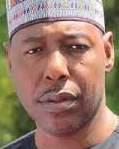
our resilience, and restore our collective purpose.” Prayers alone cannot do it. Persons of faith would be quick to quote Christian Bible passages such as Matthew 7: 7 -11, Mark 11:24, Philippians 4:6, Matthew 21: 22, Matthew 6: 9-13, James 5: 15-16, 1 Chronicles 16:11 in affirmation of the power of prayers. Similarly, the Islamic faith emphasizes the salah or salat, an act of worship that brings man in closer contact and communication with God through prayers as in Surah Baqarah 2:45, 2:110, 2:238, and Surah Hud, 13:22. The most annoying fact of the Nigerian reality is that Nigerian leaders remember religious teachings only when they are overwhelmed. It would be difficult to know the number of volunteers who heeded Zulum’s call for fasting and praying, but we can hazard a guess that the people of Borno State who have been killed, maimed, displaced in Marte, Pulka, Gwoza, Nguro Soye and uprooted in all the 27 Local Government Areas of the state, unable to go to the farm, market or schools would readily confess that they have prayed long enough, over the past 17 years. The problem is not with God, it is with the Nigerian government. Government is the people’s god. And the problem is not restricted to the North East. The North West is also insecure. The Middle Belt has become a killing field. Life is short, nasty and brutish in other parts of the country. Nobody should be surprised if there are reports of violent attacks in the North East before this week runs out: the criminals riding roughshod over Nigeria have a way with morbid humour. They may be tempted to respond to prayers offered in their own way. They have turned themselves into tin-gods. While the people are praying and fasting, and Governor Zulum continues to whip up sentiments of faith, the criminals are probably busy working on strategies to overrun the whole of Borno and Yobe States. Successive Nigerian governments have continued to live in denial. Alhaji Lai Mohammed, President Muhammadu Buhari’s Minister of Information told us
that Boko Haram had been “technically decimated”, government was winning the war, and that Boko Haram has “no caliphate” anywhere in Nigeria. As recently as April 2025, Alhaji Mohammed at a Spokespersons Summit was busy boasting that he changed the narrative about the Boko Haram over-running local governments in Borno state. Which narrative? Has he heard Zulum’s latest cry for help? It is easy to build castles with spittle, until morning dewdrops collapse the entire structure. But it is all in the line of business for Nigerian leaders to lie to the people and deceive them. Why has the Nigerian government failed to secure the land? The same approach has been adopted over the years: security architecture, increased funding for the military, operation this, operation that, kinetic, non-kinetic, revision of national security strategy, statements of assurance, and yet when each tragedy occurs, government issues apologies, and statements of condolence, but the situation remains the same. Obviously, the security of government officials is more important than that of the people. As 2027 approaches, the politicians will feed the people with hope and expectations once again, but the impediments will remain.
The latest in the government’s bag of promises is the report that President Bola Ahmed Tinubu has approved the establishment of forest guards to secure about 1, 129 forests in the country. The National Security Adviser (NSA) and the Ministry of Environment have been directed to ensure full implementation. The plan is to recruit 130, 000 armed operatives, about 2,000, or 5,000 per state depending on carrying capacity and together, the states and the Federal Government can secure our forests. The forests have been the main base of insecurity in Nigeria be it the notorious Sambisa Forest, the Old Oyo National Park, Kainji National Park or the many ungoverned spaces in Niger, Benue, Kwara and other parts of the country. The Nigerian Forest Security Service (Establishment) Bill, 2025 is meant to flush out terrorists, bandits and other criminal gangs and enable the country to take back its forests. The intention sounds noble, jobs will be created for many Nigerians, but the true test is to be seen in the implementation. The proposal raises more questions than answers.
To start with, the idea of forest guards is not new. Nigeria has always had a Hunters and Forest Security Service (NHFSS), which was eventually renamed Nigerian Forest Security Service (NFSS) in 2024. Originally set up to protect the country’s forests, wildlife and natural resources, its role was soon expanded to include security to check the menace of criminals who use the forests as hideouts for insurgency, kidnapping, and banditry. How would the proposed establishment of Forest Guards be different from the existing NFSS. Ambassador Dr. Wole Joshua Osatimehin who is the current Commander General of the Nigeria Forest Security Service has since issued a statement praising President Tinubu for the establishment of Forest Guards. The same Osatimehin reports that “we are fully on ground in 36 states of the Federation and the 774 Local Government Areas nationwide and our officers and men have been professionally trained by the Nigeria Police, the DSS, Nigeria Army, NSCDC and other formal security agencies within and outside the country…” If this is truly the case, why the need for a new structure
and outfit? It will be recalled that late Arakunrin Rotimi Akeredolu as Governor of Ondo State had repeatedly called on the Forest Guards, this same NFSS to secure the forest reserves in Ondo state. I am therefore surprised that some commentators have praised President Tinubu’s establishment of what may look like a parallel outfit. If the existing NFSS does not work, what is the guarantee that a new creation would be able to do the job? The best way to secure Nigeria is not by creating new outfits, it is by strengthening existing structures. Nigeria’s borders are known to be porous. It is widely believed that most of the criminals wreaking havoc in the country are not only home-grown, they also infiltrate the country from the Sahel region. Our borders are so porous any bandit from Niger or Chad can just walk across, or rather ride on the back of a motorcycle into Nigeria, do maximum damage and then vanish across the border. Recruiting 130, 000 forest guards cannot deal with the enormity and complexity of the problem. Rather than create a new outfit, the military can be better equipped to form a special unit whose task will be to comb the forests and flush out all the criminal elements hiding therein. What are the policemen doing? They appear to be underworked. The police force can be expanded and all the pot-belied officers extorting money on the roads can be deployed into the country’s forests to hunt down the insurgents. The NFSS can be expanded too, and its new recruits made to live permanently in the forests, and lay ambush for criminals. The Federal Government cannot keep creating new agencies or new bureaucracies having promised, before now, to implement the Oronsaye Report and run a lean, efficient government.
The security of lives and property is far too important to be left at the level of rhetoric. Government officials have spoken more than enough about the problem, they need to apply concrete solutions. By now Nigerians must be tired of hearing fanciful phrases and expressions of good faith. Or that an MOU has been signed with China to supply military equipment, or that DICON has engaged some contractors, or that a certain fund has been specially set aside. The ineffectuality of these measures explains why there is now an increasing call for self-defence by victims of insurgency and banditry. A resort to self-help can only breed anarchy. It would be a rejection of the state, a vote of no confidence in those who run it. When every Nigerian has to protect himself or herself, because the state has failed, that would be the final violation of the contract with the people. As it is, Nigerians have to worry about electricity, security in their homes, and safety at work and on the streets. Many of the people who travel abroad do so just to get away from it all, this life of strife and perpetual anxiety that the average Nigerian is saddled with. They do not necessarily do well abroad, but there are many who get lucky, and there are others who are just happy to live in an organized society where they can gain access to basic amenities of decent living. Forest guards cannot reassure such persons that Nigeria will become a safe place to live in. Just in case the diversionary talk about forest guards is an excuse to avoid the bigger subject of state police, we miss the point. The best legacy that President Tinubu can construct on all fronts is to make Nigeria better, safer and more enabling than he met it.